







The
The
Want
At omic Mass Games shar e their
An
What
RPGs
We
Co-founder of Modiphius shar es how cooperative games have shaped the
Have you played the mos t competitive game no one ’ s hear d of ?
Don’t let a painting r equir ement put you off ent ering a t ournament – her e ar e our tips t o make it easier
Competitions in number s
When games go mega, what happens?
All of the exciting features you expec t, plus a few extras - find out more about the world of t ablet op gaming
50 TABLE TOP GLOSSARY
What ar e Gat eway Games? 51 ON THE CARDS
The lat es t in the trading car d world
Look ing for fun for ever yone? Her e ’ s wher e t o s t ar t
56 LET’S GO! TO JAPAN 57 INGENIOUS
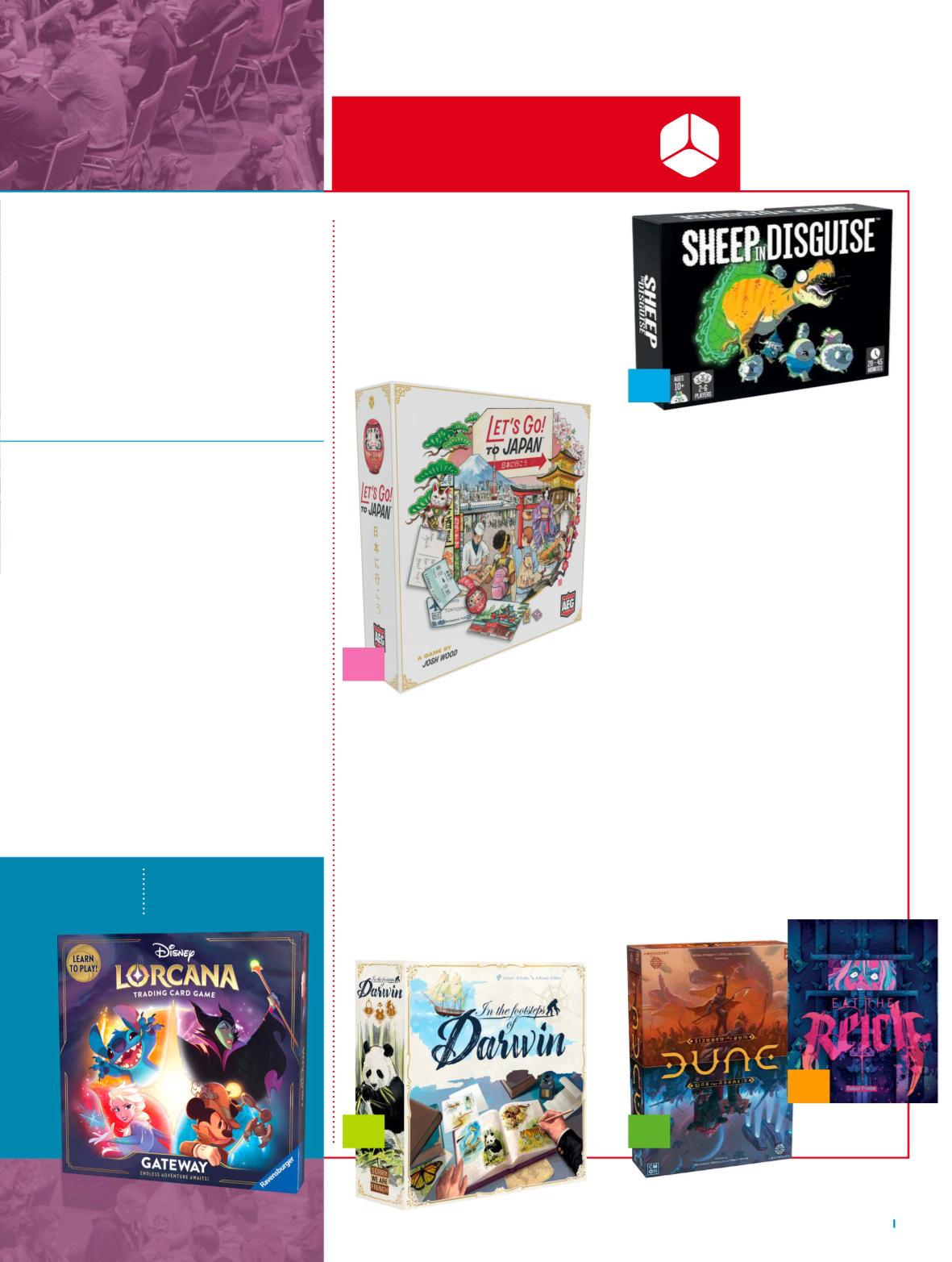
This month, we ’ r e in L at
The older games you shouldn’t overlook! 82
What is Pluck the O wl?
Looking for games that offer depth and challenge? Form a plan from here
59 TAMASHII: CHRONICLE OF ASCEND
60 IN THE FOOTSTEPS OF DARWIN
61 JORAKU DELUXE EDITION
62 MA XIMUM APOCALYPSE: 2ND EDITION
63 HE ALTHY HE ART HOSPITAL: 3RD EDITION
64 SHIPWRIGHTS OF THE NORTH SE A: REDUX
Be drawn t o the lat es t car d games for your consideration
66 BL ADES & ROSE
67 SHEEP IN DISGUISE
68 LOTUS
Want t o walk in someone else’s shoes? Bewar e, ther e may be dragons
70 E AT THE REICH
71 GIRL BY MOONLIGHT
72 VAMPIRE: THE MASQUERADE PL AYERS GUIDE
73 DUNE: FALL OF THE IMPERIUM
WARGAMES & MINIATURES
Fr om small conflic t s t o all-out war, find out about the lat es t t ablet op tussles with plas tic combat ant s
75 VIJAYANAGARA
76 DUNE: WAR FOR ARRAKIS
78 REBEL FURY
79 OT TOMAN SUNSET: 3RD EDITION
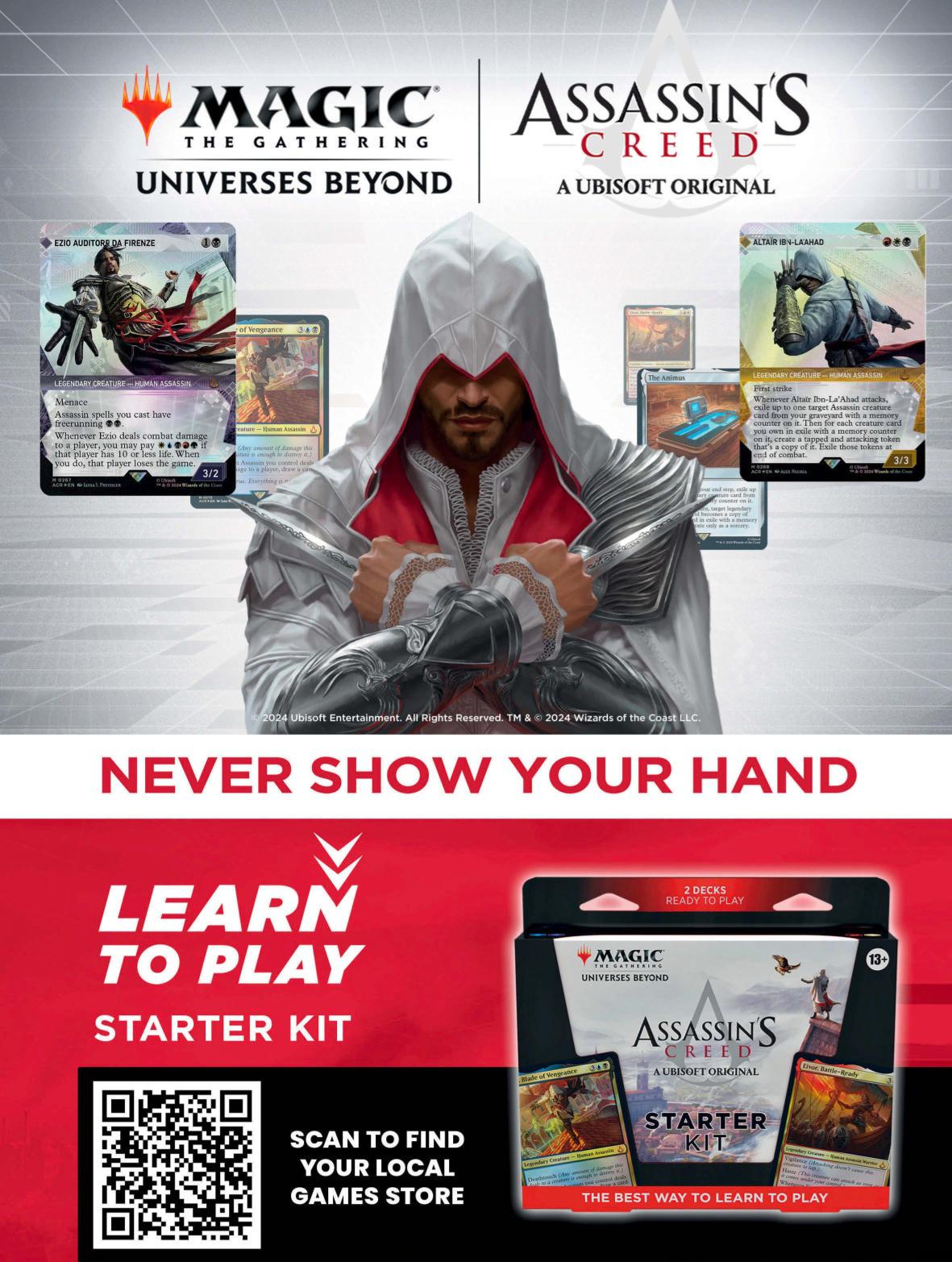
EDITORIAL
EDITOR
Charlie Pet tit
charlie pet tit@warner sgroup co uk
CONTRIBUTORS
Rob Burman, George Chrysostomou, Mae Funnell, Emma Garrett, Ross Gilbert, Chris Lowry, Chris Marling, Arlie Pallant, David Parlett, Adam Richards, Alexandra Sonechkina, Chad Wilkinson, Dan York
DESIGN
Mike Carr
COVER IMAGE
Star WarsTM: Unlimited
ADVERTISING
TO ADVERTISE PLE ASE CONTACT
COMMERCIAL MANAGER
Alex Lyon 01778 391 129 alex lyon@warner sgroup co uk
PRODUCTION MANAGER
Kay Cot terill 01778 395065 k cot terill@warner sgroup co uk
MARKETING
MARKE TING MANAGER
Sophie Thornton 01778 395 085 sophie thornton@warner sgroup co uk
MARKE TING E XECUTIVE
Charlotte Bamford 01778 395 081 charlot te bamford@warner sgroup co uk
PUBLISHED BY PUBLISHER
Claire Ingram
claire ingram@warner sgroup co uk
Warners Group Publications PLC
The Maltings, Wes t Str eet , Bourne, Lincolnshir e, PE10 9PH 01778 391 000 warner sgroup co uk
NEWSTRADE DISTRIBUTION
Warners Group Publications PLC 01778 391 150
PRINTING

Per haps it ’ s t he Ol ympic s t ha t has us t hink ing about compe t it ion, but wha t e ver t he r eason, we ’ v e been di v ing int o ever yt hing compe t it i ve (or t he opposit e and why!) t his is sue Fr om t he new St ar War s: Unlimited se t and way s t o play, t o t he Wor ld Ser ies of Boar d Gaming w it h a huge c ash pr ize in Vegas, it ’ s been a f un exper ience We’ v e spoken t o t hose who f avour cooper a t i v e games ins t ead of compe t it ions, t hose mak ing compe t it ions les s compe t it i v e, and so much mor e!
Plus as al way s, we ’ v e go t some f un adjacent and r egular f ea t ur es – fr om a look a t Megagames, t o t he upcoming Disney Lorcana se t (mor e on t ha t in t he next is sue!), and our gr ea t s t ack of r e v iew s, consis t ing of T HREE mus t -play games.
We’ v e go t some excit ing plans on t he hor izon t oo, so s t ay t uned f or mor e gaming gr ea t nes s!
tabletopgaming.co.uk
tabletopmag
tabletopgamingmagazine
tabletop gaming magazine
tabletopgamingmag
Miniat ur es games ar e t ypicall y t wo people t hat go t o play a game and one walk s away happy
Charlie Pettit Edit or
Cooperative games at Modiphius, p38
T he onl y pr essur e was t o jus t play. Play as many games as you want and play in t he event s t hat you want and you ’ r e no t going t o ge t locked out of anyt hing.
If t hey ’ r e good at t hat , t her e ’ s no r eason why you shouldn’ t consider compe t ing on a higher level t han jus t w it h your fr iends and famil y
Picture the scene It’s UK Games Expo, and the halls are jam packed with gaming enthusiasts. It’s Hall One, and you stumble across the huge demo area run by Asmodee before you head up the stairs. There are games set up, people are mid way through playing the likes of Star Wars : Shatterpoint, but table upon table are filled with people playing Star Wars : Unlimited That’s where we found John Leo, game designer at for Star Wars : Unlimited, and we couldn’t resist asking a few questions about what to expect from the new set…
We began with a Spark of Rebellion, championing the likes of Darth Vader, Luke, Hans Solo, and Leia, the key figures of the original Galactic Civil War Era, and we ’ ve just seen the release of Shadows of the Galaxy, focussing on the seedy Outer Rim that we ’ re more recently familiar with through The Mandalorian series
“Shadows of the Galaxy, [is] a really, really fun set.” Leo says enthusiastically. “Set one, Spark of Rebellion, covers mostly the Empire versus the Rebel Alliance We see in that set elements from other corners of the Star Wars Galaxy, so we see Mace Windu representing the Clone Wars era and so on Then set two is really digging into the Galactic Under world, the underbelly. So we see a lot of bounty hunters, we see smugglers” It’s the same area that The Mandalorian tapped into so well, and that The Acolyte is investigating now.
“That element is so rich, and when you think Star Wars, that’s one of the corners that you think about. So it was really important that we bring that element in, early in the game placement, because for some people that is
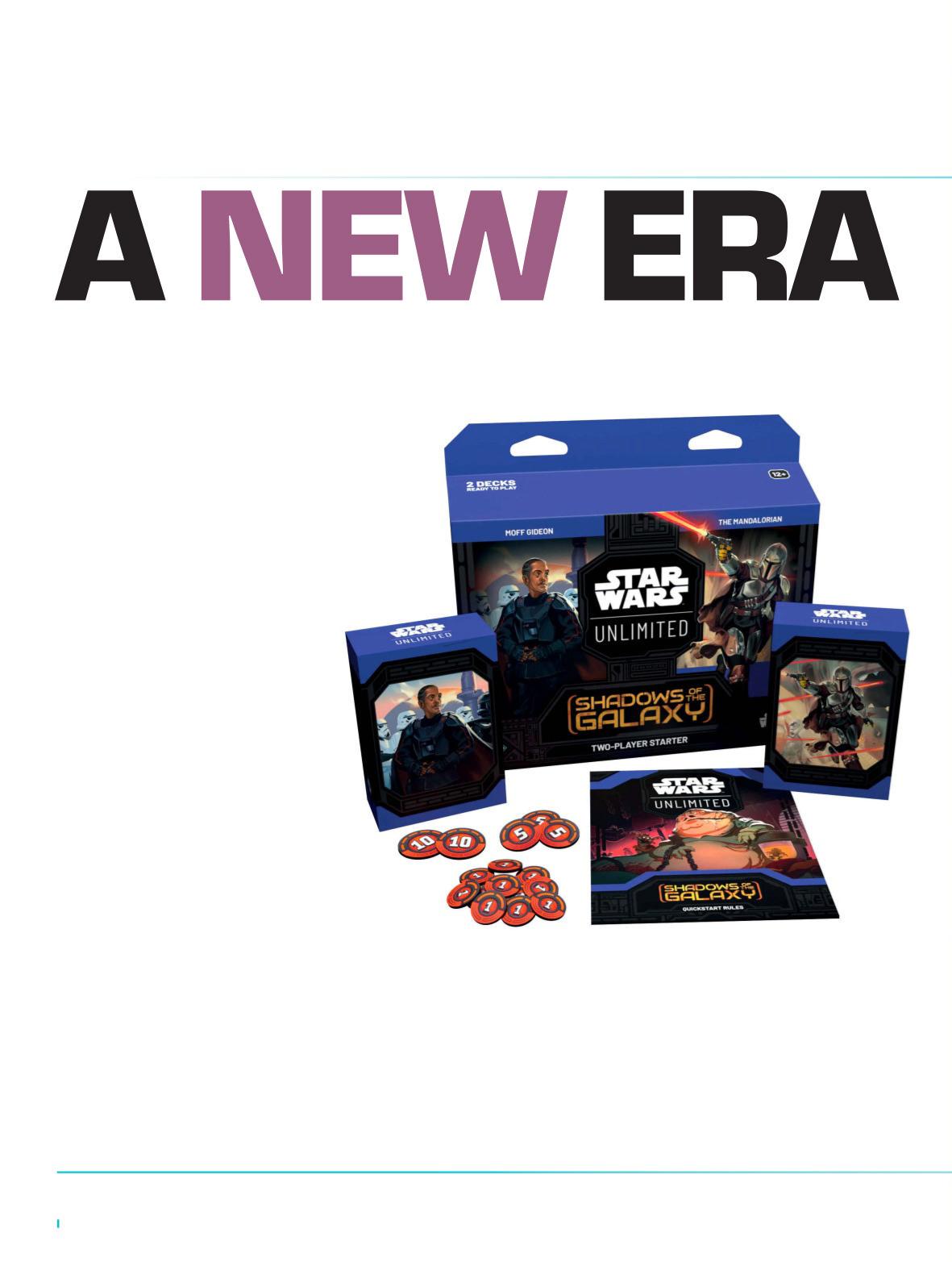
Star Wars. So, we have new mechanics that are being introduced to add to that feel. We have a new keyword called Smuggle which is a way to let you play cards from your resource row that you ’ ve stashed earlier in the game and it produces a great incremental value for you We have a new mechanic called Bounty, which is exactly what you would hope for in a set called Shadows of the Galaxy, right? Where you can declare a bounty on an enemy unit and then pursue them, and you get a reward when you defeat them or capture them. We have Capture as a new mechanic, which is way of removing an enemy unit from play that’s
not the same as defeating them.” Capture lets you put the captured card facedown beneath the capturer, where they remain until either defeated, or rescued The Mandalorian’s Rifle Upgrade is an example of this – if attached to the Mandalorian, he can then capture and exhausted enemy nonleader unit
“The team worked really hard in order to make sure that it feels like you ’ re doing that smuggle thing It feels like you ’ re doing that bounty thing. And that you ’ re setting these goals for yourself and your game plan And then achieving them? It feels really good ”
Gaining three big mechanics seems a lot, and whilst each of them work thematically, we ask why so many were included this time around, and whether we should be expecting this from ever y set moving for ward
“I think it was important for this set specifically because Set One is sort of establishing the foundation of the game ” Leo explains. “So Set Two is sort of iterating on that foundation and introducing new mechanics I wouldn’t say that ever y set coming for ward will have three new mechanics. I would say you should expect a few, but it’s not always going to be three ”
“We don’t want to fundamentally change the game with ever y set. We want to change the texture of the game, but not the foundation The foundation that you experience in Set One is the game. In fact, I have a little printout that I think is a quote from Danny Schaefer, our lead designer It’s ‘Set One is Star Wars : Unlimited’. And I think that is sort of a good philosophy Set One is such a great fundament for this game and it works so well. There’s a reason the game has been so successful So making sure we understand what works and not changing things just for changing them [is key]. When we add things, we want them to feel like they’re there for a reason So that’s what it took to get bounties and smuggling in”
“What we ’ ve seen with set one has been such a robust metagame It’s been really, really amazing. We’ve seen a huge variety of decks take down tournaments and to top eight in tournaments You know, at the ver y beginning we saw ver y aggressive decks taking over and then we had a great arc, like a proliferation of Boba Fett decks that preyed upon the Sabine Wren decklists. And then, you know, there was a cr y across the community, the meta is solved And then two weeks later, we saw the emergence of really powerful control decks that reacted to the Boba Fett decks ” We agree, as the first launch celebration event in the UK in Twickenham saw a top eight entirely dominated by Boba Fett Leader Decks.
“I think the Set One team did an amazing job of creating a metagame that is really adaptive. So the control decks are having a moment right now, and I expect the next evolution of the Set One meta to be an over the top control deck and a really low to the ground aggro deck Those are sort of the forks in the road that might be taken right now ” Leo is quick to say he’s a designer and not a pro player, so he can’t say for sure how the meta will change, but that it certainly will
“I’m so excited for Set Two to arrive and shake up the meta. A bunch of different deck archetypes are getting new tools My favourite deck is Emperor Palpatine with Vigilance That
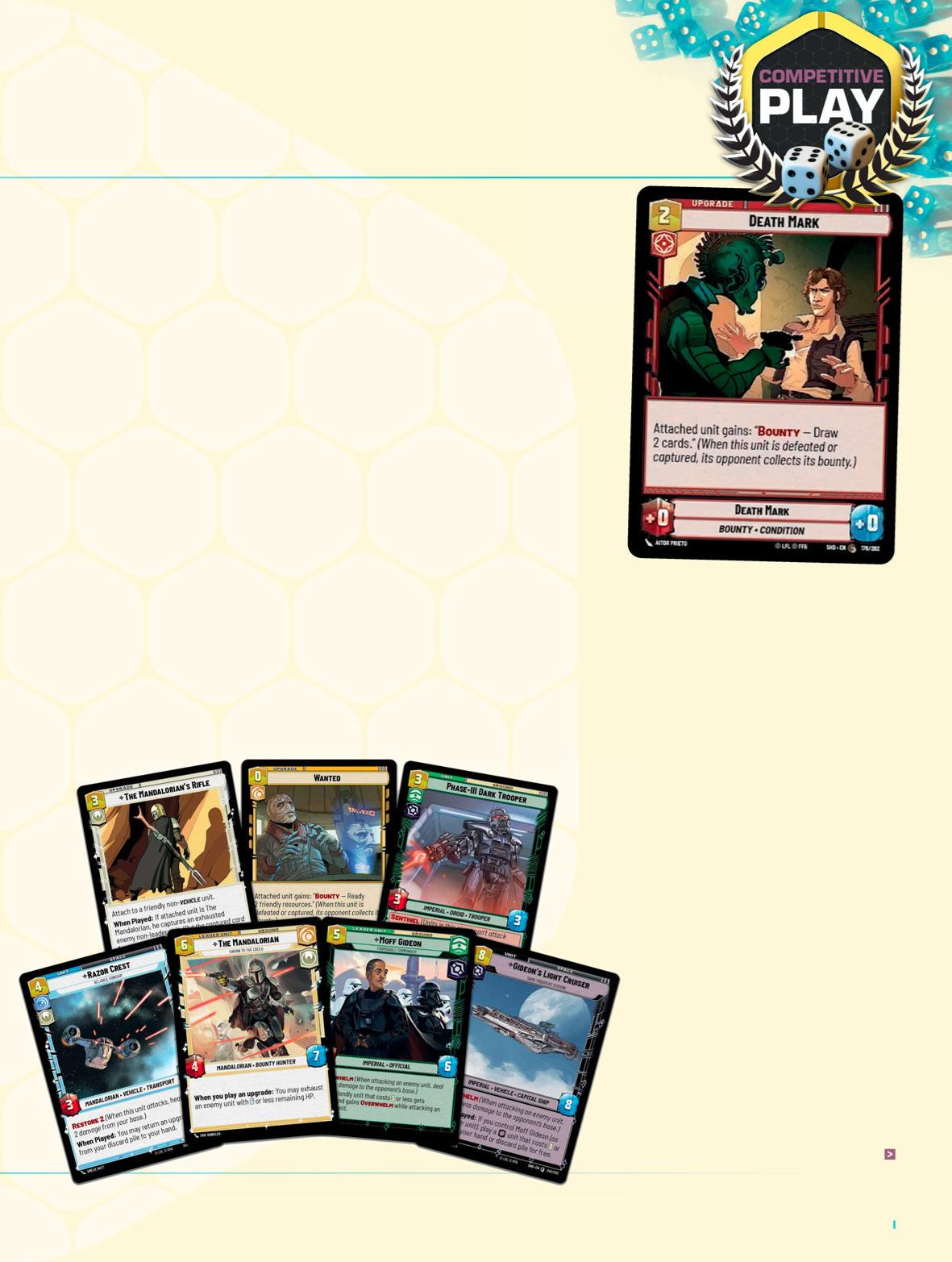
deck gets some amazing tools with like the Bounty Card Top Target, for example, or the Pyke Sentinel Unit Just like very good sort of basic fundamental cards that bolster the control or defence strategy But also, Agro is getting new tools Also, one thing that’s really special about this game is that a new leader design can take the game in a whole new direction and create a whole new deck archetype So we recently previewed the Kylo Ren leader, who likes to discard his hand for short-term effects And that’s a favourite card around the office And it leads to sort of a totally new axis of gameplay and deck building strategy. So I’m really excited to see where Set Two takes things and how all these new options can sort of create these branching pathways.”
With any trading card game, a vast chunk of the experience is playing with others Will my deck be as competitive as yours? Am I struggling to get the cards I need? Can I be defeated if the other player has a certain combination? The best way to find out is to take part in organised play, which is, as in the name, more formalised opportunites to play with others.
“Organized play is absolutely an element that’s core to the vision from the get-go,” Leo confirms. “Whether that’s your casual play at your local game store or big competitive tournaments, that’s all stuff that we want to support and it’s yet again another way for a certain kind of player to get into the game And it’s a pathway for ward for people who, you
know, they get into the game, they like it, now they want to take it to the next level That’s a great place for them ”
With this in mind, we turn to look at the structure of Star Wars : Unlimited’s competitive play scene Casual play, with weekly play events, store showdowns, and prereleases are well on their way, but we ’ re awaiting our first Galactic Championship to find the best player out there
There’s a general expectation that competition will mean you win an entr y level event to progress to the next level’s event, to progress further until you reach a championship of some description Star Wars : Unlimited does do this, having events that feed into its ultimate event – the Galactic Championship –but it doesn’t require you to be the ver y best, because it also rewards participation L et ’ s explain how that works, so if you want to play in the competitive Star Wars : Unlimited scene, you’ll need an account
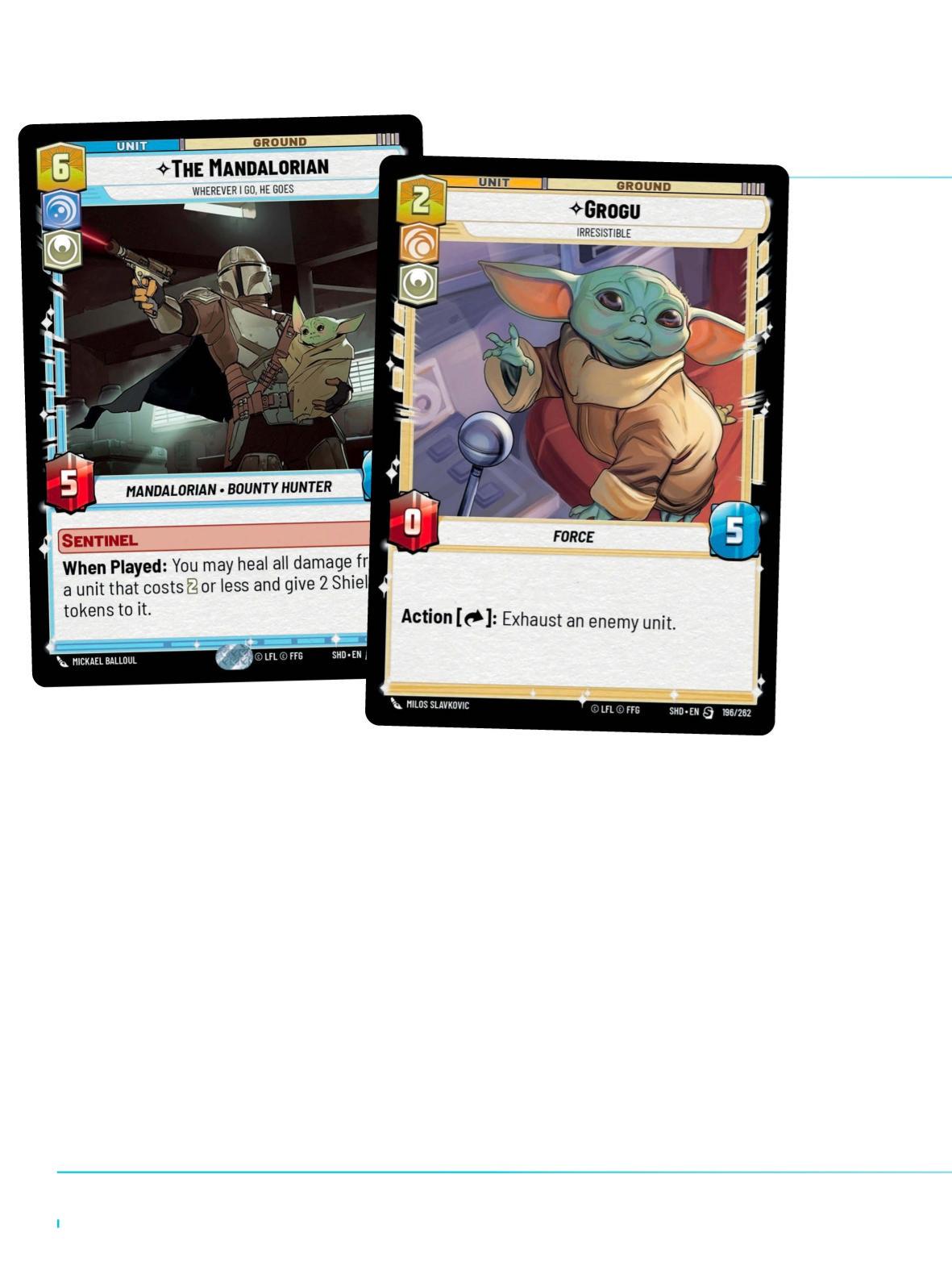
on their website, where you can track the points that you earn from the games you play in Each event w ill award you points based on where you place, w ith first place w inners unsurpr isingly earning more than their second, third, and beyond place counterpar ts. When you have a cer tain number of points, you receive an invitation to the Galactic Championships However, there’s no restr iction on how many games your points must come from If you ’ re at the top of your game, and come first place, you’ll automatically have enough points to get your invitation. If you ’ re still learning, or new to tournaments, or just there for fun – or just have a bad r un of games! – you could attend multiple events, score less, but still ultimately get to the championships If you love the game, you ’ ve got ever y oppor tunity to get to the big event!
There are three methods of qualification The first is the Planetar y Qualifier, which is
the store-level events. These take place in a single day, w ith fun pr izes to be included w ithin it The second are the S ector Qualifiers, which are two-day events hosted as events in themselves There’ll be pr ize walls and fun things to engage w ith, and are descr ibed as medium sized
There’ll be a few of these qualifiers per season, and all the top placing players qualify automatically They, like the next event type we’ll talk about, also contain side events, which are designed to increase the connection w ithin gaming, though details are cur rently unknow n of how this w ill look We’re anticipating chances to play less competitively. Lastly, there are Regional Qualifiers – which are the big, large scale events, taking place only a few times each year and awarding the most tournament points, as well as some epic goodies and giveaways Anyone can attend any of these events.
These all lead up to the invite-only Galactic Championship We might not know what the prizes for these events are, but you can bet they’re going to be a big deal. The three day event whittles you down to the ultimate champion, but if you ’ ve enough tournament points, you might automatically qualify to skip the first round of the competition on the first day but that’s not the only win up for grabs – one of the aforementioned side events includes a qualifier events for the next season of organised play, giving you ways to earn points and helping you qualify for the next Galactic Championship before the one you ’ re in is even over! *
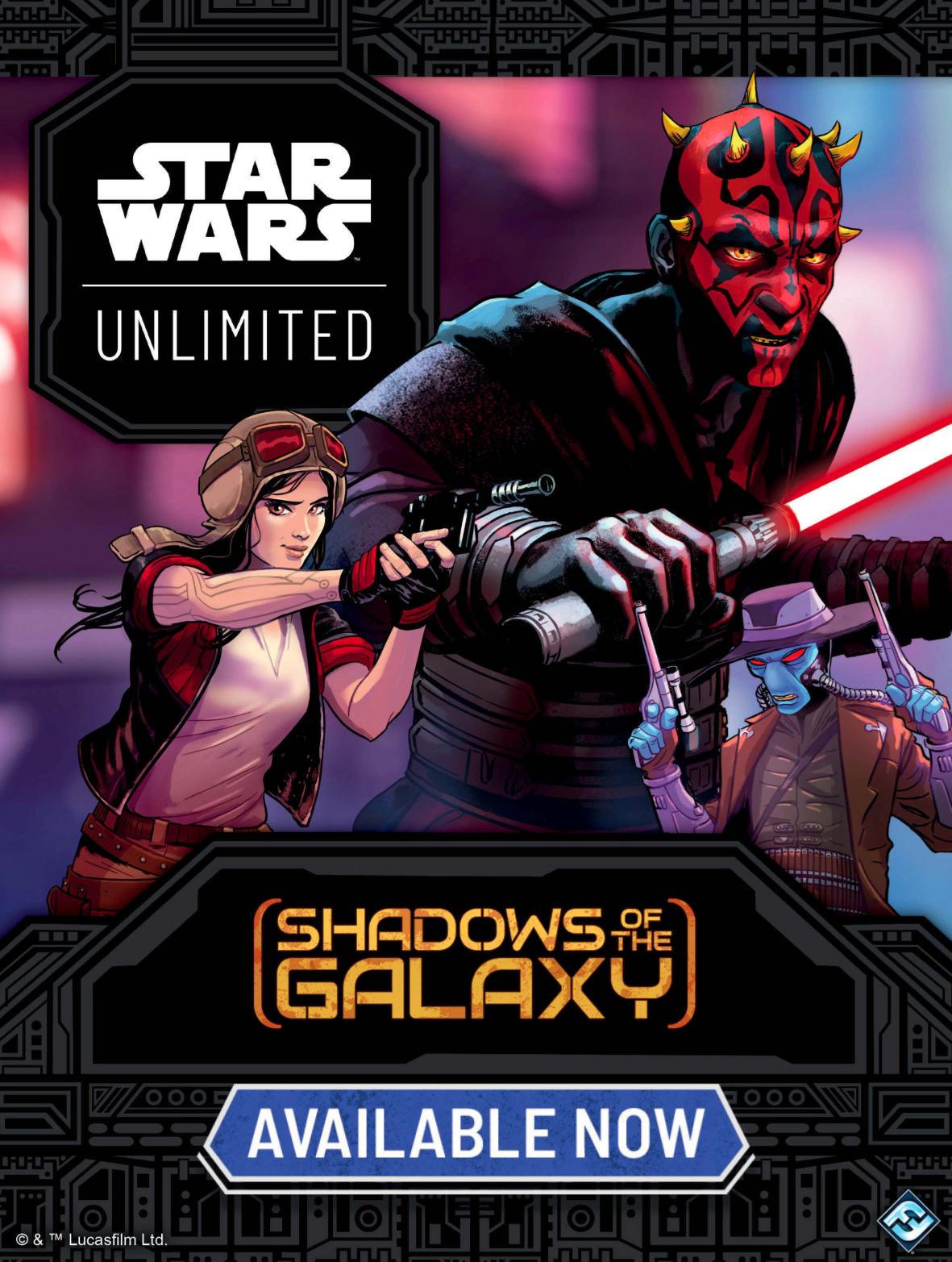
Want to tr y your hand at tournament gaming?
Gaming tournaments make the tabletop world go round – so it stands to reason that some are better than others. While we may never know what was the first official gaming competition, the popularity of these tournaments has only grown exponentially Here in 2024, tournaments are being held on a global stage for major titles like Warhammer 40K , The Pokémon Trading Card Game, and even Monopoly To become a regional or world champion is a massive honour, and takes genuine dedication, commitment, and a little bit of luck
If you have a talent for a particular title and

Writ ten by George Chrysostomou
want to enter this community of competitors, then look out for a tournament that sparks your interest. This list of competitions has been curated with an eye for size and scale, popularity, niche appeal, and sheer fun!
We start with a tournament that ran from 1977 all the way to 2019, hosted originally by RPGA and Wizards of the Coast Known first of all as the D&D Open Championship, players were able to score points based on how they handled a pre-written campaign, among their respective teams Armed with standardised characters
that players are not able to initially customise, entrants had to embark on a 4-hour round that would oftentimes run far beyond its time limit Progressing through the competition and past multiple rounds meant making intelligent choices and surviving in the midst of battle
While the competition evolved over the years and the rules changed, there was a consistency in the structure, with each round getting harder and catering to fewer and fewer teams Versions of this concept still remain today, and although a tournament based around an RPG might seem unusual, this idea experienced genuine longevity. It’s a real celebration of the skills players need to truly conquer Dungeons & Dragons and a fantastic way to bring the community together The legacy of this tournament is thus a huge part of its importance. You can even read more about this on page 18!
The UK Tournament Circuit, or UKTC is easily one of the most versatile organisers in the world. Known for its Warhammer 40K, Star Wars, and Age of Sigmar competitions, this organiser brings together multiple tournaments
from across the UK, collaborating with some of the nation’s biggest events. The London Open is a particular standout, but what’s so great about the UKTC is its rule standardisation You know what to expect from this serious and robust institution, and while there are some tournaments that bring variation to their guidelines, the great thing about the UKTC is that you can enter a range of contests to track your progress across your gaming career
The idea of a Tournament Circuit is particularly exciting and encourages the community to come together for consistent events. It’s a chance to hold multiple titles and enter the official rankings system, where the points that are scored across the competitions you enter, are tracked throughout this league Ultimately this tournament setup is an innovative space that’s well worth exploring if you ’ re a competitor with a genuine love for treating this hobby as if it were a sport.
Held ever y year in Las Vegas, the World Series of Board Gaming is actually a feature in a future article – check out page 26 to hear from one of its organisers With huge cash prizes up for grabs, world titles to win, and an alternative Wargaming Invitational to attend, the World Series of Board Gaming is an exciting and glitzy community event It’s often held across multiple days, with the previous World Series lasting almost a week! It’s thus quite the endurance test
A committee specifically chooses the 16 games that will be played across the tournament While other competitions focus
on an exclusive title, this contest seeks to find the best overall player. Those entering will have to be prepared for anything that comes their way, with the final of the previous tournament featuring Splendor as the ver y last test The tournament is backed by a big exhibition that showcases new and upcoming titles, creating further excitement for the future of the industr y The beauty of the World Series of Board Gaming is ultimately that a whole range of skills and play types are put on display, a rarity in the industr y at this level
Anyone familiar with the Pokémon franchise will know that a huge portion of the plot, whether it’s the anime or the JRPG video game series, is focused on competitive battling Players embark on a quest to collect Gym Badges, fighting their way across a region before taking on a regional league From there, there’s a world championship The Pokémon TCG Championship Series isn’t all that different, but rather than throwing Pokémon into battle, players are tasked with putting together their best trading card hand.
The series is organised into regionals, nationals, and internationals, with players able to progress across the saga. Officially hosted and set up by the Pokémon Company itself, the ambitious series boasts some of the most astounding matches that long-term fans of the title would particularly enjoy watching. What’s so special about the series though is how accessible it is Players are able to join this competition at a tiny, local level and slowly build up, making friends along the way and
improving their strategy. To gain an invite to the world championships is treated as a real honour and very few have held the top prize since the concept originally launched in 2004 A strange piece of trivia is that this series actually debuted before a video game equivalent arrived in 2009!
Wargaming has become such a massive part of the tournament space and Warhammer 40K has seemingly dominated this particular battle arena However, so often it’s a solitary affair, about personal triumph and singular play But the World Team Championships were created in 2007 to change all of that. This championship placed the game on a global stage, with teams representing specific countries Competitors from Poland, France, Cyprus, South Africa, and even the Faroe Islands came together to fight it out and claim the top spot on a carefully calculated rankings system.
Any nation can join with a team of 8 people on the roster, with the title being contested over a 4-day session. While the competition is accompanied by other events such as a
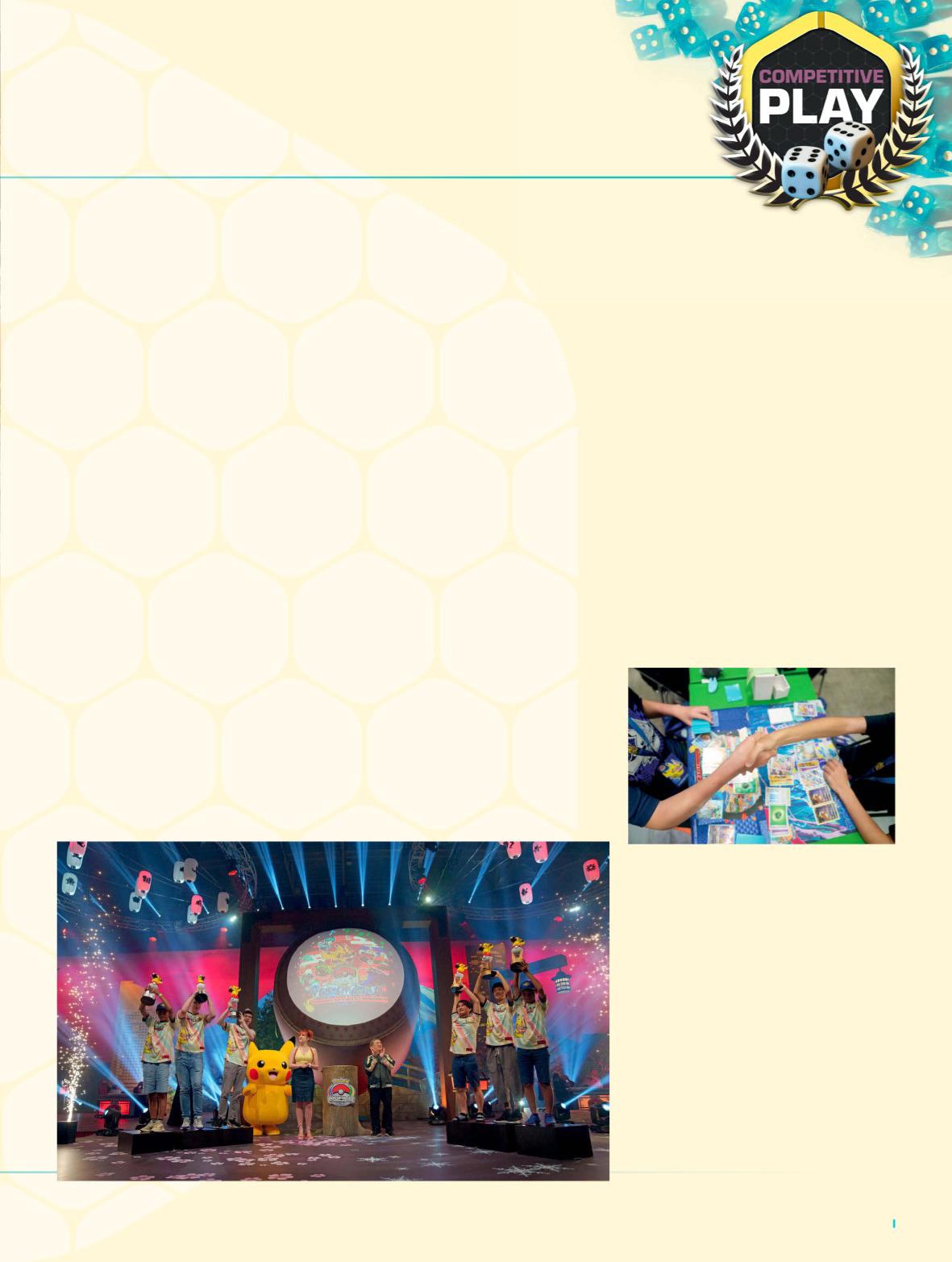
painting showcase, the focus is largely placed on championing the strategic skill needed to become a significant Warhammer player. The event has grown to encourage players and hobbyists of all ages to take part, with the community aspect helping newcomers learn more about the war game. Although the World Team Championships offer alternative game sessions, its fame and fortune has really been found among the Games Workshop community.
This is just a small insight into some of the incredible tournaments that take place across the globe But if you ’ re interested in becoming a competitor, start local and get some early experience battling in your community hobby store or regional game circuit, before progressing to the big leagues! *
Four fantastic head-to-head games – those games that invoke such competitiveness betwe en just two players, and give you the biggest fe elings of accomplishment when you win Writ ten by Mae Funnell
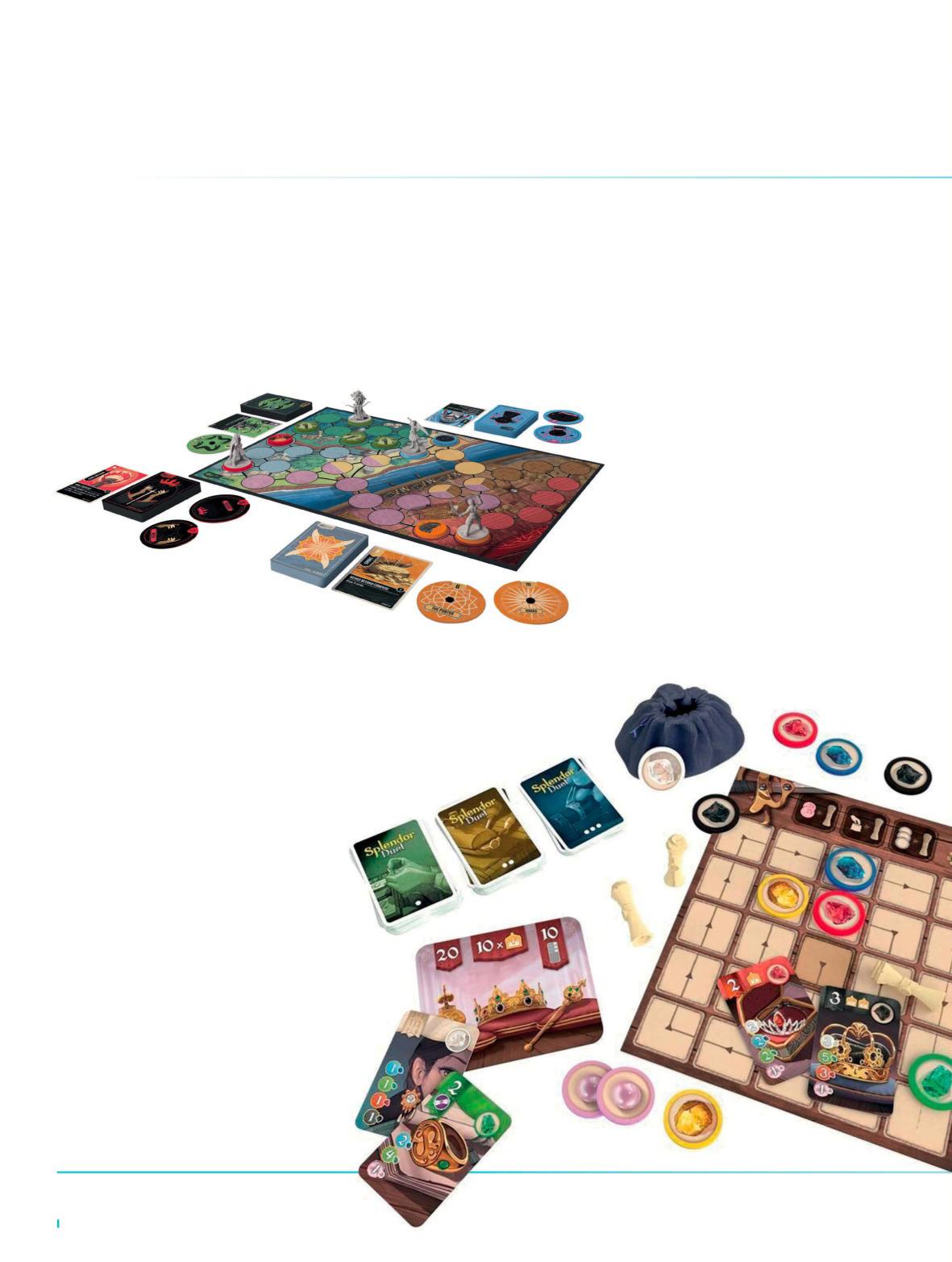
Unmatched answers questions you didn’t know you needed asking, such as who would win in a fight between Bigfoot or a T-Rex? It’s a headto-head two-player skirmish game that you can play with up to four players but arguably, the newer cooperative Unmatched: Tales to Amaze is better at that count. Pick your characters of any combination from the sets they offer, put your minis on the playerboard, shuffle your player decks and you ’ re ready to begin.
The game itself is simple – play cards from your hand in clever ways to combo your turns and take advantage of your character ’ s asymmetrical ability Ever y deck is made up of a combination of the same cards, and yet manages to thematically reflect each of the different characters using superb art and slight changes in card text For example, play as the raptors and deal more damage on attacks for the more raptor minis you have surrounding your victim, or play as the Invisible Man and move freely between fog tokens you ’ ve added to the board.
There are box sets and expansions galore to choose from and the variation comes with the different characters, playing around with each of their decks, manoeuvring, drawing cards and scheming You win by outlasting your opponent in battle, needing to reduce their health dial to zero before they do the same to you This creates these defensive dances during play with a push-your-luck element, knowing when to time manoeuvring away to be able to draw cards you know are in your
deck somewhere, or holding your ground and hoping that one defence card left in your hand will be enough to keep you alive till next round…Where you can make the final blow.
The two player specific version of the classic Splendor, and my now prefer red version of the
game and is cer tainly super ior to playing Splendor at two You’re picking up lines of up to three gems from a shared board, and spending them to collect cards to build up your tableau, giving you per manent gems to spend on future turns, w ith the added secondar y game of outlasting your opponent to make them replenish the board that ’ s oh so satisfying ( gaining you a pr ivilege in the process ) There are now three different end scor ing cr iter ia ; collect ten crow n symbols found on var ious cards, or have 20 points, or 10 points on cards on gem colour
The pr ivilege tokens, new to this var iant, add a catch-up mechanism where you ’ re able to spend one in addition to your turn to draw any token from the board, as
well as the clever use of only two new pearls gems in the game, which are needed to pay for so many cards (and preventing a r unaway leader). Or, you could forgo draw ing from the board on your turn to pick up a w ild gold token and reser ve any card of your choice, preventing the other player from now having access to it
This is a great headto-head game and the best two-player tableau builder I know, where you ’ re constantly tr ying to keep aware of what the other player is doing to tr y and anticipate what tokens they’re going to take, what cards they’re working towards, and how many points they have It means it ’ s wholly engaging for both players throughout.
The newest release on this list, this 2-5 player game shines at two and I wouldn’t play it at any other player count It ’ s simple, and
yet your ability to mess w ith one another is delicious. You have three cour tier cards in your hand at the star t of your turn and play them to either a central cour t, in front of you, or in your opponent ’ s player area. That ’ s it. Where you play your cards matters, as if they’re played above the tapestr y-like mat at the queen ’ s table means that faction is ‘esteemed’ , and under the mat means they’ve ‘fallen from grace ’ That ’ s a fanc y way of saying that the number of cards in the colours family w ill score either positive or negative points depending on if there are more above or below the table at the end of the game. Lastly, any cards in front of anyone from ‘esteemed’ families score a point
This sounds ver y simple, but the four special roles scattered w ithin the deck add a layer of bluffing and head game that keeps the game coming back to the table time and time again. There are nobles who count as two cards, spies who are played dow n and only revealed at the end of the game, assassins who, when played to an area,
A two-player postapocalyptic duelling card game where you ’ re trying to destroy your opponent’s three base camps first is bound to be a winner Your choice in camps matters as they’re the abilities you have access to during the game and also determine your starting hand size, giving you tactical decisions straight off the bat, and forcing you to balance the better actions with a decent number of starting cards.
Radlands is all about the multi-use cards, drawn from a shared deck You might be playing them down onto your player grid as characters, discarding them for an ability in their top left, playing events onto the event tracker or at the very least playing them face down as a ‘punk’ which can provide a very helpful temporary shield to a valuable card you ’ re trying to protect
In this wasteland, you use water as the currenc y to pay to play cards & activate their effects Water is scarce which is hugely thematic, leaving you struggling to do ever ything you want to each round, you ’ re tr ying to maximise your actions as what you do & when you do it matters.
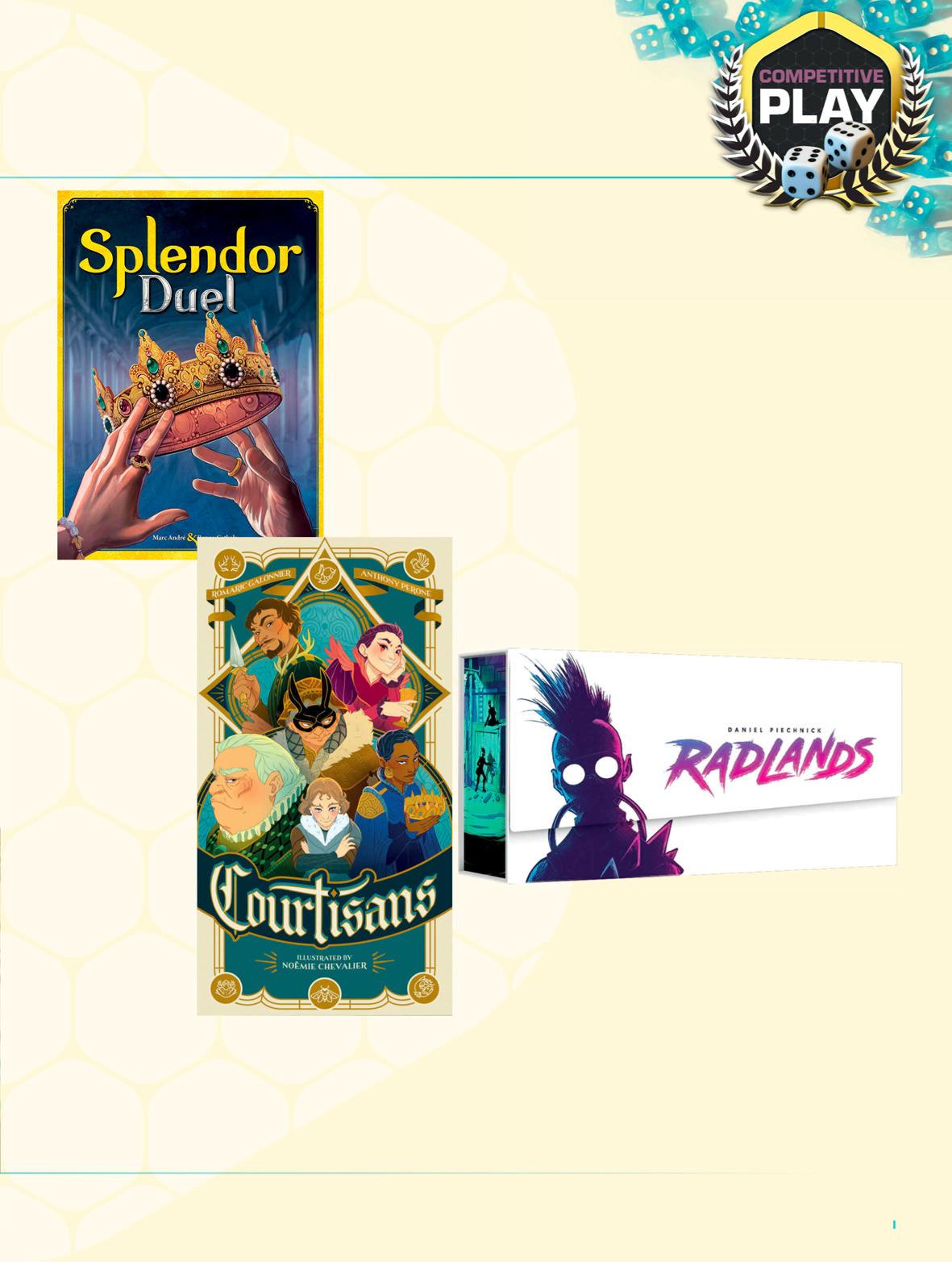
take out a card of your choosing, and guards who are immune to being assassinated. The production quality is fantastic, the cards have a metallic shine and the small differences in art between the special cards carr ying daggers or shields are a ver y nice touch The game is fast-paced and impressed me with how much you can influence how your opponent scores by either playing negative points straight in front of them, or by placing cards that change that stack of previously positive scoring cards into negative
The design choices in this game bring it to life, like the smoothness of drawing the water tower card to your hand so you don’t forget you have an extra one to spend on your turn. The phenomenal psychedelic Mad Max style art gives the game such table presence, the deluxe edition is phwooar (that’s the technical term) and while not 100% necessary to play, the playmats are functional and elevate the game, making it easier to visually see where your card rows are. There’s something satisfyingly ominous watching your raid card edge closer to your opponent each round – and it feels like such an achievement when you take out the other players’ last base, especially when you can both see it coming *
Writ ten by George Chrysostomou
We ’ re all a little competitive.
That’s why we love tabletop gaming, because it gives us a fun space to explore those character traits, as we attempt to become the best at a particular title Competitions and tournaments, regardless of their form, have been born from that desire to claim the crown But we also have to find ways to improve, as rival players test themselves and find new techniques to rely upon Here’s how to apply an analytical eye to your own progress, to get the most from your skillset.
The ver y first step to analysing your gameplay is to be able to access your previous matches. You’ll never be able to get better if you cannot see how you play to begin with Keeping battle reports, which we explore in more detail in this issue (see page 24), is a great way to do so But you can also film yourself playing against, friends, family, or even in competitions (with the right permission), to get a sense of how you make choices under those circumstances
When you watch these moments back, tr y to pinpoint the decisions that threw you off course Can you always identify why you made
those choices in those moments? What did the opponent do that was unpredictable and made you change your strategy? Finding those segments of tension, where you ’ re struggling, rather than when you ’ re thriving, can be a robust way to challenge your understanding of a game. But look to the successes too, so that you can continue to play to your strengths
Playing at home or in the local community is one thing, but actually getting to a tournament is a whole different beast. Some may feel pressure at this grander stage or could feel over whelmed by the level of play But this is a friendly and welcoming space, where ever yone is looking to help out their peers
By attending tournaments, not only can you pick up tips and advice from other matches, watching and analysing as a spectator, but you can also test yourself against the best Sometimes, the only way to measure progress is by pushing your skills to their limits and seeing how you fare in those environments
This is a fun and challenging way to throw yourself head-first into the tabletop tournament space Seek out the best and you’ll get better And when you do, don’t be afraid to look at how your opponents strategise based on their experience You’ll quickly pick up on your own unique approach when compared to peers

Want to get the best out of your abilities? We’ve got some tips on how to hone your hobby
Visiting local hobby stores and community spaces to attend workshops can make a vital difference to the way you play. Even attending beginners’ sessions, regardless of whether you ’ re an expert, can help to ground you in the basics once more and remind you of those simple strategies that you may have overlooked Helping to teach others can be an even better learning experience. You’ll see problems from new angles and can create solutions based on the unexpected questions you will face. These fun events will help you meet others within the gaming space and can allow you to view your skills from an alternative perspective.
We’ve highlighted a few methods of analysing your skills and what to look out for to better your gameplay style Everyone has a different way of learning and not every avenue described above will be necessarily helpful. What you really want to look out for, regardless of the way you approach this topic, is the foundation of your techniques. If you understand the basis of your strategy, whether you react in stressful moments, play with flair and humour, or perhaps are too tactically defensive, you’ll find everything else falls into place Zone in on the personality of your play and the rest will follow *
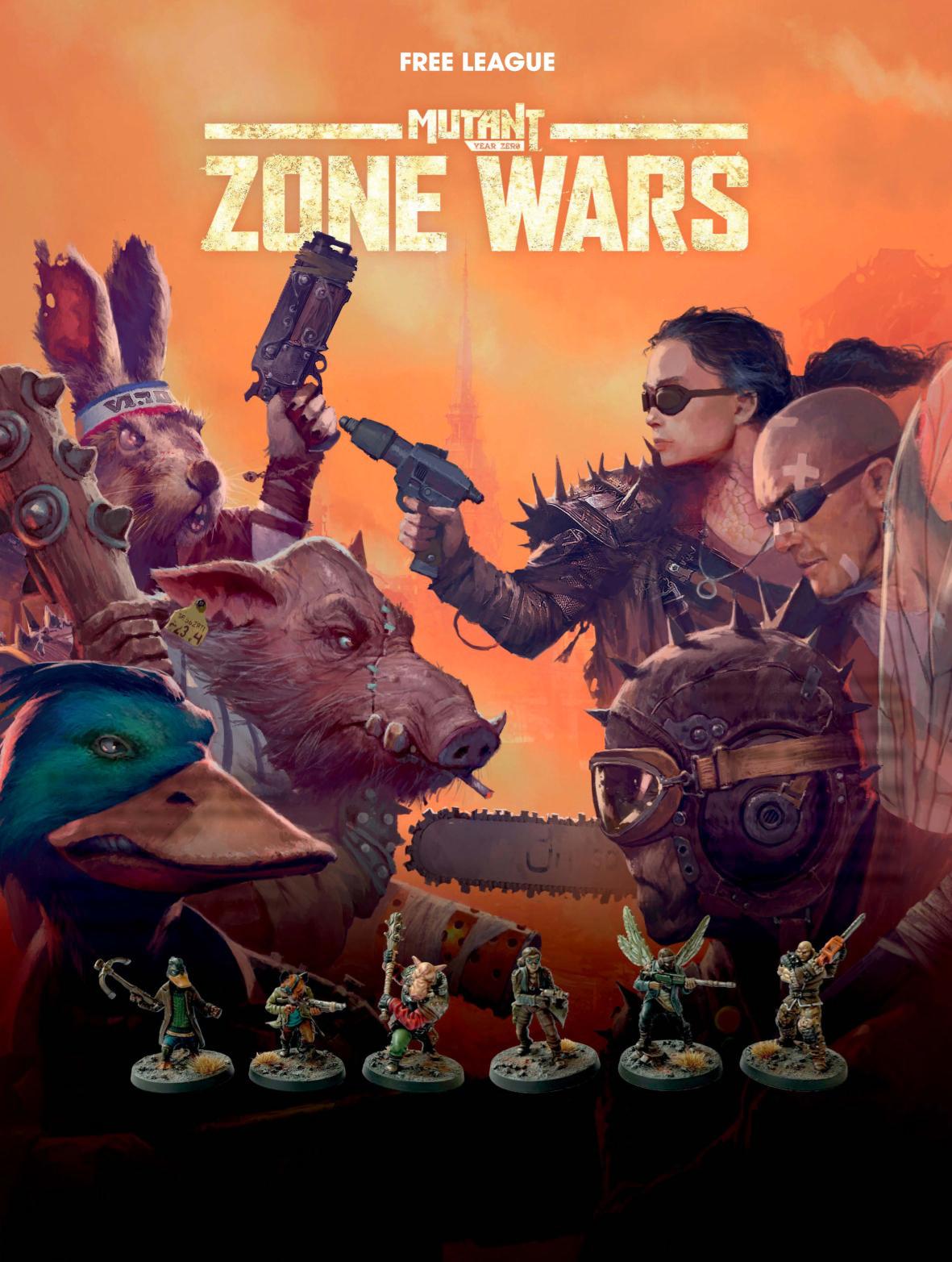
Think D&D is collaborative? Think again…
Writ ten by Arlie Pallant
What do the words
“Competitive Dungeons and Dragons” make you think? Player vs Player? Battle Royale? Maybe even the Adventurers League, D&D’s own way to bring players into the same world, even if competition isn’t its main aim. Well, it’s been plenty competitive in the past, so it’s time to gather your competitive spirit as we look at the options from over the years – and see if we can modernise one
Competitive Dungeons and Dragons is most well-known through the D&D Championship Series, an annual event run at Gen Con (the largest tabletop convention in North America) for a number of years, with a few additional events taking place after its end, including a 2019 UK Games Expo event Dungeon Masters were given the same adventure to run and players were given pre-generated characters and then ranked against each other for prizes
Of the three forms of competitive D&D used in Gen Con, two are still around to this day. Let’s dive into some of those more formalised modes of competitive play
The D&D Championship series began in 1977, with a Dungeon Master swapping between two teams ever y fifteen minutes. The next year their numbers boomed as even with 100 slots, they still had to turn 250 people away
These first phases were mostly run in Advanced Dungeons and Dragons, and the winner would either be decided by a fight to the death, Battle Royale style, or by the Game Master choosing who they believed had the strongest understanding of the game
Nowadays Battle Royales are mostly enjoyed as a break from longer campaigns as they require strategic character-building that is less focused on roleplaying.
D&D Adventurers League isn’t inherently competitive. It’s designed as a way to get players together to play games in a more structured manner, but since player versus player is an option, it depends on the table as to whether a competitive element emerges The concept of many players in the same world was first used in 1987 at Gen Con but has had multiple reboots since Originally it was known as a Living Campaign where the average result would decide future editions, for example, if most teams banished a curse then that curse would be gone in the next released session They rebranded this into D&D Adventurers League with the launch of the 5th edition which was used in 2016 and 2019 at Gen Con In Adventurers League players could drop in and out of a campaign and the Game Master kept official logs of XP and gear

For Gen Con this meant a rebrand to a less competitive atmosphere, opening it to all player levels and even having teams work together to share information. This brings back the cooperative element of D&D that Battle Royales miss – however, its focus isn’t on competition in the same way as the other examples It also requires very large groups of people which are hard to find outside of events
Shards of Eberron’s system, which I’ve been calling a team trial, was nestled between these two other Gen Con eras and was first used in 2008 Rather than being about player versus player or lots of people in the same world like the other two forms of competitive play, its focus was on the secret scoring system it used for rating the player ’ s actions as a team
The scoring system was a chart used by the Game Master to add and subtract points based on the characters’ decisions as a party, with factors such as using optimal spells for the situation, avoiding combats, and discovering secrets The points ranged from plus seven to
minus seven, as well as having larger pools of points for the number of characters that sur vived to the end
Despite the tournament scoring being hidden for the championship, it was later published in Dungeon Magazine for people to play at home, which is how I found it and played it myself. I was really drawn to this concept because it seemed to balance the want for teamwork with a competitive feel –but how would it stand up in the modern day?
The first of the Shards of Eberron was a stor y called The Hidden Shrine of Tamoachan, where a group of premade adventuring characters got stuck in a shrine with poison gas and needed to escape before the time ran out This was a great way of introducing a reallife time limit of two hours, and keeping the focus on escaping rather than engaging with ever y potential conflict
There were some great moments such as a character trying to eat algae as a joke, only to realise there were actually rules for touching
the algae, but it’s not one that handholds the DM through the process, and it admittedly comes with a lot of dialogue that seems unnecessary, that perhaps just pads the time.
Overall, I would recommend Shards of Eberron for people who are already fans of 3.5e and want to tr y something new, but learning a new edition is a big time sink, and its concept is better than its execution
As 3 5e isn’t the most played version of D&D these days – 5th edition takes that title – the second question I asked myself after playing the original was if there was any way of transferring The Hidden Shrine of Tamoachan to the 5th edition. Spoiler alert : there were, but they weren’t worth playing The tournament point sheets weren’t translated over for specific spells and some of the scenarios didn’t translate properly So where does that leave us?
I’m still surprised that this version of
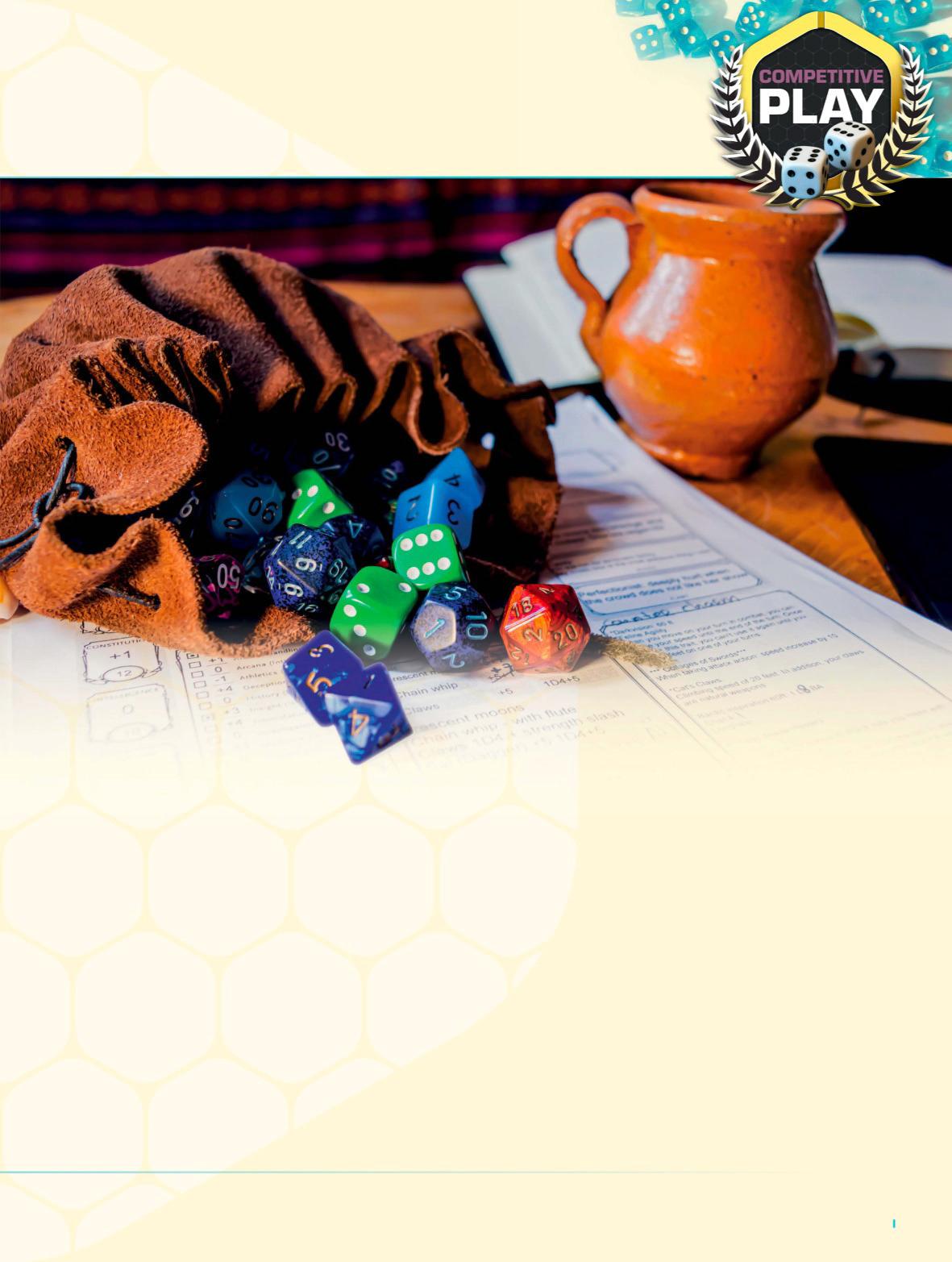
competitive D&D hasn’t sur vived alongside the other two, as it has a nice nostalgia that feels like an old arcade game, as well as the perfect balance between group dynamics and tangible, competitive rules.
The only thing in the way of its success is the bar r ier to entr y I could only find the Shards of Eber ron in Dungeon Magazine, and I haven’t seen anything like it in 5e, so it would require a game master w ith a strong understanding of the r ules and the time to dedicate to creating the adventure and scor ing system Despite Shards of Eber ron not being something I’d recommend playing in 5e, it ’ s a goldmine of inspiration for making your ow n team tr ial, allow ing Dungeon Masters to to utilise the br illiant elements of the early version but using more familiar r ules and expectations of the newer editions With a new score sheet and the r ight adventure, it could be a really fun and unique for m of D&D It also helps to fill a gap, by rewarding those players who have intimate game knowledge w ith a tangible result which is arguably cur rently missing from the cur rent D&D landscape *
Writ ten by Mae Funnell
Competitive games are fantastic and all, but bring me to that inevitable question of ‘what do I do if my child can’t deal with losing?’ I think all kiddliwinks (and who are we kidding a lot of adults too) go through a stage where not winning becomes particularly difficult for them so some advice for helping with those sore losers
Play cooperatively! The choice of family co-op games around at the moment is incredible, and with so many different themes and types of gameplay, you ’ re guaranteed to find something you want to play together. So many are genuinely great fun for adults to play too, like Race to the Raft, 5 Minute Dungeon, Chronicles of Avel or Dorfromantic. Or play solo games like Orchard or Rove, teaming up so you all win or lose together
Tr y playing with them as a team, a loss can feel softer as they lost with you not on their own, and had someone to bounce their ideas off in game Kids vs Mum in a one vs all game are favourites here, like in Chop Chop! Or I’ll be teamed up against in 1 Vs 1 games like Boop, the teamwork & comrader y they show tr ying to get a win against me is excellent.
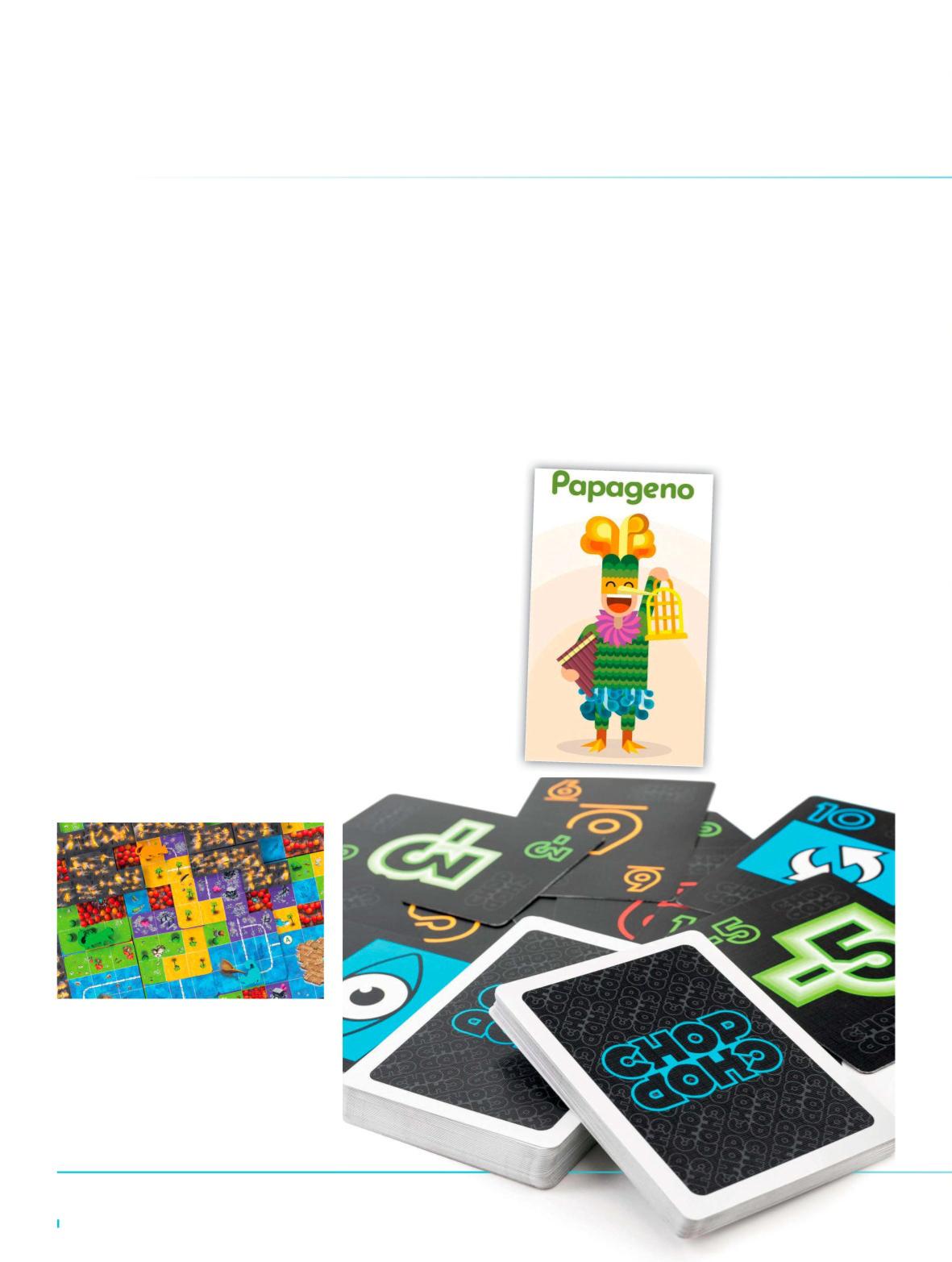
Playing games you want to lose at or get the lowest score to win can help, flipping the idea of losing on its head. In Papageno, you can use games you already have but ‘play opposite’ to see who can get the least amount of points this time.
Play little, quick games like Dobble or Chicken! back to back so there’s no time to
think about the winner just straight onto the next game –how about best 3 out of 5? A loss can feel so much worse after spending over an hour on one game, giving it your all, and not managing to win Don’t forget to praise clever moves and lucky rolls during the game too, not just the winner at the end
Model being a good loser. I’ll sometimes throw a game and make a point of saying something like “Oh dear, I’m losing! Well, maybe next time” without being upset, to show that you can lose and the world doesn’t end And model being a good winner! “Hey I won, but wasn’t that move where you blocked my exit brilliant? I didn’t think I was going to win when you did that - rematch?”
Letting them win when they need it is a controversial topic, but if I can see they’ve had a bad day and they really
just need that win, occasionally I still let them
Especially when the toddler has hit a losing streak and is becoming increasingly frustrated at playing a particular game I want my kids to enjoy playing games and if they can never beat me they’re not going to enjoy playing with me. Equally, I avoid playing games when they’re more tired, as those times would mean bigger emotions and less likely to cope with losing.
Kids get better at losing the older they get, some just reach that age earlier than others so don’t rush it If they’re still little (4/5/6) they might not be ready for competitive play yet and it’s much better they enjoy board games than choose not to play at all because they’re upset about always losing
Even if it means I’m playing Unicorn Glitterluck : Cloud Stacking (A Haba game sometimes called Cloud Stacking Unicorns) for the 50th time... *
Writ ten by Chad Wilkinson
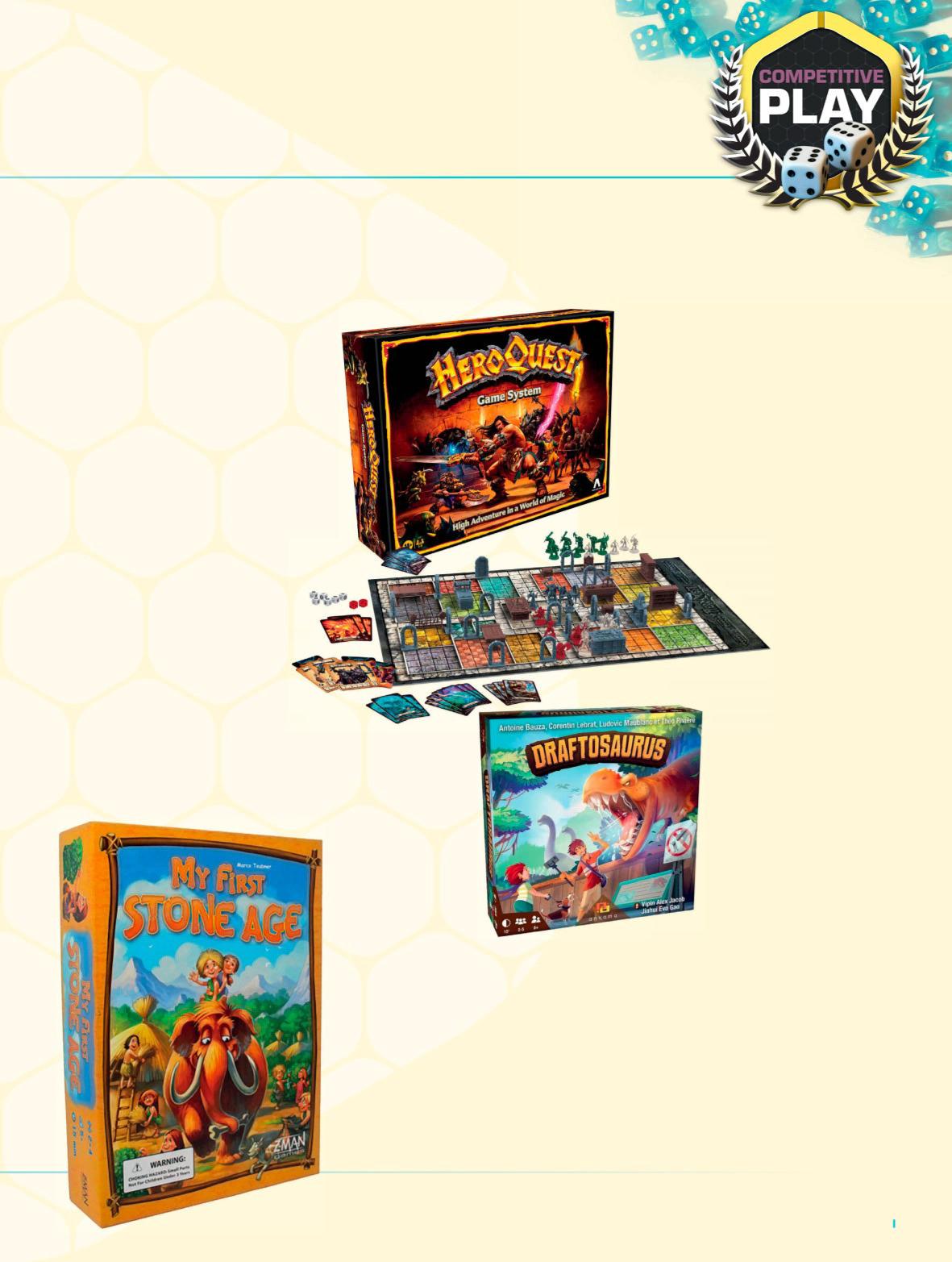
FLosing is a natural part of games, but what happens when you ’ re tr ying to handle children’s reactions? Two parents offer their best tips for mitigating those losses…
or me, competitiveness feels like an almost dirty word There’s a short-sighted, almost aggressive quality to it that just doesn’t gel well with my experience of the hobby I play to win, sure, just not with a mindset that has victor y obscuring the overall social, communal experience Ultimately, there’s a difference between aiming to win and being fiercely competitive, and it’s an affinity for the former that I hope to instil in my children
So, in an effort to avoid raising a brood of moody table-flippers, here’s a few tips.
I recently played a game of Pop-a-Tops : Dino Scores with my son and mother-inlaw, and I shamelessly thrashed them. When presented with this rare opportunity to actually put all the dinosaur knowledge I’d acquired as a child to practical use, I couldn’t resist. Pop-a-Tops games are perfect for children They’re simple, fun, tactile, and educational, but, thanks to my rashness, my son now flat out refuses to play it again And not just with me, with anyone
Now, this isn’t a common occurrence For the most part I tr y to be mindful of what
purpose my winning (or losing) is ser ving in the context of my son ’ s experience of board games Essentially - besides ensuring that the experience is fun - the purpose is to teach some aspect of the game. If I build that third winning hut in My First Stone Age I need to make sure I’ve highlighted the importance of the game ’ s memor y aspect, typically by verbally narrating my turn Similarly, if I lose a game (something I’d advise on a child’s first play through, regardless of how counterintuitive it feels), I’ll explain exactly how they bested me and what I could have done better.
We want our children to learn how to play well, and, in turn, win graciously and lose amicably. To do so they need to experience and witness losses and victories - an admittedly repetitive process requiring
patience and restraint Persevere, though, and pretty soon your victories will come to feel well and truly earned.
Think of the sheer variety of genres and mechanics the hobby has to offer as representing a toolbox of sorts Collectible card games and abstract titles such as chess, alongside the sprawling tabletop battle games like Warhammer 40k represent the power tools we reach for when feeling ultra-competitive
At the other end of the spectrum are the cosy RPGs and storytelling games where players can simply bask in the shared experience. In between, though, are a number of varied tools perfect for honing the competitive skills of young gamers
We’ve already discussed the positives of epic adventure games and riotous social experiences but there’s plenty more to utilise
An example would be the one vs all format seen in games like HeroQuest, or Fury of Dracula
Experiencing loss as a team is far easier than it is alone, and often encourages the sort of animated, post-game, tactical reflection that rarely occurs in a typical allagainst-all game
Similarly, whilst fully cooperative games obviously lack the elements of healthy competition we ’ re aiming for here, they still have the capacity to familiarise young players with the concept of losing whilst still having fun
Other great tools are games that can easily be played quickly and successively. Our go-to quick games to play with kids are G et Bit, Sushi G o!, and Draftosaurus If played enough times, these types of games can provide a more or less balanced exposure to both winning and losing in a short amount of time Consequently, younger players should reach a point where their competitiveness remains high but their losses are taken in stride *
Organise d play is a huge part of the board game scene, and who better to ask about it than one of the great gateway games? We sat with Stephanie Newman, the Development and Organise d Play manager for CATAN Studio, the English-language publisher of the CATAN games
Interview by Charlie Pettit
M“y dad is in his seventies He played the base game w ith me, and he just loved it He immediately star ted buying ever y single flavour of C ATAN that you can find – he now ow ns ever y single one ” Stephanie says, when we ’ re talking about the appeal of C ATAN and playing together. “He has a guy that rents a room from him, and he, my dad and my nephew and his girlfr iend, all come to my dad’s and play C ATAN w ith him once a week. I love that Organised Play ”
Admittedly, Stephanie’s Dad can’t play in the tournaments run by C ATAN, but that doesn’t stop him wanting to While he’s managed to build his own community of players to pit himself against, Organised Play and the tournaments run are a way to bring people together
“For people like that who really enjoy the game and want to play it with people, the tournaments give them a community and it gives them people that they can get to know, see outside the tournament program, and play C ATAN with I love that it brings people who love something together so that they can not just compete and try to win prizes, but also just make a lot of new friends and see people they haven’t seen in a long time And that’s how I feel when I go to the events I feel like I’m seeing my friends. They bring together people that love something that want to meet other people that love that same thing And that’s what we ’ re facilitating. So for new players, old players, you know – come join a tournament It’s fun!”
“For C ATAN, Organised Play is about engaging with both our most dedicated players, the
people who’ve been going to tournaments for decades, literally, as well as tr ying to get the game in front of new people, especially in stores and at conventions When people see people gathered around a game having fun, they’re like, what’s that? What are they doing?”
Although play starts at a local level – and, if you want to play, you can ask your Friendly Local Game Store to reach out to make it happen – you can find most events by going to the event’s website, enter into a qualifier, and if you win, head to the national championships For the UK , that’s held at UK Games Expo
Winning doesn’t come with a cash prize as such, but there are promotional items and the winners are then sent to the C ATAN World Championships
“Ever ybody comes to Worlds. And Worlds is ever y two years We hosted it last in Malta And this next one will be sometime in the spring of
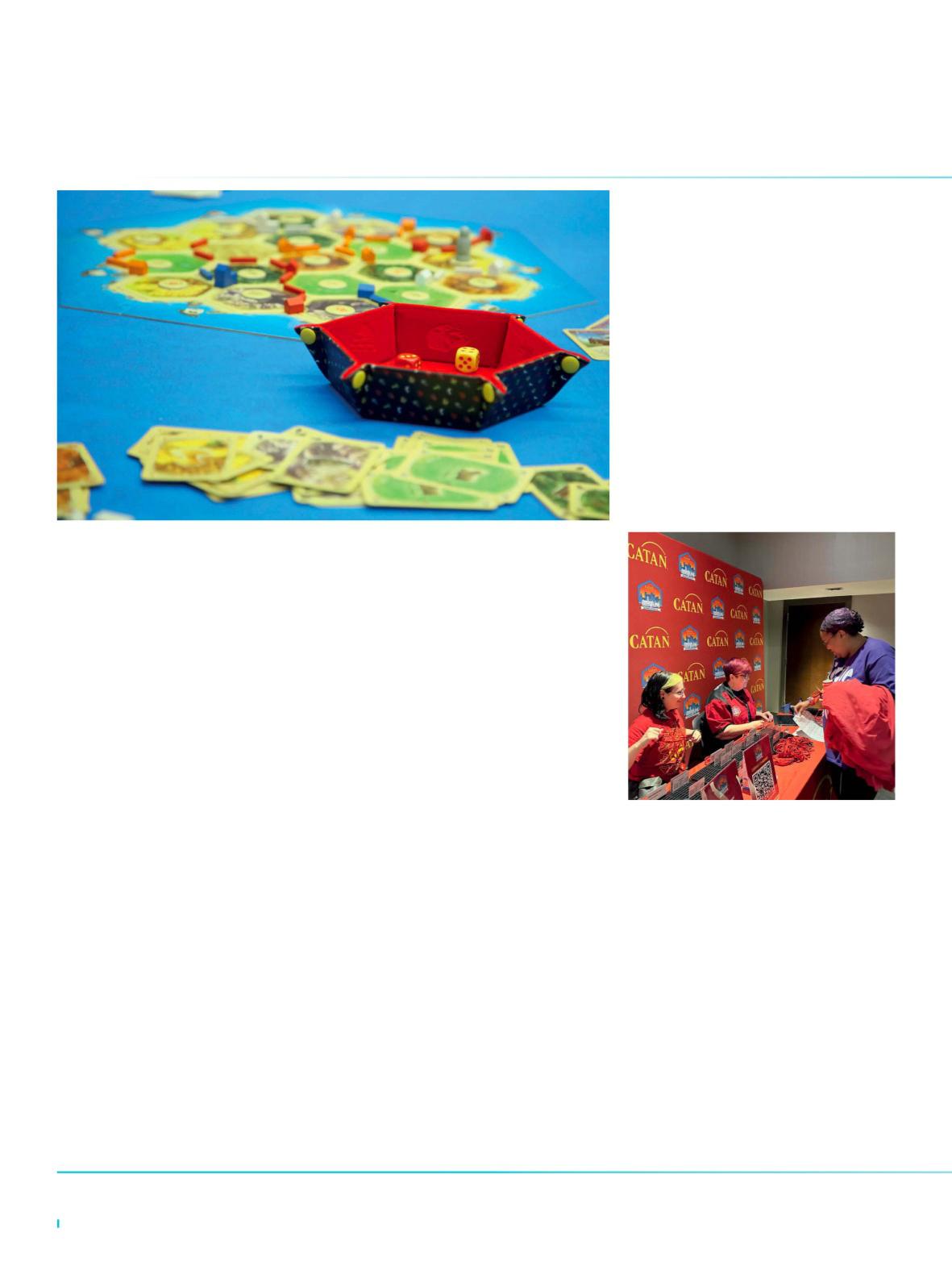
2025 There were about 90 players at the last Worlds I believe they were representing about 50 countries”
“I have a lot of national champions that have never played in a tournament before, or have only been playing C ATAN for a year or two ” Stephanie says. “There’s a lot of luck in C ATAN with the dice. That’s a ver y levelling factor. But when you ’ ve got somebody who’s good at the social aspect of the game, that’s the hardest part to learn. If they’re good at that, there’s no reason why you shouldn’t consider competing on a higher level than just with your friends and family. It keeps the community growing. It keeps new people coming in all the time
Want to get involved? Check out the C ATAN Events website for your closest, and who knows, we could be hearing from you at the 2027 World Championship! *
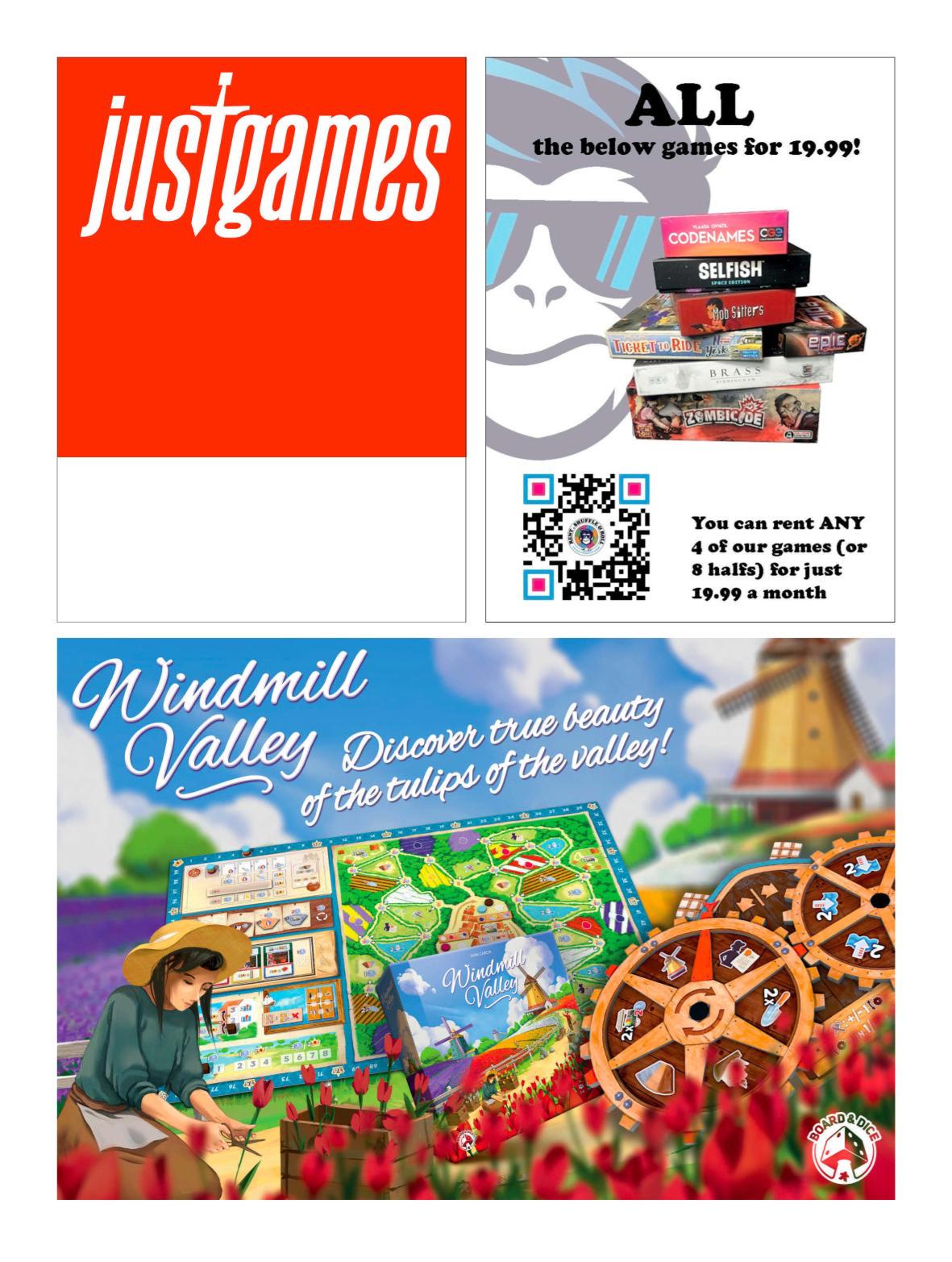
Battle Reports have be come such a big part of the tabletop gaming world, but what do they really bring to a game? Writ ten by George Chrysostomou Images by Chris Lowry
We ’ ve featured plenty of them here at Tabletop Gaming magazine, diving into the strategies, shock moves, and run of play from contests and competitions across the country. But for those unfamiliar with Battle Reports, and for those that aren’t quite convinced of their value, we ’ ve done a deep dive into what they are, and how they have helped to elevate the industry Battle Reports are here to stay because they really have helped to change the game and have some crucial ties to the competitive landscape From improving a player’s chances in a tournament to tracking the progress of key players throughout a competition, Battle Reports are vital in this space
If you ’ re new to the hobby, or perhaps even to this magazine, you might have never seen a Battle Report before. The basic principles of a report are ver y simple. It’s not much different from a sports breakdown, analysing ever y move a player makes and depicting the way a game plays out for those who were not in attendance Great Battle Reports will set the scene, provide stats throughout the game, and give insights into the mentality and strategies of the players involved Battle Reports can be applied to any number of games. It’s uncommon, but there are Battle Reports out there for competitive board games, especially in tournament settings Any
strategy title, in particular, will benefit from this kind of coverage Trading Card Games like Pokémon fit into this style of journalism and some have even created a report based on their RPG campaign A Battle Report can come from anyone watching from the sidelines or involved in the action, but of course, as with any coverage, a more objective storyteller is the most effective These reports are put together via the written word, video, and/or audio, making them accessible to a wider audience
Although there are ways to create Battle Reports for any number of competitive games, this style has primarily been used to portray the major moments of wargaming Warhammer : Age of Sigmar, Warhammer 40K and Middle-earth Strategy Battle Game from Games Workshop have been the focus of countless Battle Reports and may act as a point of introduction for many, due to the widespread publicity of these titles. But the format works for any wargames in the genre, from Star Wars : Legion to Marvel Crisis Protocol, Swordpoint, The Silver Bayonet, and Kings of War.
The mechanics of wargaming specifically cater to this type of report, with turn-based systems, stat-led decision-making, and visual gameplay style lending themselves well to a focused and tactically-minded report Next time you play a tabletop wargame, it might be worth keeping notes to write up as a Battle Report to share with friends or refer back to in
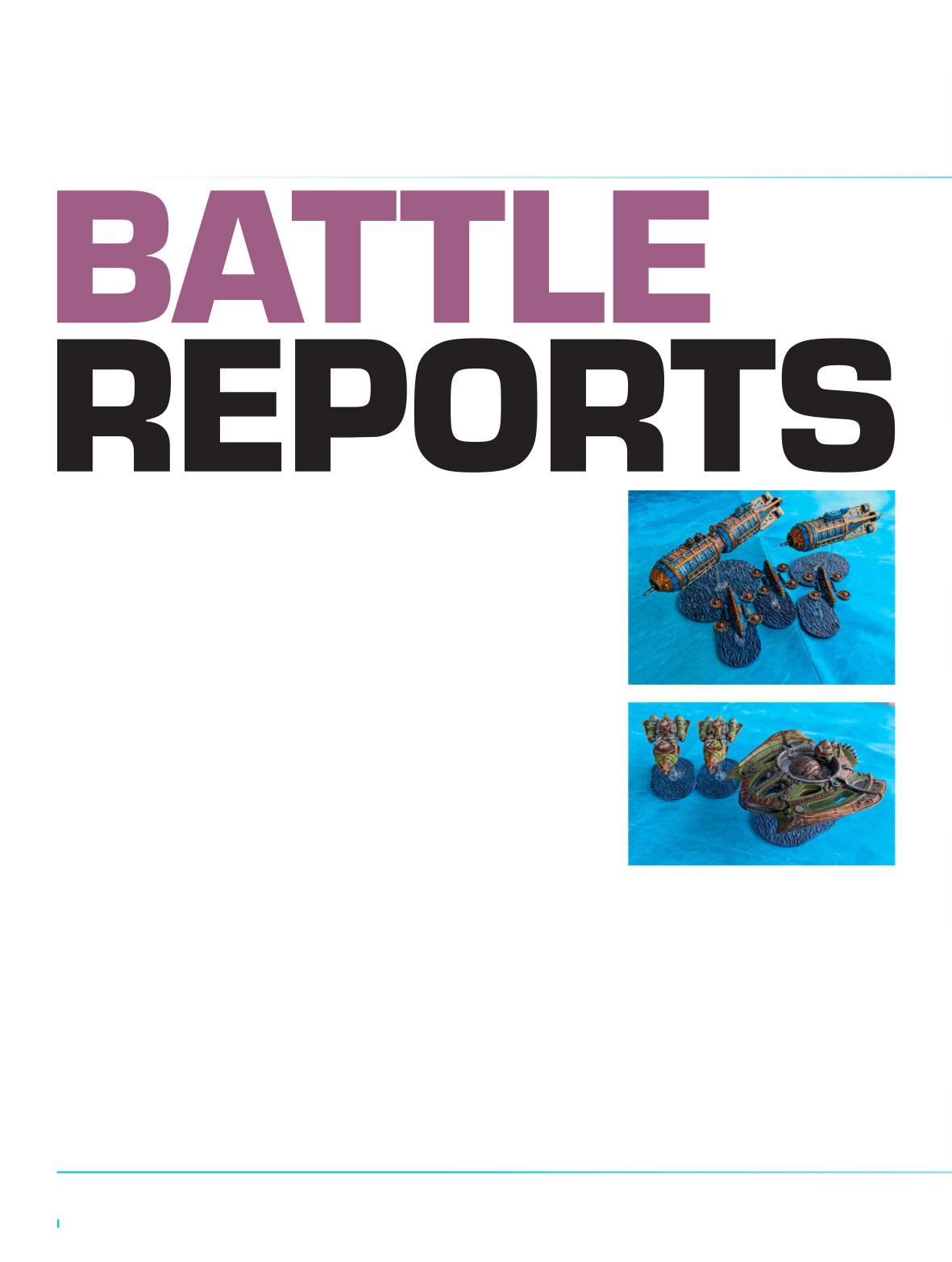
future skirmishes
But what’s actually the benefit of a Battle Report? What’s the point of creating one, or reading the results of someone else’s experience? Well, players can learn a lot from how others interact with a title Battle Reports are perfect resources to learn a game ’ s rules, pick up specific tips and strategies, and ultimately gain inspiration about how to approach future battles or sessions.
Some of the best players in the world have only gotten that good because they have continued to hone their abilities, taking cues from the top tier of their respective fields Battle Reports can be incredibly exciting if you
follow a specific player, as it can show their growth and give audiences someone to root for What’s more, if you take Battle Reports of your past victories and defeats, they can act as fantastic tools to reflect upon those successes and failures, to come back better than ever.
For any competitive game to thrive there has to be a sense of that vibrant competition Battle Reports definitely encourage that spirit. If they help players to get better and share information with the community, then they are also influencing the games that players are taking up This encourages more players to enter tournaments, after learning more about
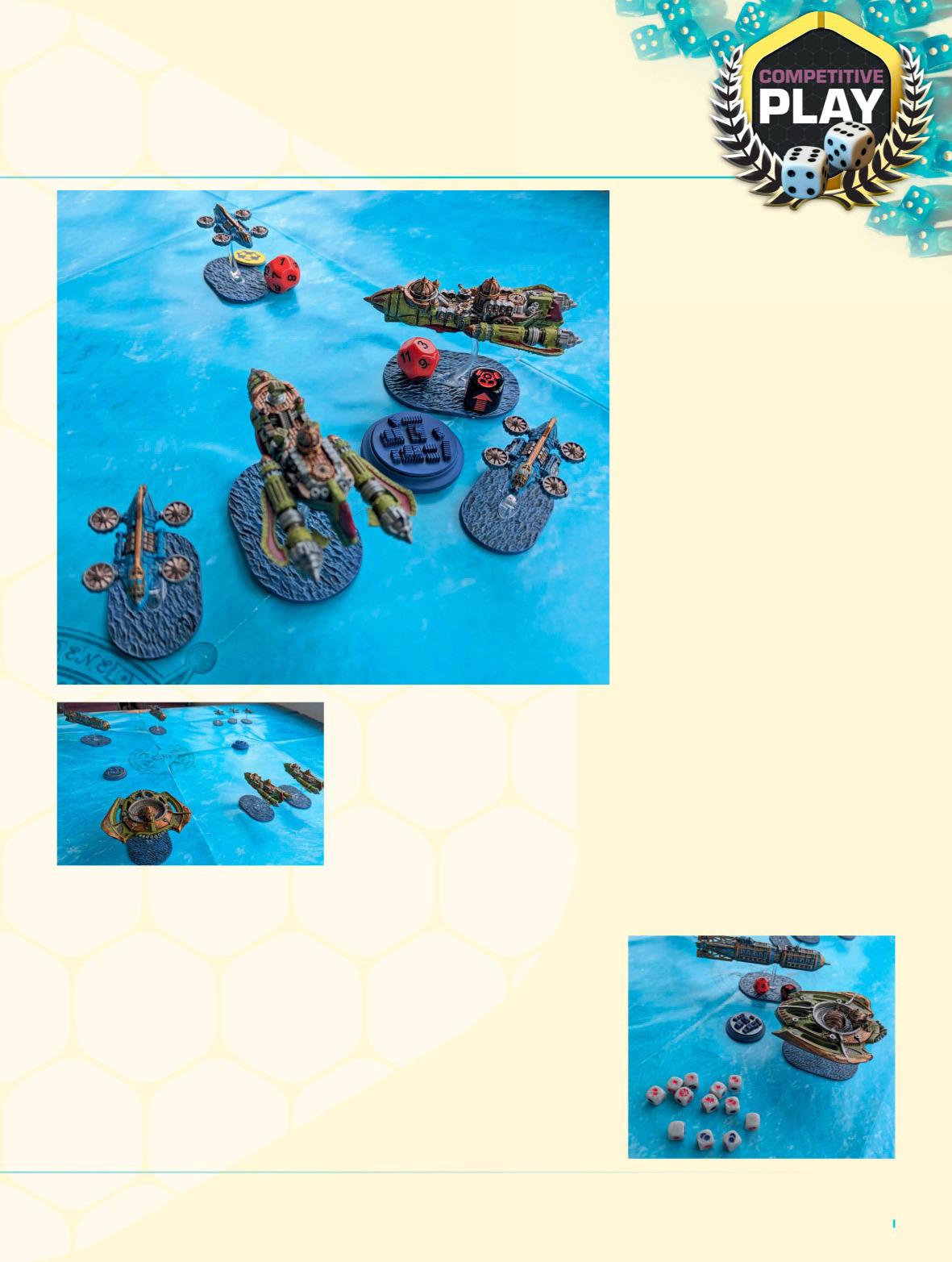
the games involved and having seen them from afar Battle Reports therefore ensure that competitions become spectator sports of sorts, while also promoting those tournaments to a wider audience
Battle Reports really bring a tournament to life and allow fans to view all of the events that might take place over a weekend, in one place If they missed any battles, wish to keep tabs on their fellow competitors, or want to reflect on their own performance, these Battle Reports become a must-have resource for any major competition. Battle Reports are vital to the health and longevity of specific tournaments, building hype for the next event Some epic narratives can come from those ongoing reports, as audiences become enthralled by the journey that some players will go on across games The same is also true of Trading Card Games, with international competitions that may not seem ver y accessible, getting coverage worldwide with detailed analysis
Battle Reports aid in bringing a sense of profile and importance to tournaments, but they also promote specific titles and build a community around them Games that many
may have never heard of before will get a sudden platform to thrive, with readers or watchers introduced to these newcomers via exciting play sessions. Sometimes indie wargames just need to get in front of the fan base to really leave a mark, and a Battle Report is a great resource to showcase what a game is all about
It’s an important point of introduction and can also act as a preview for potential players. Wargaming, RPGs, and TCGs can become ver y expensive, so it’s really useful for buyers to see exactly how the ver y best interact with a game, to know whether it’s worth investing in or not Battle Reports could make all the difference in a Kickstarter campaign, as a showcase of the concept’s potential.
There’s a common thread throughout much of this If we ’ re talking about promoting competition, boosting titles, sharing tips and tricks, or prompting discussion around a specific genre, we ’ re ultimately talking about building a community Battle Reports make the tabletop gaming world feel a little more interlinked, and are a great way to connect with other players and feel a part of something larger.
Even on an amateur level, away from the tournaments, Battle Reports can help to track a long-term narrative being played across wargaming or RPG campaigns, allowing newcomers to get up to date and leap in at the next available point Battle Reports build bridges across our community, sharing the experience in a way that sports reports have been able to Battle Reports are consequently so important to this industr y and to this community If you feel compelled to create your own, make sure you check out the Battle Reports we have run in the past, to get an insight into how they come together *
“ You’ve come to the right place for competition!”
Jonathan Hagmaier, Chair of the B oard at the World Series of B oard Gaming (WSBG) says with a laugh. It certainly se ems he’s right – WSBG is a huge international event, taking place in Las Vegas in September and boasting huge prizes for successful gamers. We found out more about what it takes to win the grand prize…
Interview
by Charlie Pettit
“A friend of ours had an idea four years ago about doing a truly competitive, let’s crown the best board gamer ever. We just fleshed out this idea and we have a great event and we ’ re going into our third year now with the World Series.” Jonathan explains
The main events are ring events – so called for the prize for winning, a $3,000 World
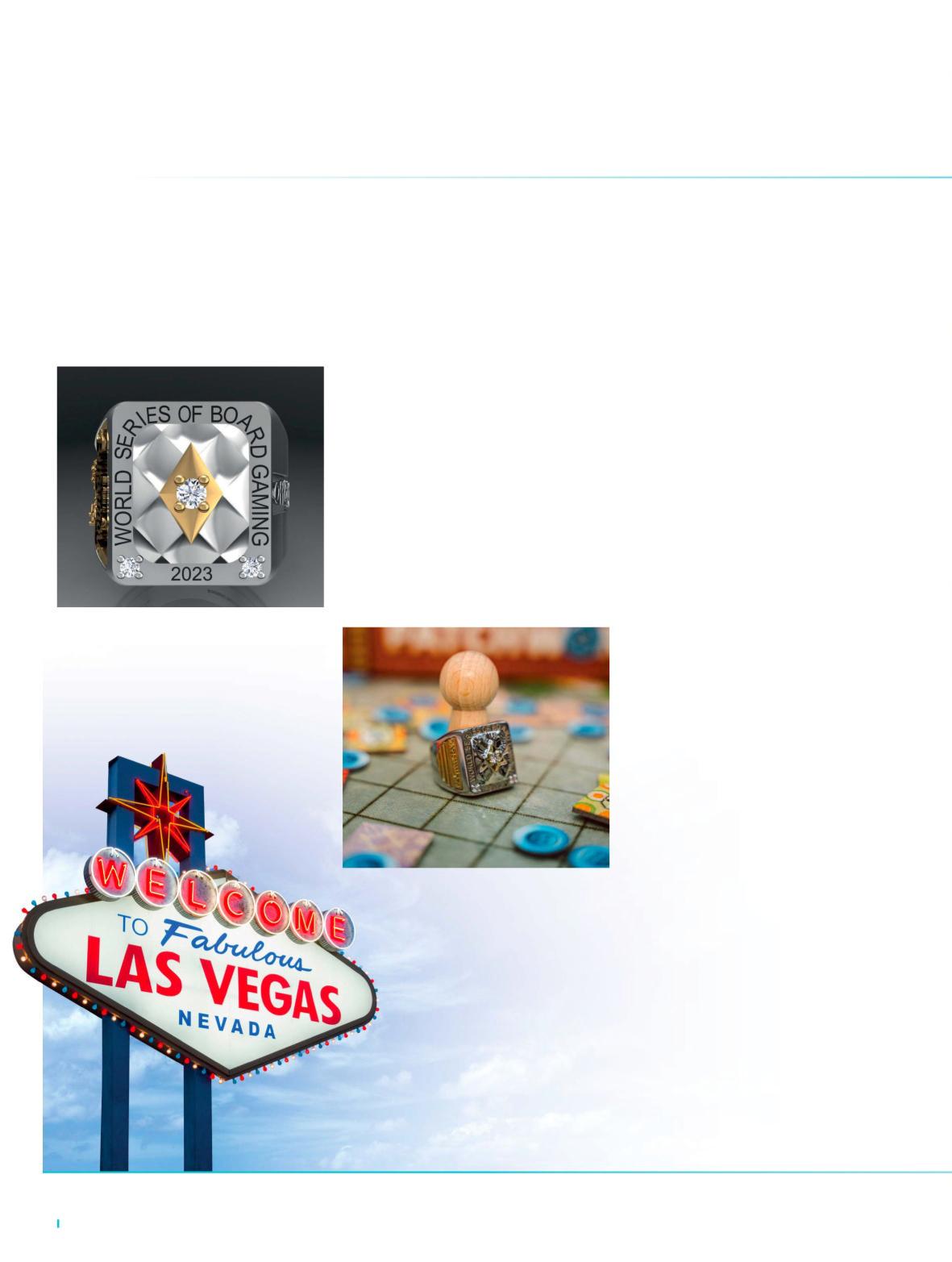
Series of Board Gaming Ring – of which there are 16. Each event focuses on only one board game, which you’ll play through to find the victor There’s one champion of each ring event, who then move onto a semi-finals playing a different game, before the finals.
The list of games to play consists of what he describes as “the top games in the world that are being played from the tabletop perspective” , reviewing ever ything from the Board Game Geek hotlist to the feedback of a committee to see if games could use a refresh in a following year This year, the games include Wingspan, Great Western Trail, Ticket to Ride, Heat : Pedal to the Metal, Ark Nova , Brass : Birmingham, Lost Ruins of Arnak, Ra , Earth, Dune Imperium,
Acquire, Azul, Terraforming Mars, The Castles of Burgundy, Cascadia , and Splendor If you think that’s a wide range of styles, you’d be right – the goal is to appeal to players of all different kinds, and the Ring Events are booked by you, meaning you sign up to play the ones you want to play the most
“Every day there’s a heavy game, a medium game, a light game, and then what we call a wild card If somebody loves heavy games, they can play a heavy game every day.” He explains.
“Each one of the players who come out of that tournament,” Jonathan said of the last two years, “thinks I can’t win, there’s no way I have a chance Probably ever ybody who’s won the Ring Events over the last two years did not think they were going to win at all.”
Winners of the Ring Events move onto the semi finals and finals You don’t get to play a game that a finalist has won with in these. Instead, a random game from the remaining 12 will be drawn for each of the semi-finals the night before Then for the finals, the 16 games of the tournament are back on the table – removing the games the remaining finalists won at the Ring Events, and have just won at the semi-finals. The players each get a secret veto before the final game is drawn and immediately played, and a winner discovered
“It’s funny, they all pretty much veto the same game ” Jonathan laughs, although he later adds that a lot of the time, although many
winners of the Ring Events will study up on the rules of their semi-final events, and tr y to get a few plays in of the game in the short time they have before their final, these players are just as successful as those who draw another favourite game of theirs
“The winner gets almost $50,000 in prizes ” Jonathan explains, making it one of the biggest wins for a board game competition out there. “They get $25,000 in cash They get a stay-andplay for a lifetime, which is worth over $1,000 They get a $6,000 bracelet, and they already have a $3,000 ring ”
Those coming in second receive $10,000, and in third get $5,000, and fourth get $1,000 But the potential wins don’t stop with those. The new addition is what they’re calling the Phoenix Tournaments
“So think of the Ring Games, there are four Ring Games each day If you lose in the first round, here you are – you ’ ve flow out to Vegas, losing the first round. If you throw $25 in, you can play in a second tournament And if you win two games, you win $250 We do that ever y day for ever y Ring Tournament.”
If that wasn’t enough, there are also National Championships taking place in the same location.
“We have Red Cathedral, and The W hite Castle doing their national championships The winner of Red Cathedral gets flown to Essen to play the world championship. I mean, there’s just some cool prizes, right? [and] Dune Imperium is in the Ring Event, but Dune Uprising is a championship. Diplomac y is doing a championship We’re also doing wargaming So we ’ re expanding into what we ’ re tr ying to do is create the place of here’s where you come to compete and here’s where you want to bring your championships This is where you want to do it. Because we have all the players here ”
“We’ll get close to about a quarter million in prizes this year, ” He confirms, not including
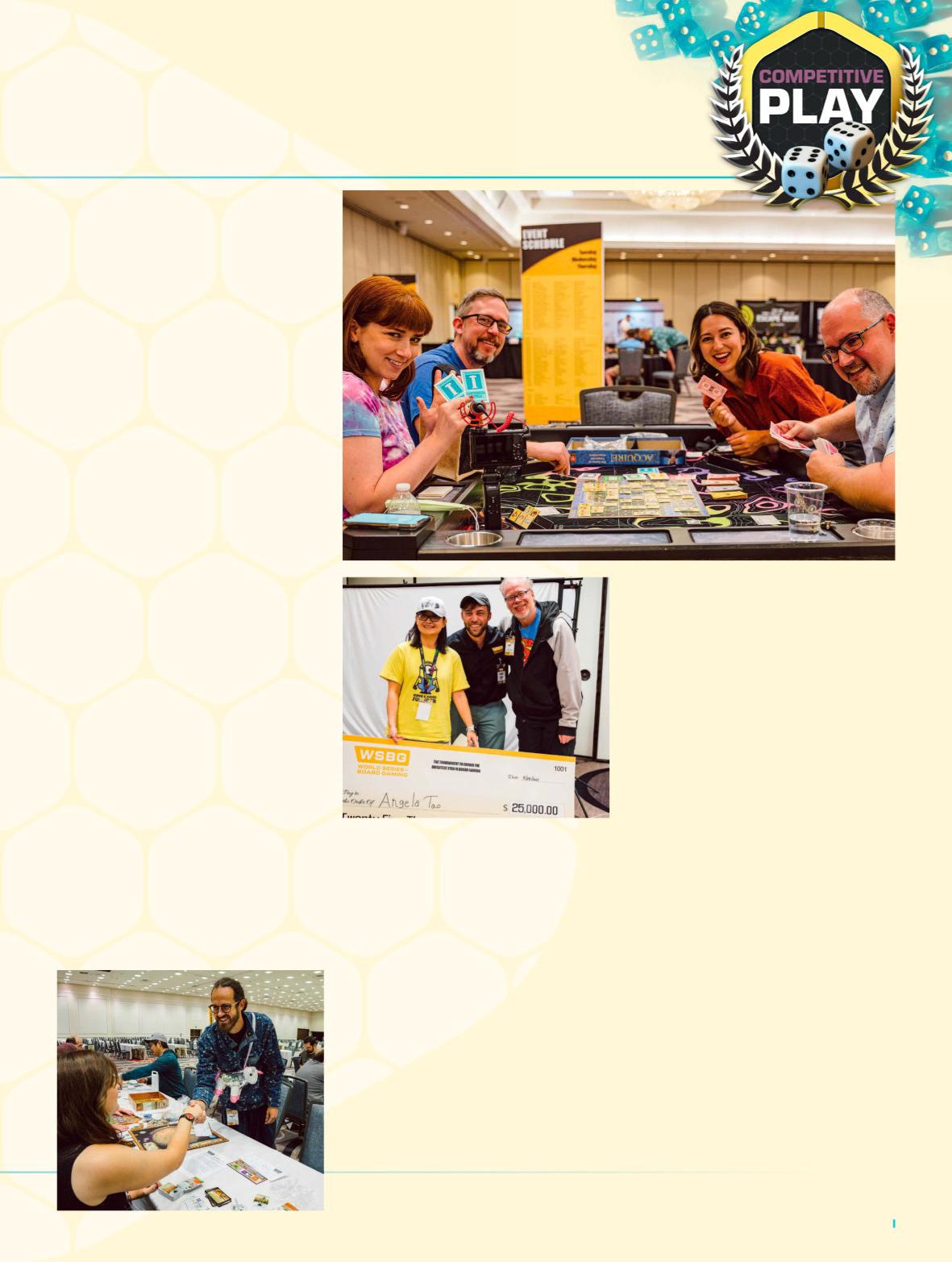
the free promo cards and games you could get your hands on. And if you ’ re not in it for the money? There’s also Open Gaming, of course
Though even that isn’t safe from the generosity –
“During the day out in open gaming, I’ll go out and do a trivia contest and give away $300 in cash that people can go out and just have fun with. We do so many crazy, stupid things.”
You might think that a place for competitive gamers with high prize stakes would be a recipe for poor behaviour, but Jonathan says it’s just not been the case
“The World Series, I will tell you, is a place where we want to see people come in who are competitive but kind People are ver y cordial with each other throughout. And we spend a lot of money to ensure that we don’t [see poor behaviour] We invest a lot of money into
judges, GMs and assistant GMs to make sure there’s no cheating I’ve been in conventions where people are screaming at each other over a plaque, but we never have any of that. If we did, there would be an immediate removal and the person would be banned for life And they all know that.”
The champion of last year was crowned after a game of Splendor.
“Angela Tao won this last year, and she has never entered into a tournament in her lifetime. She got talked into it by her friends. Never played in a tournament And she stood up at the end, it was a great speech that she just said, to all the women in the world, you know, that we are as good enough, not better than any man thinks they would ever be So you need to get here and play. So there is that competitiveness, but it’s a culture of just fun and excitement throughout ”
However, for the Ring Events, “She literally picked four games that weren’t her best game And then in the semi -finals, because remember she didn’t win her best game because she didn’t pick it. She won a different game to get in In the semi -finals her best game was chosen for her Ver y few people who said ‘this is my game and I’m gonna win it’ then win it”
Perhaps the grand prize is in reach after all. The next event takes place on 21st-26th September, where one board gamer will prove themselves the World Series Champion! *
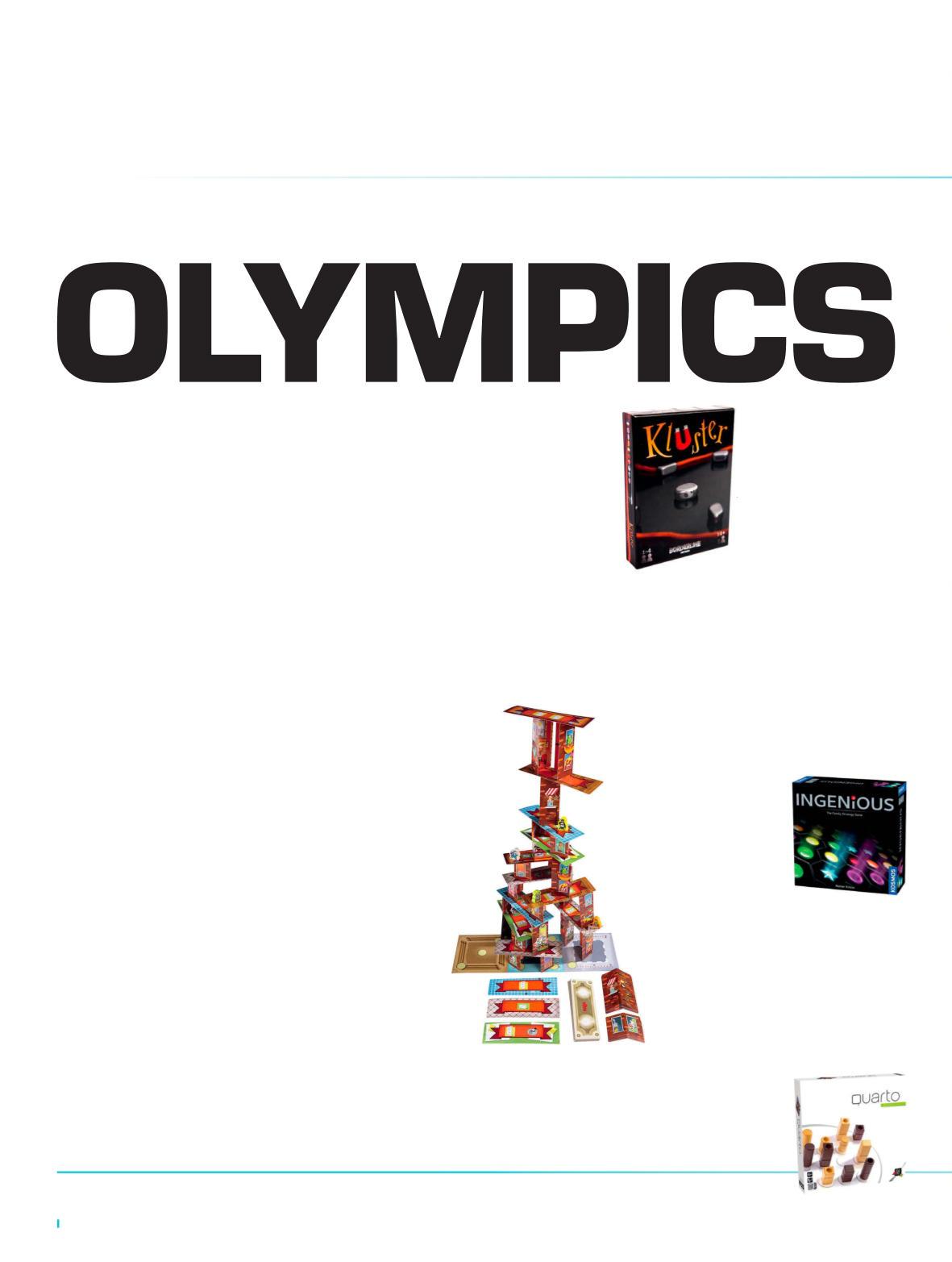
No ne e d to run a marathon, enjoy a board game Olympics!
Writ ten by Chris Lowry
Looming now is “the Summer ” , a short period in England marked by approximately four days of moderate sunshine. It’s also a time when people often spend a week or two away, going on holiday with family or friends. This makes it an excellent time to host The Board Game Olympics : a series of competitive events to find out who amongst you is the greatest sportsperson in the whole world! (It should be noted that traditionally, the Lowr y Home Olympics are at Christmas ; however, a summer season is also well suited to such sportive shenanigans)
If you are aiming to decide, definitively, once and for all, who is the best at board games ; you are going to need some competitors. I would suggest selecting a small selection of people in your family or holiday group
Explain that you are going to play four games over the next few days and that you need their enthusiasm and participation I’d also recommend pushing quite hard - my experience is that sometimes it’s Grandma who claimed to be completely uninterested that becomes the most competitive, talking smack about other players and tr ying to smuggle victor y tokens in her handbag
I find the best option for the timeframe is holding one event a day, with an intro day where ever yone gets to play each of the games to familiarise themselves with the rules Friendly games don’t count towards your
score, but they help prevent seasoned gamers from gaining automatic success
For the events themselves, there are a number of options ; I’ll give you my simple version. You have four categories, with a game in each, and a fifth ongoing game running throughout the entire Olympics Awarding gold, silver and bronze medals in each event gives competitors the drive they need to succeed, even if they turn out to be made from tin foil and string.
The first fight is based agility. For this, I would suggest something of reasonable length, or other wise a best-of-five challenge with short games.
This game is fairly short, but with just enough depth to it to still be considered a “ proper ” game. Players must build up towers from folded cards, following the special action on the cards, and moving a wooden rhino piece a point, placing it higher up on the preciously wobbly tower It feels like a more intelligent Jenga, although it still hurts deeply when a tower crumbles away into nothingness and you lose
This feindish game of magnetic torture involves each player laying down their magnets one at a time. Easy enough, except that if you place magnets too close to each other they snap together If that happens, you have to pick them
up, and you can only win by clearing your hand This game is lightning fast and infuriating; the best of five will determine a dexterity winner
The next categor y is for strategy games. Unless you want a full-day tournament here, or some complicated rules, I’d suggest a game that will let ever yone play at once, or one that’s extremely short. Now, I would recommend staying away from old classics here: you might be tempted to choose Carcassonne or Ticket to Ride; and whilst that’s a great option if none of you have ever played before, there’s just too much advantage to those with prior experience
INGENIOUS
It can be scary buying a new strategy game you ’ ve never played: Ingenious is a classic that I’ve introduced to tens of people, and everyone has always enjoyed it Get colours in lines to score points, do it faster than everyone else; if you max out a colour on your scoreboard, shout “INGENIOUS!!” and get an extra go. It’s also had a recent reprint, so you can find it later in this very magazine too!
ALTERNATE OPTION: QUARTO
Gigamic make lots of equally challenging, deliciously woody strategy games In Quarto, you tr y to build four-in-a-row of pieces ; four of height, colour, or various shapes
It’s super-fast, so a best of five, feeding into a knockout tournament would be ideal here
Forming your competitors into teams for this one, each gets the opportunity to gain a medal, and to forge victor y for whatever arbitrar y division you make between them ; family name, girls and boys, nerds vs geeks ; the options are endless
I think Vlaada Chvátil’s Codenames is possibly the finest team game for being easy to pick up, but impossible to master. One person must use a single word as a clue to help his teammates select one or more cards from the table “Snow” might
Of all the categories, I think there must be more card games out there than any other type of board game Again, I would definitely suggest playing something that none of you have played before
6NIMMT!
From the same designer as El Grande, 6 Nimmt! means “six takes!” in German, and thus is explained the central conceit of the game Players tr y to place their cards, numbered 1-104, in rows, using simple

refer to “Mountain” , “St Bernard” and “Clouds” - or it might not! Choose the wrong card and risk helping your opponents, or even instantly losing the game
For something with a little more crunch to it, Captain Sonar lets your teams hunt each other down in the ocean, firing off torpedoes and attempting to hide from radar Each player has a specific role, and specific mini-games to complete in order to help the submarine to success A much higher risk of death than in most Olympic events, but entertaining nonetheless
placement rules However, if they are ever stuck with a card that would make a row have six cards, they pick up the entire row. Tr ying to guess what cards ever yone else will play next is challenging, frustrating and fun I’d play this in progressive knockouts - all players play, then the loser is knocked out : then play again, until only two are left
This event takes place throughout The Games, only counting as complete during the final award ceremony.
This friendship-ruining game gives ever y player a wallet of six things they have to achieve, such as “Get someone to hum a tune for you ” , or “Make a promise to another player and get them to comment when you break that promise” For the next few days, ever y action anyone takes should cause huge suspicion, as you fear the words “ You just got got!” If players finish all their cards, first to win gets gold, other wise compare progress at the end and award accordingly.
This is a tasty little set collection game where you tr y to build the most valuable village. Villager cards are claimed and laid dow n in a tableau, and points are awarded in two market phases. You can play Villag ers w ith up to five players, so all together might work Other w ise, each player has a point score, so you could have two games w ith different players and compare points for medal rankings
Yes, I know, it’s not a board game; you just shout out if you see a yellow car But still, there’s something about it that gets under your skin, and it adds a continuous element to your competition There’s no punching each other if you win here, just keep a tally of all the yellow cars – or indeed, whatever you choose to make your yellow car equivalent, whether it’s another item or a phrase– and the highest numbers get medals *
G
a favourite game?
Want to play it a lot more?
Writ ten by Chris Lowry
Setting up a league can be a great way to take your enjoyment of a game to a different level. It’s also a brilliant opportunity to share new ideas and gameplay styles and to build up a core group of people who want to get stuck into the game just as much as you Plus there will be lots of opportunities to make a spreadsheet!
The classic games that lend themselves to tournaments are reasonably short, abstract games; things like Backgammon, Go and the obvious classic: Chess, which has been played in tournaments since the first ever in Leeds in 1841!
Others that lend themselves thematically and mechanically to long-form competition are “sports” games like Blood Bowl or Heat : Pedal to the Metal These often have league rules baked in, with things like team skill progression and car upgrades actually adding significantly more depth and choice than the standard one-shot experience
However, there’s no reason that you can’t use literally any game in your own homebrew league or tournament From Carcassonne to Cash N’ Guns, the vast majority of what we play is perfectly built for competitive ranking; there are cash-prize at the World Series of Board Games for War of the Ring and 18xx games, after all.
The biggest challenge in any homebrew tournament will be getting enough games to actually complete the thing Think about it ; in a standard eight-person round-robin league, you’d need 16 games for ever yone to play each other Scheduling a mate to play
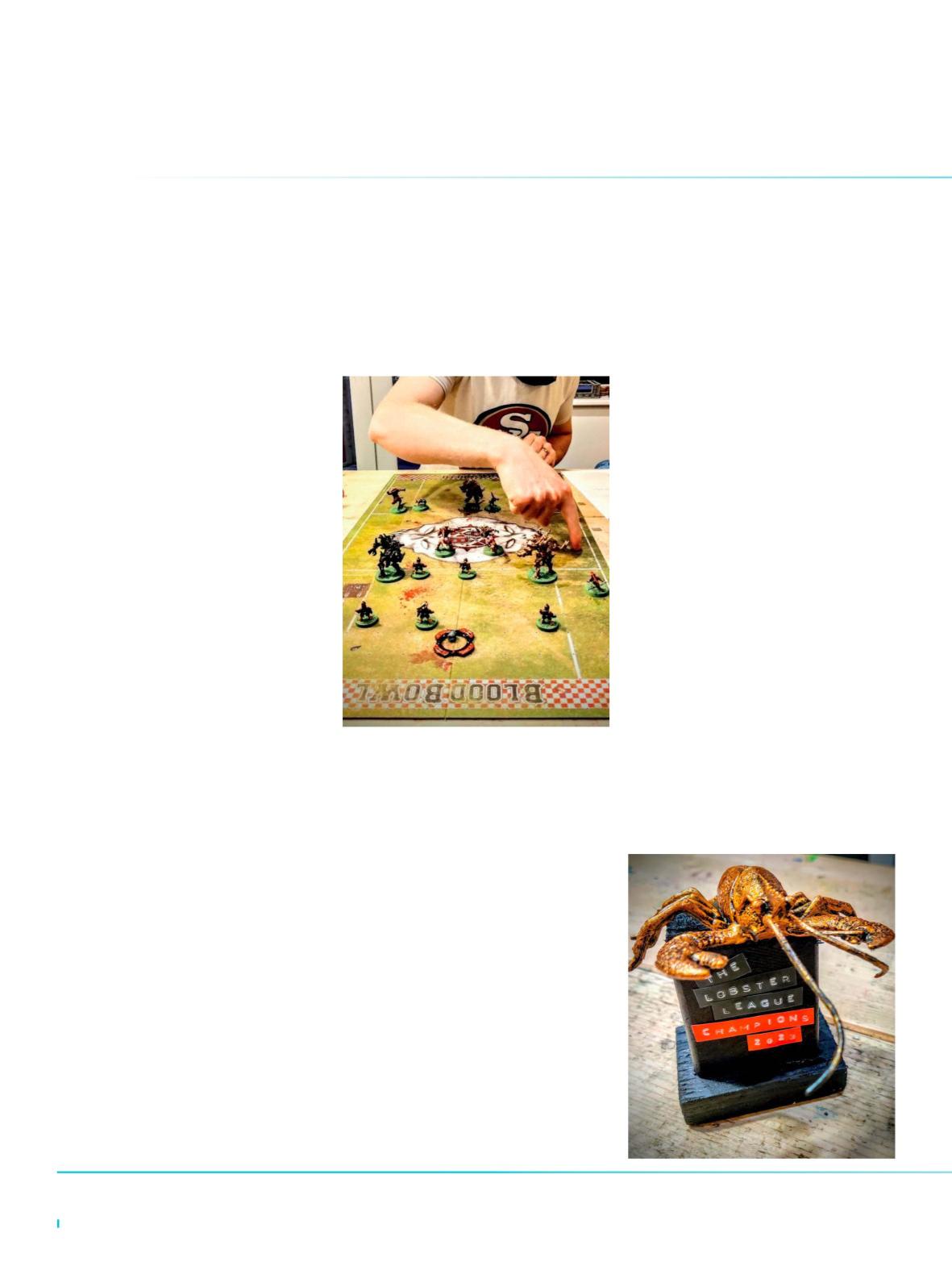
just once is hard enough ; there’s a reason that most leagues fail The single most important ingredient for a successful league is committed players.
One approach I’d recommend, to start you off, is a simple knockout tournament
The reason for this is that the total number of games that you play is significantly lower ; with 8 competitors, after one game, you have 4, then 2 facing each other down in the final; a total of 7 games It also means that there’s a definitive end point - everyone can meet up and watch the final game, cheering and eating crisps.
If you do go with a more standard roundrobin league approach, it can be helpful to use a points system that rewards people for playing, even if they lose. I suggest 5 points for a win, 3 for a draw and 1 for a loss ; this encourages people to play; even if you lose disastrously, you ’ ve still scored more points than someone who didn’t play at all
An important aspect to consider is the medium you use for games
We’ve advanced tremendously on this front in recent years. Whilst I still hugely prefer face-to-face gaming over anything else, it can’t be denied that options like Tabletop Simulator or BoardGameArena provide quick online options for checking off a quick game.
It also opens up your league to players who don’t live geographically close to one another, which enables you to widen up your tournament to a much larger group Plus, it helps to reduce scheduling conflicts, since bashing together one game quickly online when you have a gap is much easier than reser ving an entire evening to play
Finally, an unnecessar y but enjoyable addition for your league? A decent prize.
Get ever yone to chuck in a few quid and buy a silly trophy Or, even better, make your own: our recent Bloodbowl tournament had a glorious trophy, made from a plastic lobster nailed to a piece of two-by-four and painted gold Not just that, but we all contributed some ridiculous lore and a new historical landmark was born into all our gaming worlds You could do the same! *
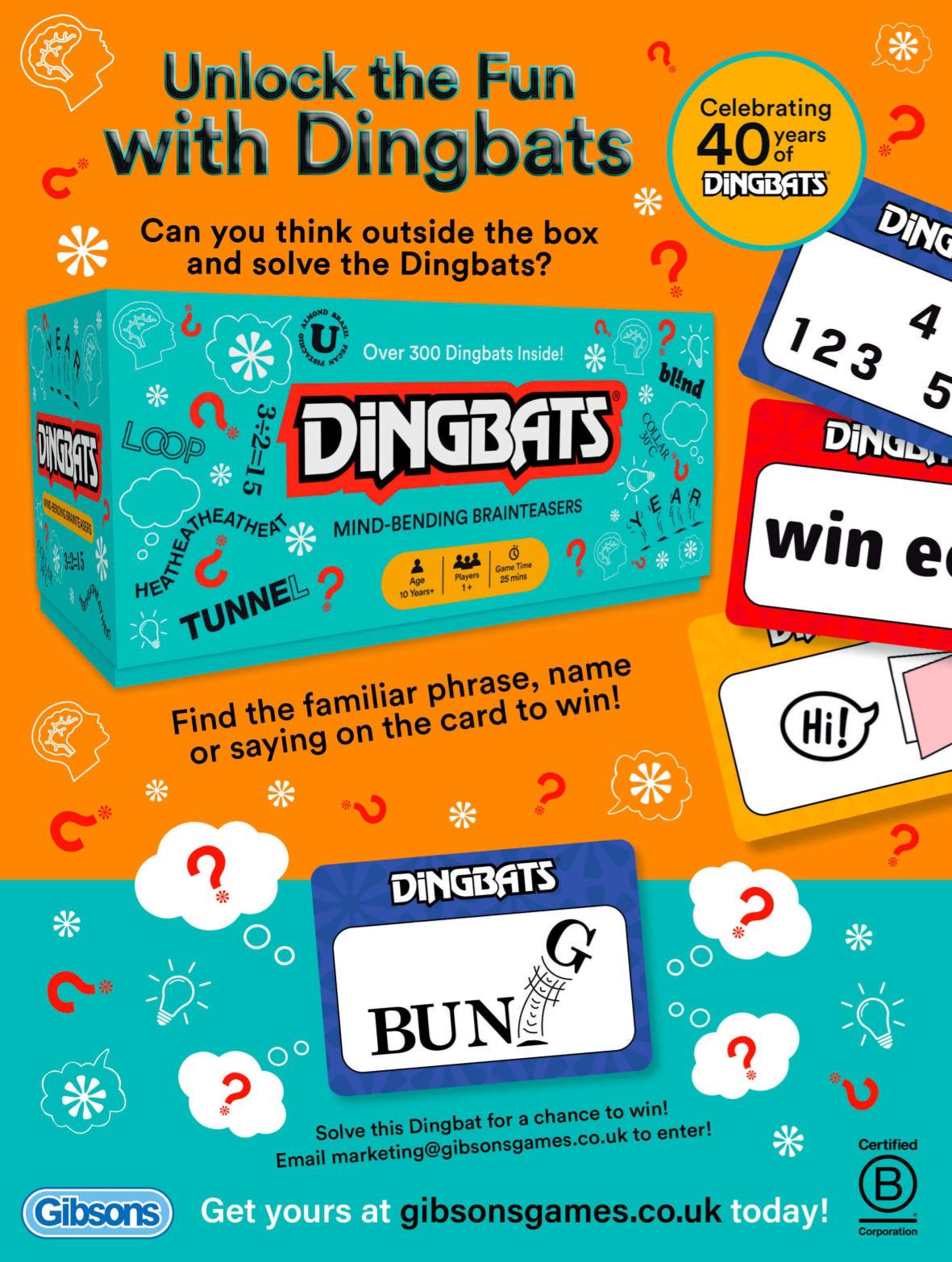
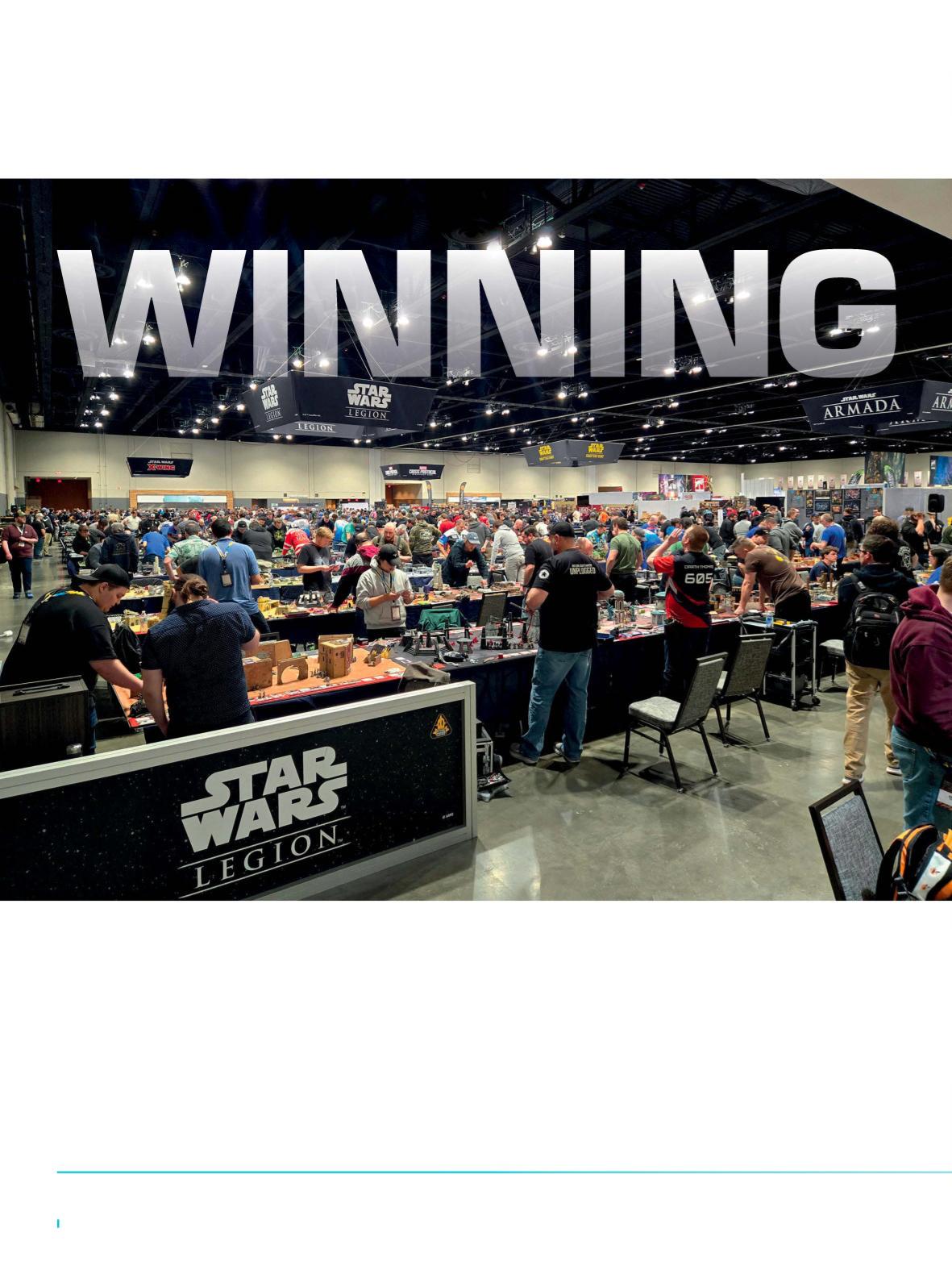
When you enter a Tournament or attend Organise d Play events, it’s all about winning . Right? Well, not entirely.
Interview by Charlie Pettit
Will Shick, the Director of Product Development, seems to know ever ything about Atomic Mass Games From the games themselves, Star Wars : Shatterpoint, Armada , X-Wing, and Legion to Mar vel: Crisis Protocol to ever y other aspect along the way We’ve seen the incredible turnout at places like Adepticon for tournaments, so he seemed the perfect person to find out more – from the ethos, to the changes, and the plans behind the scenes for this huge miniatures game publisher
“What we do at Atomic Mass Games is we make what we call lifestyle games. ” Will begins, an aspect he says touches ever y part of development He defines them as games that you end up developing communities around, as you ’ re investing so much time into them
“We want to make sure that we ’ re respecting the time, effort, investment, and energy that a player is putting into their collection because they become an extension of you You’re assembling these things, you ’ re painting them, you ’ re engaging, you ’ re thinking about your favourite characters, you ’ re talking with
your friends about how you want to play this game…Our mission doesn’t stop when we put the game on the shelf Once you get that core box , you ’ ve just taken your ver y first small step on a much larger journey that’s going to last across the next 10, 15, 20 years of your life, we hope How? Well, we have to make sure that we ’ re engaging the community and giving them ways in which to express and play with the things that we ’ ve provided ”
“Organised play is the follow-through,” Will says, detailing how their goal then becomes ensuring they balance different play preferences and describing a video game as the example – you have your campaign opportunity, your multiplayer, your narrative, reflected for tabletop in events that let you explore these in new ways. Atomic Mass Games, particularly since Covid, have been arming local game stores with ever ything they need to explore these different options with their gamers, as well as feeding this into their huge national and international events
“Those things add richness and value to the overall game experience because they give you different ways to play with the game that you love or to engage in the thing that you really enjoy And certain people will like certain things more or less than the other ones
And then you always have that basic game expression to go back to. That’s how we ’ ve effectively established our Organised Play We want to make sure that we ’ re supporting tournament play. We want to make sure that we ’ re supporting narrative play We want to make sure that we ’ re supporting league play ”
Becoming the World Champion of a game is a considerable accolade, but that’s not entirely the focus of Atomic Mass Games’ play
“What we know from experience is that a lot of players aren’t necessarily interested in being the very best there ever was Well, every player likes to win Who doesn’t like to win? Victory always feels sweet But for the vast majority of players, the thing they enjoy the most is simply playing the game and getting to interact with their opponents and all of that stuff, and engage
in community at the store in a group. ” We joke that our own experience with tournaments is linked to having a fun time, not a long time, regularly crashing out early, but enjoying the process and learning something new every time
“We wanted to kind of double down on that idea and say, okay, winning itself is already a huge thing What you discover is that the people who are really driven to win, [for them] it’s not the award, it’s the act of actually getting to the top of the mountain that matters ” And indeed, that they’ll continue to tr y to get to the top, and so the physical trophy isn’t the end of their journey nor necessarily the point
“The people who are tr ying to win an event to get the cool prizes are your average players. The people are just like, I love playing the game and I want more cool things to use when
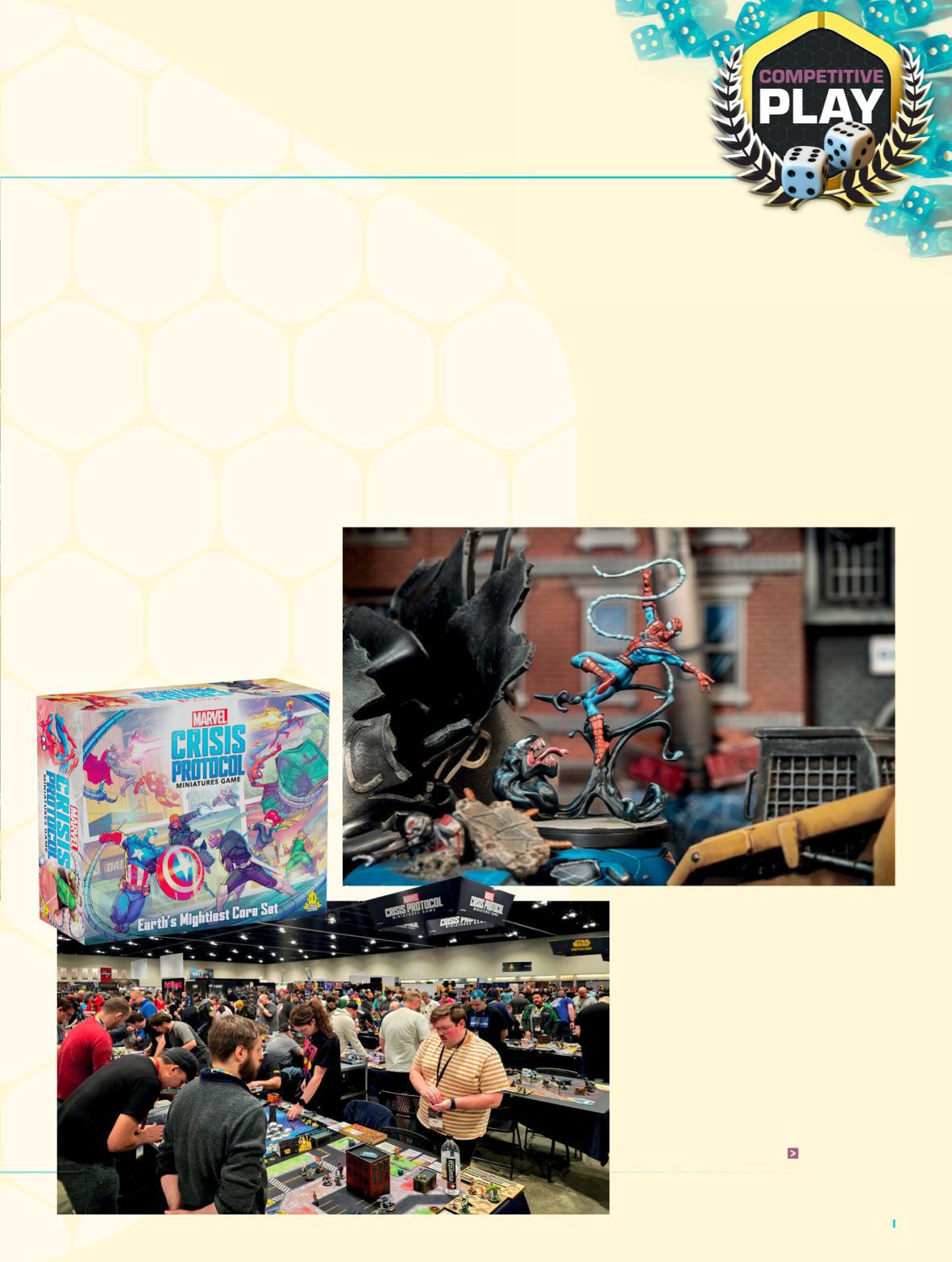
I play the game and isn’t that really neat? So our philosophy quickly became, why would you put all of the cool stuff at the end, or at the top of the mountain when only one person get there? Why wouldn’t you spread that out and say, if you ’ re engaging in playing the game, it doesn’t matter whether you ’ ve won or lost because ever yone has technically won, right? You should get rewarded for that So our Organised Play has a system whereby ever y player each round typically gets a reward. And instead of front loading all those to first, second and third, instead the entire field gets that. And then we save a couple of like recognition awards or really fanc y things, like the championship trophy ”
Of course, that feels surprising given the sheer size of the World Championships Adepticon hosted much of them this year, and with huge swells in attendance numbers, it’s looking to increase only further A chunk of that might even be related to changes Atomic Mass Games have made from their predecessors, as a result of this ethos
“The World Championship circuits were set up before we took over ownership of the Star Wars games from Fantasy Flight Games ” Will says, which took place in 2020. We discuss the impact on tournament play this had, given lockdowns at this time and restriction on gathering numbers, and that returning to normality from it brought a few changes to bring to where they are now
“Effectively, they created a world tournament circuit. They did a ver y classic golf-style event or tennis-style event ” Will summarised this as open events you could compete in, with invites to Worlds awarded to the high placers It was a way to show your skill for players that way inclined, and to get some impressive rewards. However, you could invest a lot of time, and if the dice weren’t in your favour, or something went amiss, you could end up with ver y little.
“Obviously, for us, that wasn’t really in line with what we wanted overall for the game experience,” Will said, leading to a series of changes.
The first big move was to change the Open structure No longer did you have to go to a regional event in order to tr y to qualify for Worlds, but instead you could earn your invitation from your local store, using the store kit they created. This meant that geographic region or ability to travel wouldn’t impact your ability to qualify It also gave players a bit more of a chance with a lesser investment, letting more people play for fun before having to commit to significant travel arrangements, and additionally helped build communities around stores. For the end event, it increased the number of players notably
“The other thing that we did is we removed the idea of tiered prizes. So last year was the first year that we unveiled our new system for convention support and big event support And our prize wall. So, if you think about it like an arcade style, ticket system – effectively you play games, you get tickets, and then you get to go to the prize wall and you can spend your tickets on cool stuff We effectively boiled down the idea that some people come to conventions and
they just want to play casual, fun games They’re not there to play in a Worlds Some people want to play in worlds, but they also want to play in some fun events And so we basically distilled down the player experience – every time you play a game, you get this number of tickets and then the prize wall economy was built around that For all those people who would have never won a Worlds event and gotten all the cool things, if they engaged with us and played games with us the entire weekend, they would wind up with an equal number of tickets because it was all based on effort, on time invested, which meant that those players now had the opportunity to get all of the cool things they would have lost out on just because they happened to lose a game Overall, the pressure to win in order to get cool stuff was gone The only pressure was to just play. Play as many games as you want and play in the events that you want and you ’ re not going to get locked out of anything.”
With Organised Play at the heart of Atomic Mass Games, and a levelling system that rewards your participation, not just your success on that day, we asked what considerations or tips Will would offer to new players, debating their own foray into Organised Play
“Don’t worr y, be happy. That’s it.” Will jokes. “The big thing is, go in with your expectations I think the worst thing you can do is to view losing as a failure. It’s not, because Organised Play gives you as a player the opportunity to learn Failure is the greatest success, because failure means you ’ ve learned something. It’s why people like tournaments because they get to challenge themselves and see their skills
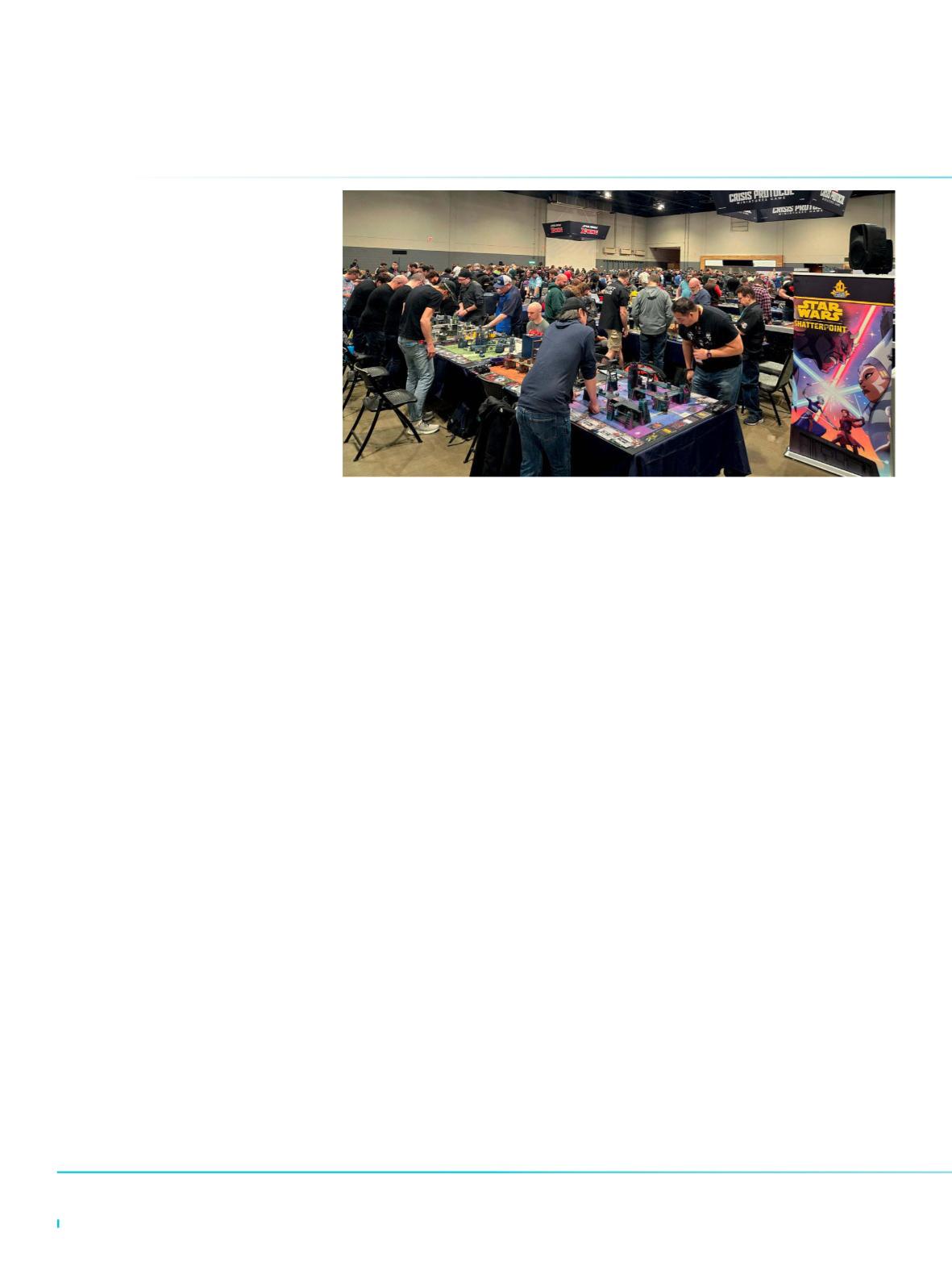
grow And you can actually watch that happen It can make you a better hobbyist because you ’ re going to see all these people and their personal hobby work and their painting And if you sense something really cool that they did, if you compliment them and say, how did you do that? They’re going to give you all of the details Even the most professional artists in the miniatures hobby that I’ve ever met, they have no secret ingredients If you ask them how they did something, they will tell you in expressive detail how you can do that. Because it’s all about sharing and it’s all about building each other up Go in and just put the worr y about doing well or doing poorly aside Don’t worr y about your final standings. Worr y about living in that moment and getting all of the good stuff that comes out of these games And if you ’ re looking to tr y to develop a community in your area that doesn’t have one, create an environment that’s a party ” He goes on to detail building excitement in areas that aren’t around winning Maybe you do an award for the best sportsman, or a surprise one for people who are always skipping out on their turn for bathroom breaks, or building up the excitement for someones first ever win
“Make sure that ever yone is just engaged and having a blast and don’t lose sight of the fact that we ’ re all doing this for fun The goal for our Organised Play is to provide the foundation for that. We provide the tools and we tr y to provide as much guidance as possible But then ideally, the community takes those tools and they make it their own and they make it the thing that’s going to help grow their area and grow their player base ”
Don’t worr y, be happy indeed! Check out your local game store for your closest event, and get involved *
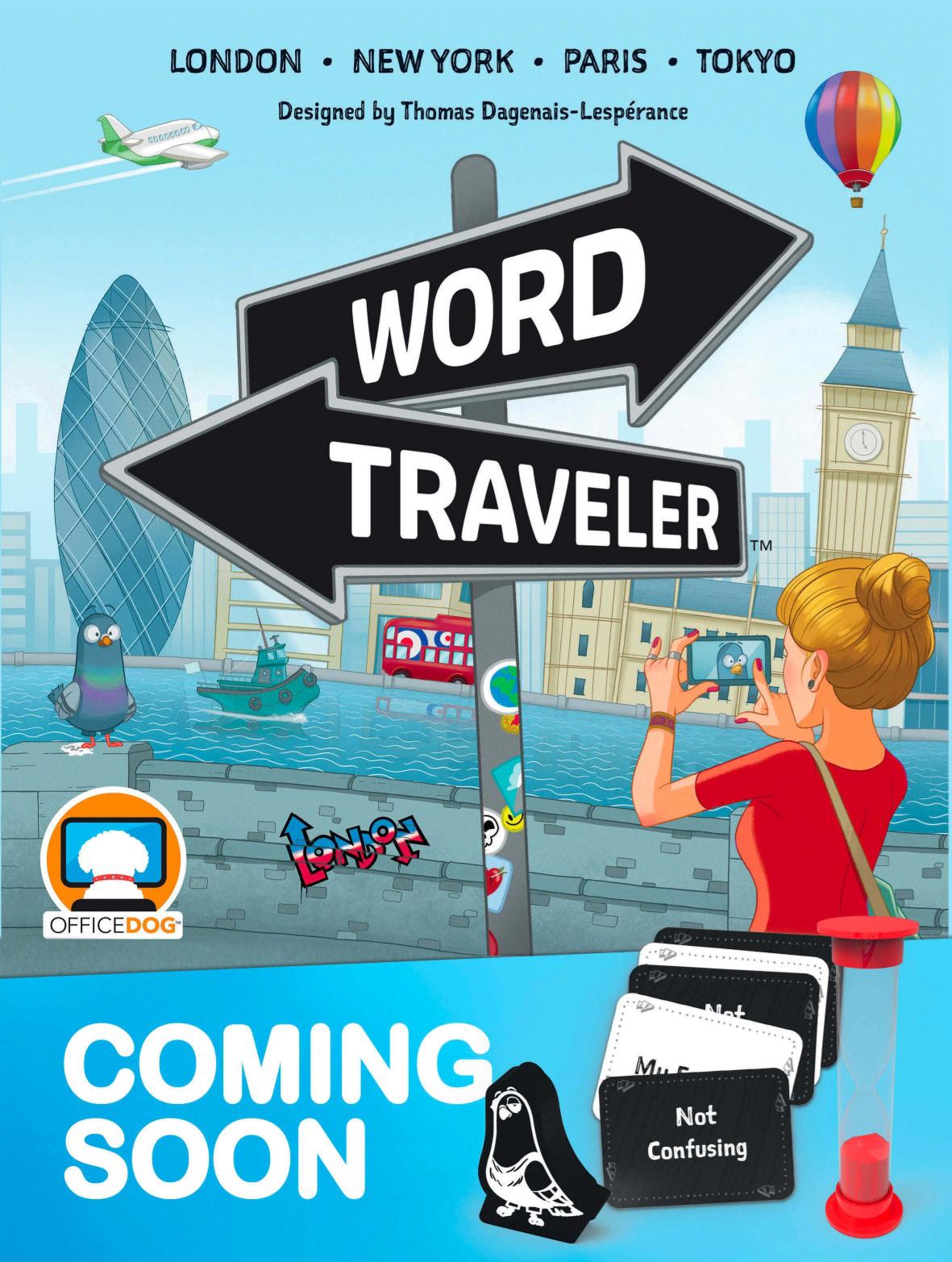
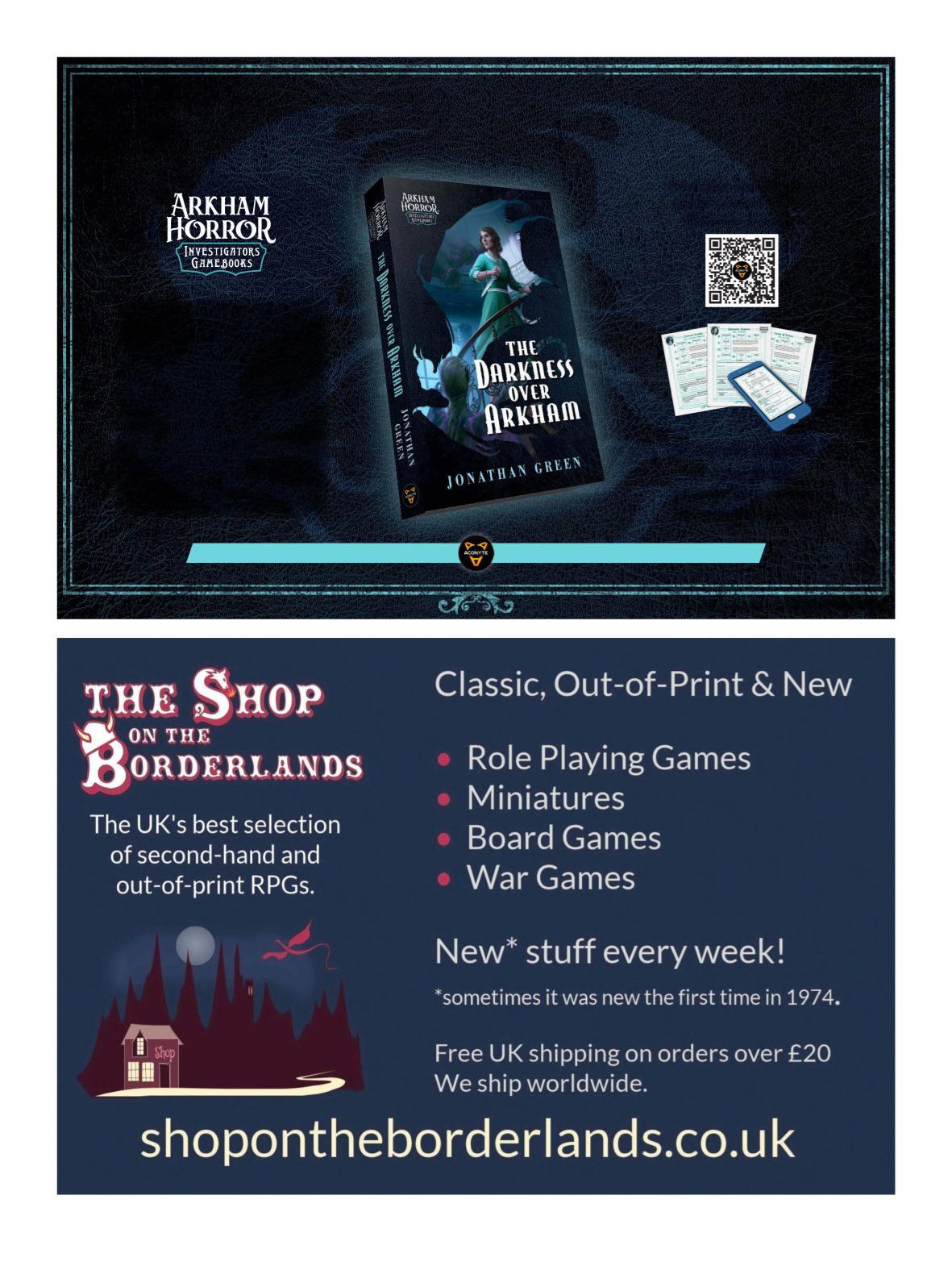
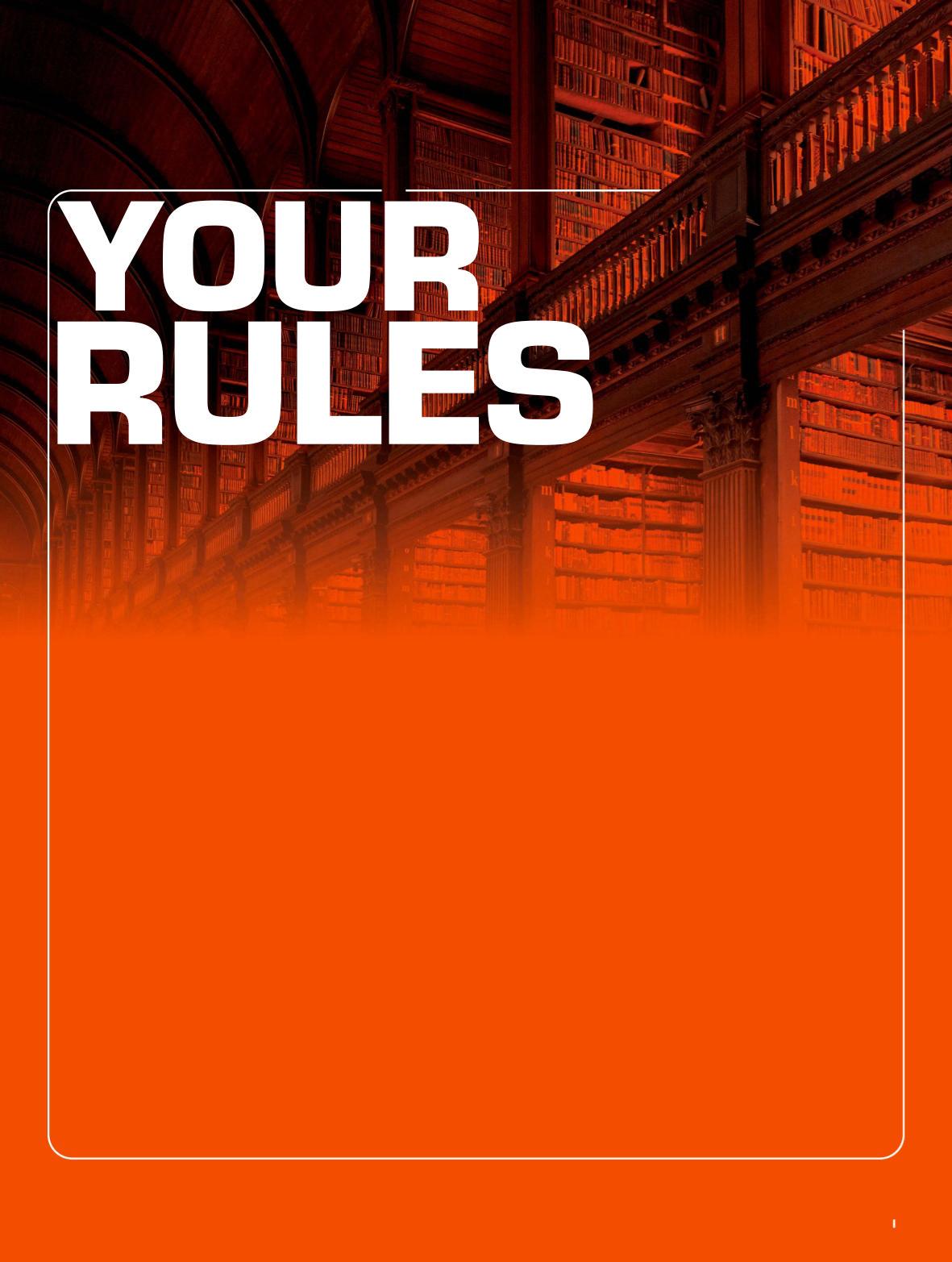
s
way y o u s
fi t ! Writ ten by George Chrysostomou
We start in a library, one of the largest in the realm Full of countless magical texts, novels of great value, and scrolls that hold the knowledge of the elders, this library also hosts an unusual annual challenge Books are stacked as high as the eye may see and shelves drift off into the distance, seemingly out to the infinite
In the centre is a stage, the foundations of which are built from the rocks that hold the ver y first stories, car ved into their outer faces. Brave souls will perform on this stage, for all to see Their words echo through the building, their words bouncing off of the books that line ever y wall, and even the ceiling This place is a sight to behold, but it was also designed for nefarious purposes. Dark ideas may be whispered into your characters’ ears, the thoughts of authors both sinister and dangerous, whose works live on and give off a dark aura
This is a librar y without a librarian, a rarity in the world in which you inhabit But, Brooker has nonetheless fashioned themself into a custodian of sorts, protecting the pages that the librar y is so famous for and guiding the seekers of knowledge to their much-needed destinations Perhaps enamoured with the power that the librar y holds, or merely acting as a humble ser vant, Brooker has been a charismatic mainstay of the librar y for generations yet appears to have not aged since the day they stepped foot in this place of stories.
The librar y is also known for a tournament, soon to be set out, whose champion has smashed the competition for the past seven years Amassing knowledge and influence thanks to the gifts bestowed upon such a victor, Lamarez is a silver-tongued pariah who keeps to themselves
Each turn of the year marks the great poetr y tournament, an artistic competition the likes of which are seen nowhere else. Those who enter such a perilous affair must duel, one-on-one, in a battle of wits and brains The challenger who weaves the right words and pursues the perfect poem will be the victor To roast the opponent, to make the audience feel; that’s the aim of this powerful performance. The prize? A text of the victor ’ s choice from this great librar y One that may hold secrets and wisdom never before revealed to the world. But be warned, for there are sinister forces at work attempting to influence the fates of those who enter
• Take part in the great poetr y tournament, battling against NPCs and player characters alike to claim the prize.
• Investigate the source of Brooker ’ s power and be war y of the custodian influencing the great tournament for their own designs
• Battle against Lamarez, who may turn out to be a friend or foe What kind of knowledge have they been amassing?
Whether you reinvent this campaign to suit an ongoing narrative or use the structure of this concept to build out a full adventure, these ideas are in your hands now. Apply your own characters and settings, come up with your own twists and turns, create a prize worth fighting for, and have fun writing comedic, romantic, or altogether striking poetr y to compete in the tournament This is Your World, Your Rules, so make the game you’d like to see *
by Charlie Pettit
Competitions and board games can go hand in hand After all, from the earliest games we ’ ve found to the modern marvels, we ’ ve been declaring someone victorious. The element of winning at the end is one of the first questions we ask of a new game But what about when you try to make games where the competition isn’t always the focus?
I sat down with Chris Birch, who is the co-founder of Modiphius Entertainment, for whom competition doesn’t have the same drive As well as co-founder, he’s also the Chief Creative Officer, which he describes as meaning he comes up with the mad ideas Those ideas started with roleplaying games, from Mutant Chronicles to Conan, John Carter to Dune, and now Fallout. They evolved into board games, like Thunderbirds and The Elder Scrolls V: Skyrim – The Adventure Game, but Chris says his biggest move was into miniatures, where Fallout : Wasteland Warfare doubled the size of the company
The company just keeps growing, with recent announcements including Mass Effect and Discworld licenses “We’re probably, I’d say about one third miniatures, and two thirds roleplaying games and board games ” He says of the company at the moment “But I grew up as a wargamer and playing D&D, so I think we just love them equally ”
Chris remembers the tournaments of D&D, but says that it was the group element that caught his interest and led him down the path to where he is today.
“This whole idea of playing with people around the table, trying to solve a problem together was just mind -blowing.” He says of it “I just couldn’t see why people would want to compete, having now got this game where we can all play together. That shaped a lot of my early ideas” He said he felt similarly when it came to wargames, but both were hindered
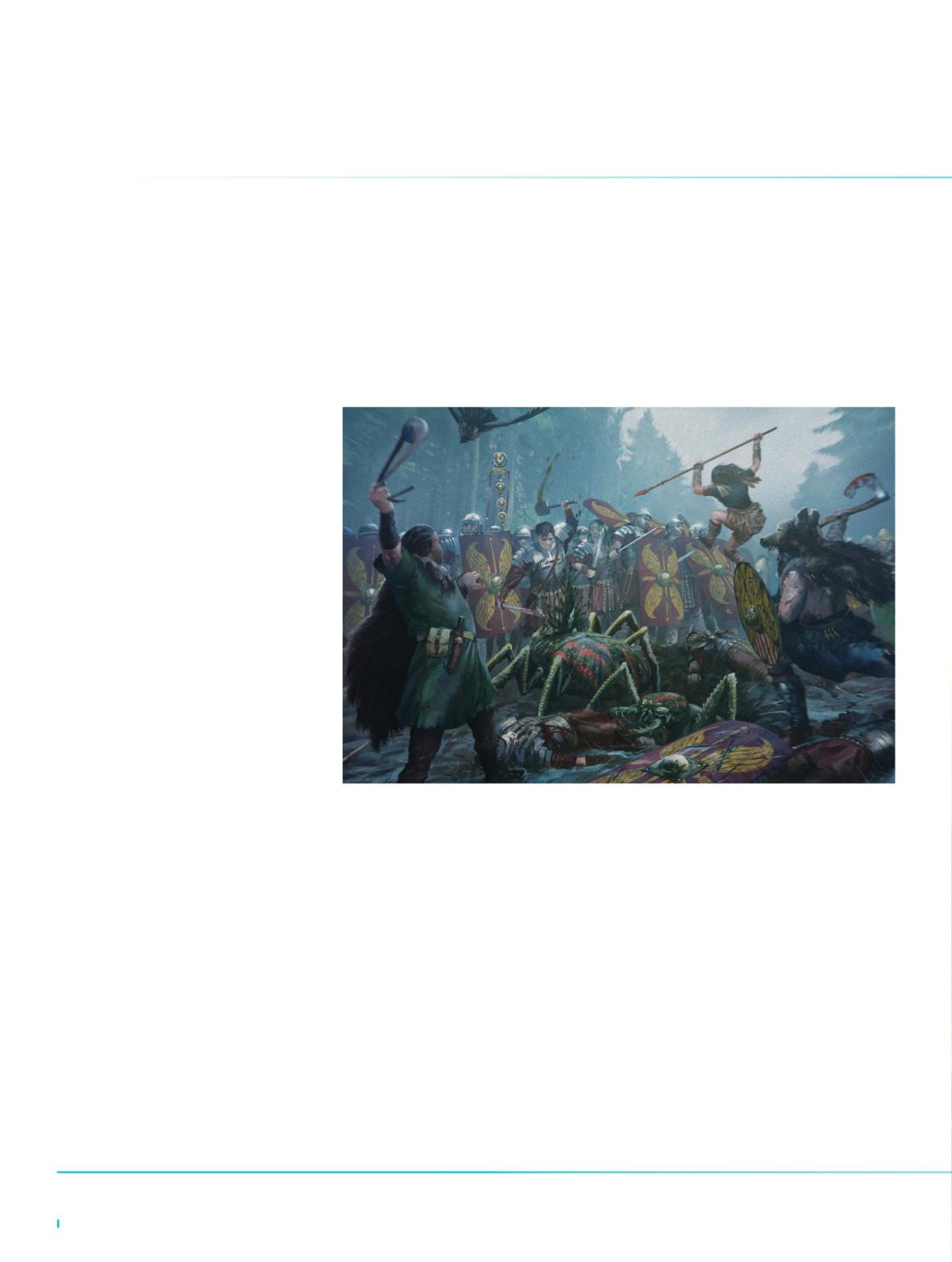
by not having a huge amount of players around him He began designing ways to play the games solo, or learning how to play it against himself
“Either way I won, ” he said of it. “But creating a story the story was probably the most important part of playing the battle I never played balanced games. I think balanced tournament games are the worst because it never happens in real life No one goes to war when they’re about an equal match. [Instead] It’s like you won at least three times or you can catch them in an ambush That’s an interesting battle And I want to be on the other side, the guys who’ve only got a third of the enemy force. How are we going to survive the day?”
“John Webb, who’s our head of creative, put it ver y succinctly that miniatures games are typically two people that go to play a game and one walks away happy Unless you ’ re playing just friendly, silly wargames, games typically descend into ver y competitive natures I wanted to do something different I wanted
to bring my life experience of playing on my own or wanting to play with friends My young roleplaying experiences Why can’t we do that with wargames?”
Chris began with the idea of making a wargame event in a store where ever yone wins, creating a fun experience with a great atmosphere He explains that you wouldn’t then need a judge, nor would people be inclined to not help others learn the rules.
“I love positive atmospheres within games, the problem solving and also seeing games like Pandemic, the groundbreaking board game that brought cooperative gaming to the board game space So when I came to do Fallout, it was like all this stuff in my head and I know there are lots of people who don’t have much time to game They don’t have a whole eight-hour day to get all the miniatures out and play. So why can’t we have a game where they can play on their own that’s actually fun? That’s really compelling and really exciting?”
Modiphius Entertainment has recently launched Cohors Cthulhu: Tactics, a horrorthemed solo and co-op adventure wargame Adventure wargame, Chris explains, splits it apart from simply giving a reason for the battle (“I need to destroy your army so I can rescue the princess” he gives as an example, with stor y to play as to why or how), but actually has a narrative arc that sees you making difficult decisions, perhaps gaining something in the war by losing in the battle.
“Wouldn’t it be interesting if it was more fun to lose the game? Every game has, ‘I’ve got to win’ , but not many games have a ‘but why don’t you lose because of this?’ Because there’s the campaign game storyline that you ’ re trying to evolve, that interaction and then having other players on your side of the table We can discuss the rules together, we can discuss the story together, the strategy, why are we doing this, which forces are we bringing,
rather than sitting across the table, [saying] ‘haha, I’ve beat you with my dice again’ . ”
“What we ’ ve done with Cohors Cthulhu: Tactics is we ’ ve streamlined the rules right down so the player doesn’t have to remember too many numbers The decisions are fun but not complicated There’s not a lot of modifiers because when you ’ re on your own, the mental overhead gets a lot bigger. I’ve tried to really streamline again and again So it should feel like Roman soldiers fighting monsters, but it’s nowhere near the level of detail that some of the other wargames do with Romans ”
Chris explains Cohors Cthulhu: Tactics sees you randomly create two missions. “One mission [could be] a patrol, and you ’ ve got a rescue a captive and then the other one is an assault, we ’ ve got to take out this enemy monster and capture this guy And then there’s a couple of little side objectives and then a story element like, ‘If I can find the witch, I can find out what my dreams mean ’ . But that [mission has] an old
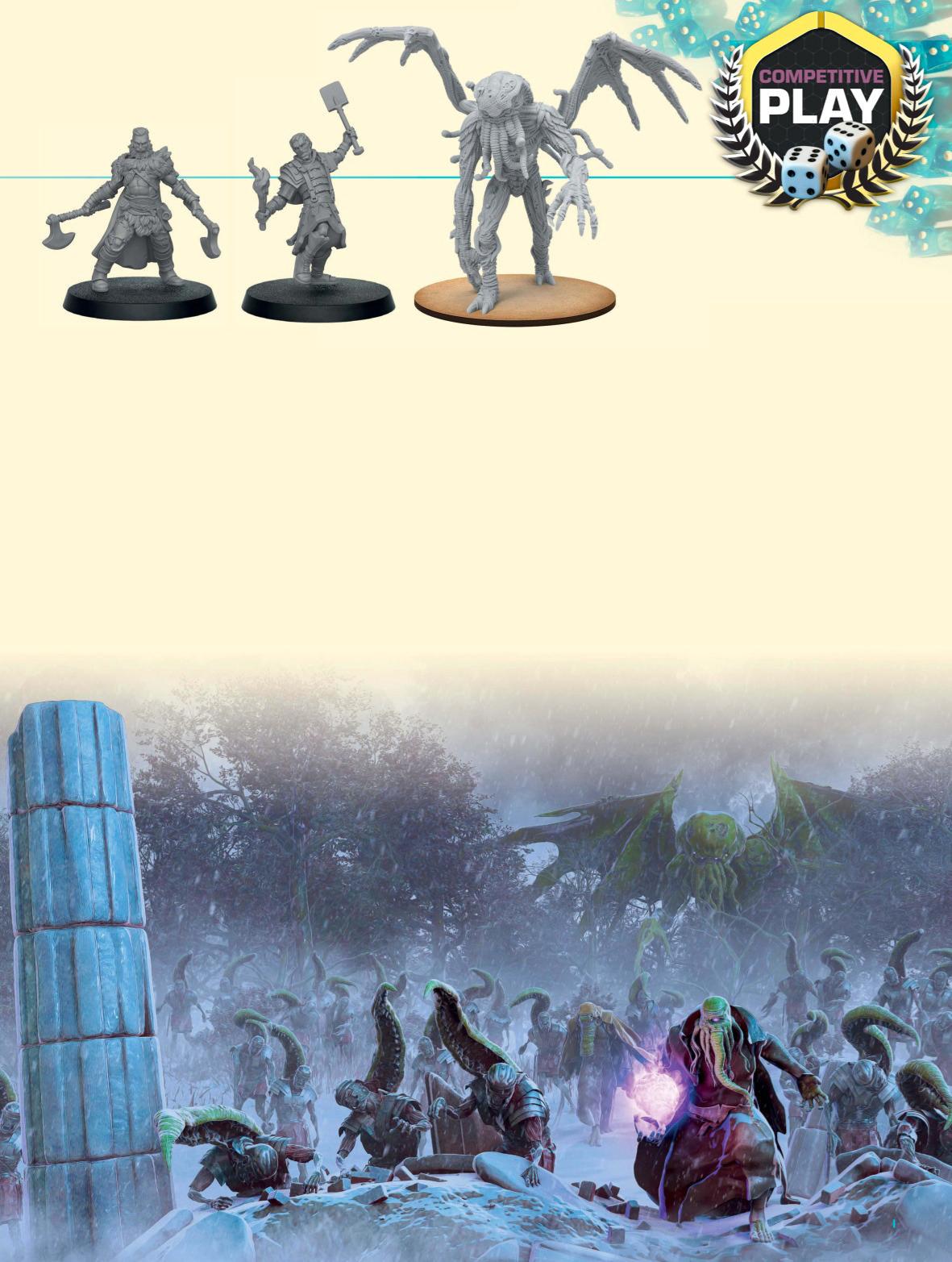
man that if we can rescue, he knows what happened to my father And if I fail that one, the enemy gets more of what we call forbidden knowledge. But that one, if we fail, nothing happens I have to pick one and I have to fail the other I might choose to just go off to find the witch and fail the battle, but that’s fine I just don’t get the objective points, but I carry on to the next mission But my force might be a little bit weaker. The enemy has grown a bit stronger because I failed the mission [and they] gained this information in the background But I found the witch. I discovered that my great ancestor was a great hero of Atlantis And so now I know that I have this hidden power that I can unlock So I always like failing forward and letting people keep going. What happens next? Because again, in real life, you fail battles It doesn’t mean you have to start the war again You just keep playing the war, right? That’s the real life
What I want is the actual story to come out in the game. So I’m discovering a storyline that is a complete surprise, and is really entertaining to find out A story with mechanics, rather than just mechanics. I’m on this journey to hopefully create the game that people will be like, ‘My God, that tells a whole story It’s like watching a movie. I played this story. I feel like I’ve been in a movie with my character on the journey’ . ” *
Last month we caught up with Ellie Dix about designing games, and this month we ’ re finding out more about her design competition win with Hasbro Interview by Charlie Pettit
Last year, Hasbro announced the Hasbro Women Innovators of Play Challenge, described as an open search for the most promising women-led mass market toy or game. The winner would receive $10,000, a trip to Hasbro Headquarters, and a mentorship with a Hasbro Senior Women Leader Competitions like this don’t come along often, so we couldn’t resist finding out more from one of the winners, Ellie Dix
How did you become awar e of Hasbr o ’ s competition?
I was already pitching to Tanya Thompson [Senior Director Inventor Relations and External Innovation at Hasbro Gaming] Tanya is the driving force behind Women Innovators of Play She really wanted to do something more to champion women game designers I found out about the contest directly from Tanya, but there were a lot of people sharing the news online.
What did you have t o do?
Women Inventors of Play is a one-day online conference that Hasbro run They had a number of different seminars and speakers including Elizabeth Hargraves and Cynthia Williams. The conference launched the contest. To enter, you could submit up to two games through their online portal Each submission needed a two minute video, but you could also upload rules, images and sell sheets
What happened when you won?
I was blown away when Tanya phoned me to tell me I’d won As well $10,000, the prize included an all expenses trip to Hasbro Headquarters in Rhode Island, which happened in March It was a whirlwind of a day
What did you get t o do?
Myself and the other two winners - Mandy Goddard and Sandra Harewood - were treated like royalty. There were so many highlights including meeting Chris Cocks, Hasbro CEO; meeting Cynthia Williams, [then] President of Wizards of the Coast and Hasbro Gaming; spending time with the entire Inventor Relations team ; quizzing the whole games team (all women, by the way); visiting the incredible model shop, where so much magic happens ; watching families play from behind the two-way mirror in the Fun Lab; and being let loose in the Hasbro boutique. We also had a look around the galler y, where the ver y first Monopoly board and the first Game of Life board can be found. To top it all, each of us had some mentorship time with a woman leader at Hasbro, in an area of our choosing, which was especially valuable. The opportunity to ask questions to people in many different areas of the business has been incredibly helpful in building up a picture of the company in general and about pitching games in particular
What was your ment oring session about?
I requested a mentor within the marketing department. The marketing team plays such a critical role in deciding whether a game gets licensed or not They are the experts on how to position games to sell well. I wanted to learn more about what they’re looking for What makes it easy for the marketing team to give a game the thumbs up? The session was extremely valuable For a game to get picked up by a mass market publisher, it can’t just be a fun game, it has to have true commercial potential. For a game designer, this is an important reminder

Ellie can’t share much about the game she designed with Hasbro, but Hasbro confirmed they’re investing in what they’ve called “ an incredible game ” of hers, and partnering with her to develop the concept even further Since the inaugural year, the Women Innovators of Play program has been renewed for 2024, with the second challenge beginning on October 10th, 2024 *
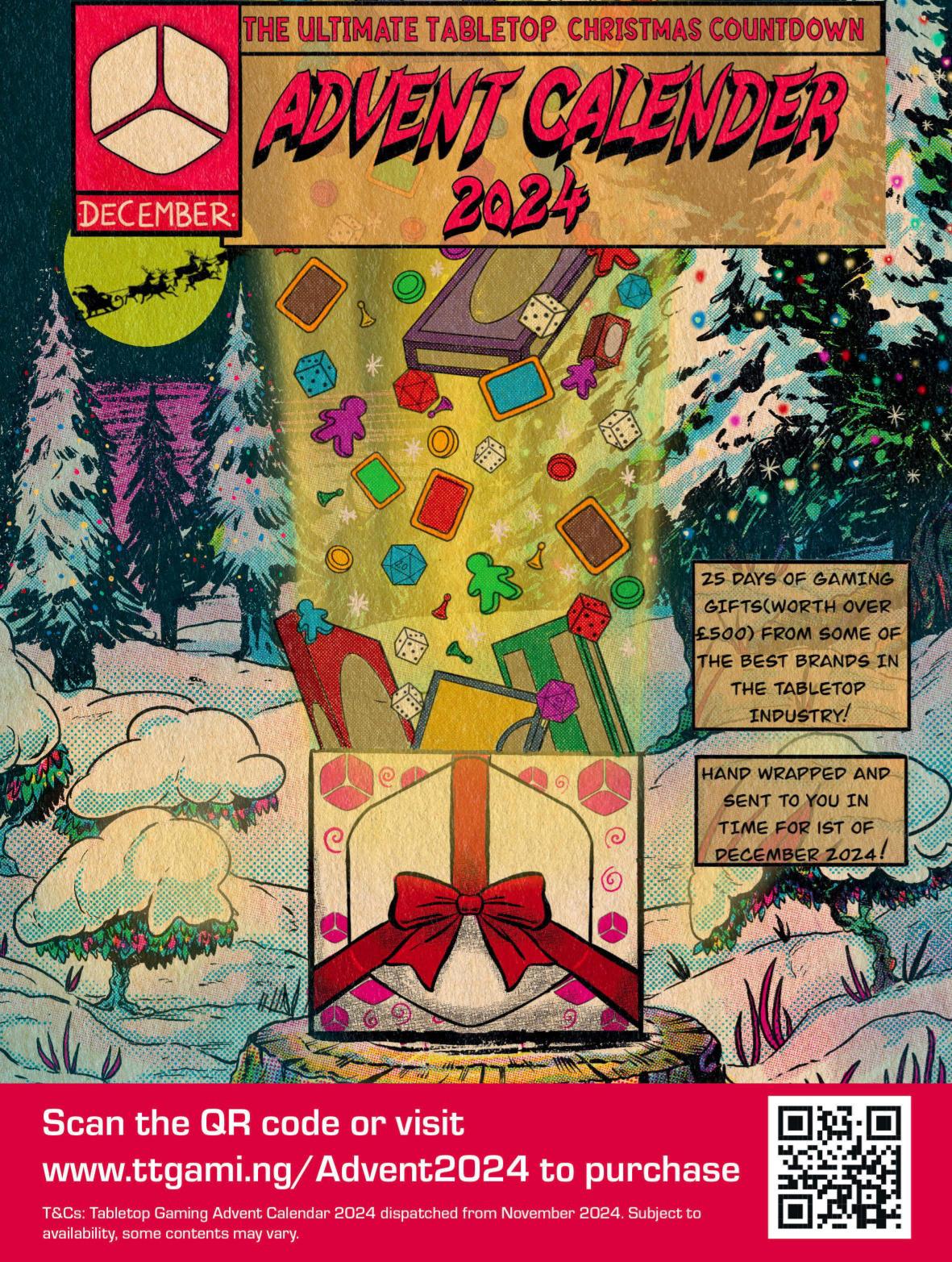
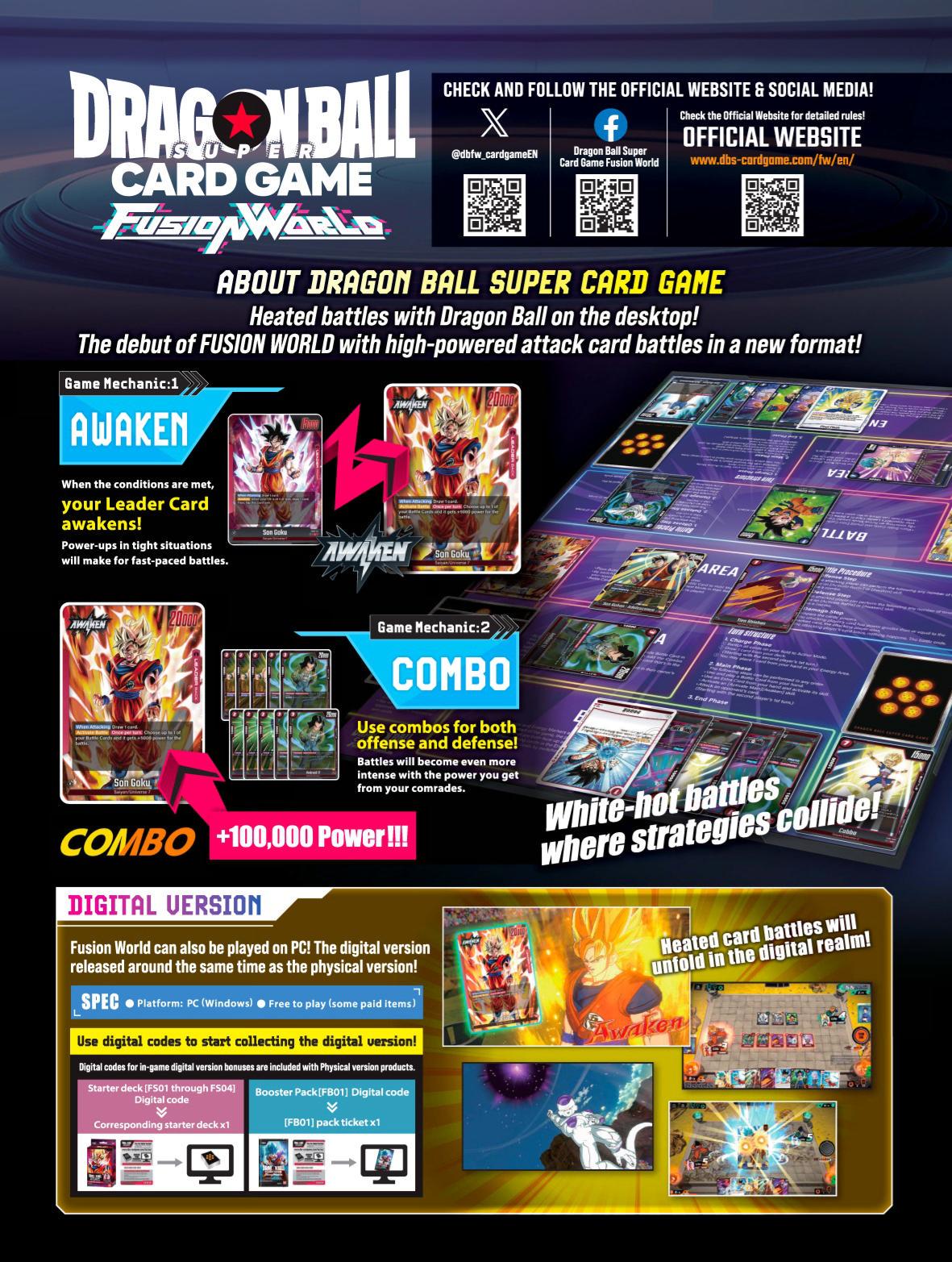
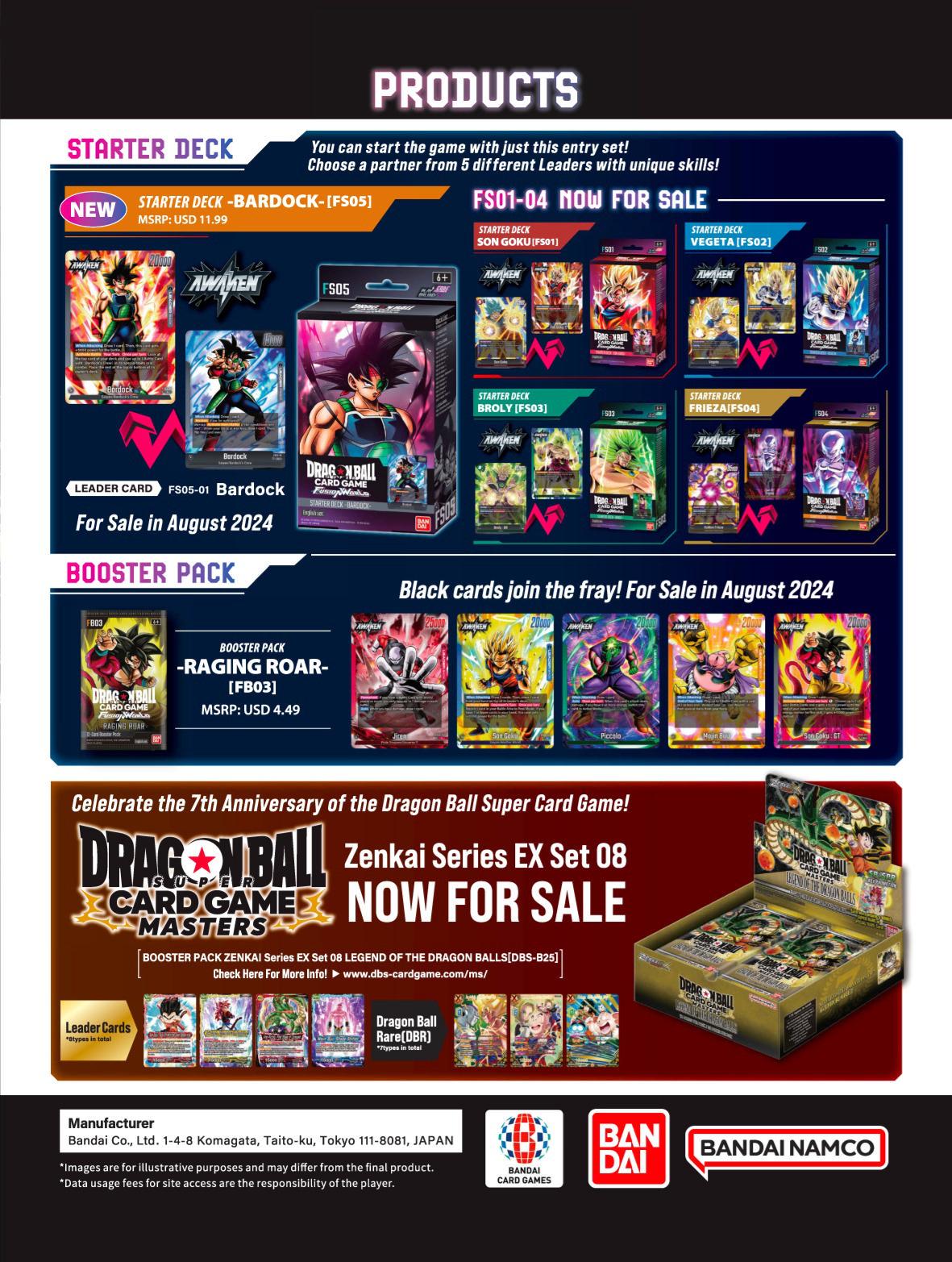
Tournaments involving miniatures almost always require competitors to have fully assembled and crucially, painted their miniatures ahead of participating in a match. We explore that skillset (and offer a few tips) in detail
Whether in one of Games Workshop’s many titles, or among the legion of other miniature tabletop games available, it’s often expected that a basic aesthetic has been applied to the army in use. There are sometimes rules based on what competitors are and aren’t allowed to do with the visuals of their miniatures, so it’s vital to check those guidelines ahead of time
For some, this news will be a massive blow to their confidence. Painting miniatures might not be your strong point and may be your personal barrier to entr y But, we want to provide you with the tools, techniques, and basic approaches to quickly master this aspect of the hobby
When faced with an army of miniatures to paint, perhaps backed up by fantasy creatures, tanks, or ships, it may seem like a challenge in itself to get through such a big workload The success of a painting project will always be defined by the basics ; those foundations that a hobbyist creates for themselves So here are a few things to get in line before even attempting to begin on your next project.
Make sure you have a spacious workspace available It may get messy, but you need an area with a comfortable chair that you don’t mind spending some time in A dr ying space is particularly important, as you won’t be able to throw wet miniatures back into the box when you clean up Focus on the lighting too! How well you can see your miniatures and how they
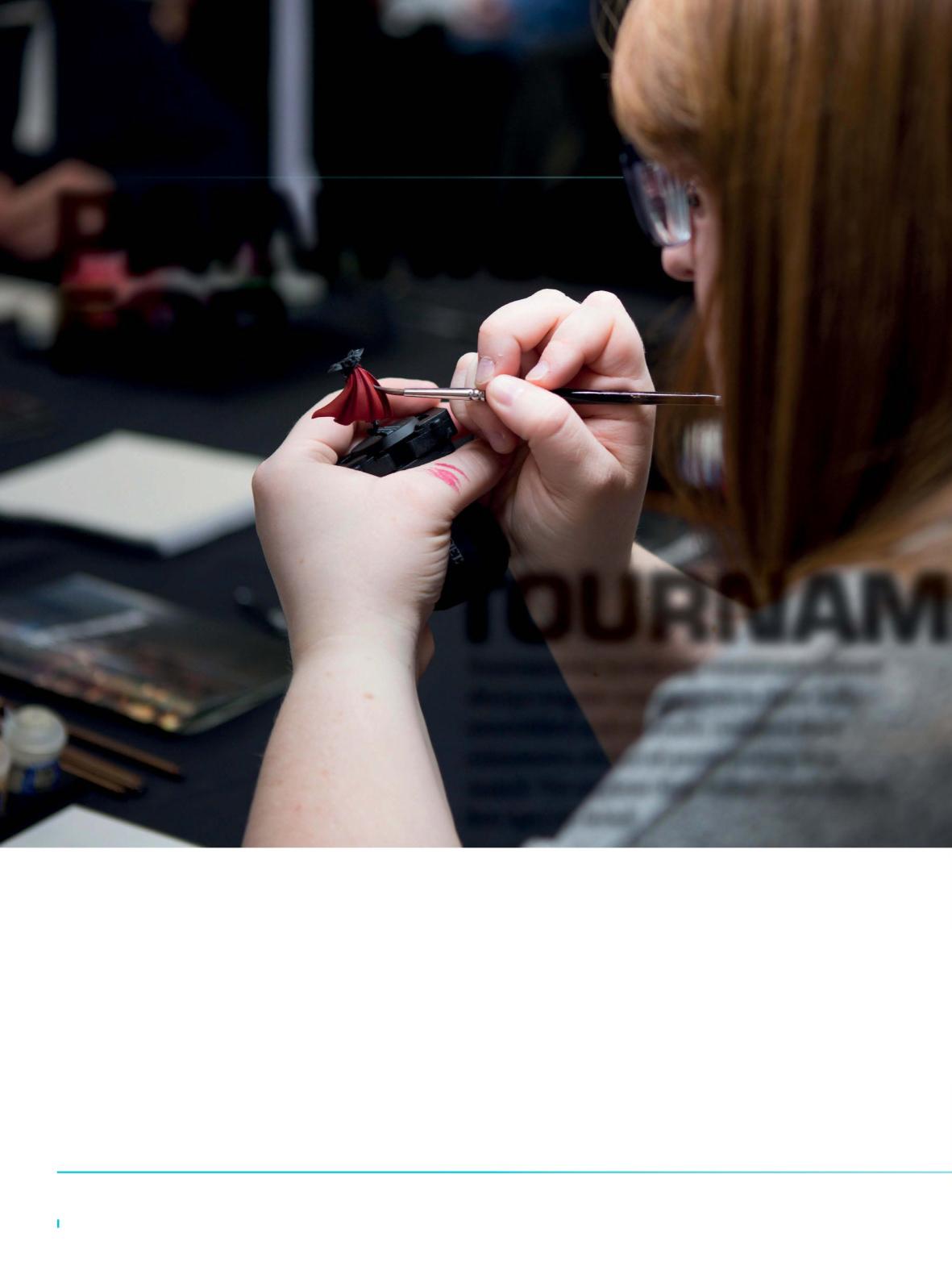
react to the light will make all the difference in creating a realistic, or detailed paint job If you want to paint your miniatures in a more secure setting, grab yourself a clamp or miniature holder, so you don’t mess up the paintwork when you pick it up. Get these fundamentals right and you’ll be starting strong.
One of the most overlooked parts of the painting process is priming the miniatures to get the best final results It’s so common for newcomers to skip this stage altogether and paint directly onto the often-grey plastic of the miniature It’s also a common misconception that primers have to be black ; indeed, both grey and white primers can be particularly useful in certain situations

Not only does the primer provide a base colour to work around, creating those muchneeded shadows or highlights to make the look more realistic, but it also makes the paints adhere to the miniatures If you ’ re going for a grungy aesthetic then grey or black is your best choice, but a lighter, glossier colour scheme would benefit most from a brighter primer
There are so many different paints available on the market, each promoting itself as the must-have product for miniature hobbyists. Those familiar with this area of the tabletop gaming world will perhaps be most comfortable using Citadel Paints, a trusted brand that’s linked to Games Workshop, which is known for its quality and variety
However, Citadel’s products can be pricey, and people within the community have been experimenting with alternatives
For speed, there are quick-win paints The Army Painter provides some great speed paint products that are worth exploring, as does the Two Thin Coats range from Duncan Rhodes Painting Academy with Trans Atlantis Game.
Some tournaments might have set out their rules for the paints that are used, but it’s important to look for alternatives with an eye on the colour palette and paint style Keep in mind what you wish the final look of your miniatures to be, to make more detailed selections about the paints that you purchase Sometimes those bigger sets aren’t as effective as individual buys or smaller packs if you aren’t going to use such a range of options.
It seems obvious to say, but the brush that a hobbyist uses plays a critical part too Most Citadel sets and other miniature beginner kits will include a variety of brushes that can all be used to apply different techniques to your project Those are great starting points, but once again, there are cheaper and more specific products available for miniature painters to tap into
What you wish to achieve should always be on your mind. The finest of paintbrushes is needed for those details, such as eyes and emblems But, wider fan brushes could be just what you need for weathering and dr y brush techniques Filbert brushes provide a good balance for users and can perform on both a macro and micro scale.
Why not think about utilising airbrushes too, to make quick work of those miniatures and create a polished, uniform effect? Var ying in price, airbrushes propel the paint across a miniature, and although it might not provide the detail that you are looking for, it’s a perfect way to add base coats or general colour to a model before going in with a brush for those finer inclusions.
Highlights make all the difference and will take an average miniature and give it that magical quality Highlights add a pop of brighter colour and often draw the eye to points where the light might hit. It adds variation to a paint job and realism, and it’s important to take note of the colour wheel when applying these additions. Usually, a brighter version of the surrounding colours is a great way to produce highlights, but some have experimented with
these techniques to bring in contrasting colours that add small character details A glowing green on a purple background, for instance, produces a rather poisonous combination
To put the finishing touches on your miniature, don’t forget to weather! Adding grit and grime to a miniature will make players feel as if it has experienced the throws of battle Simple weather washes are available, that darken the palette and add nuance. Ensure you ’ re making a terrain-based choice for your miniature If they are intended for snowy combat, for example, don’t add battle damage or weathering influenced by sand or sun Make deliberate choices, that line up with the world-building, whether it’s the impact mark of a bullet or the magical aura of a sword that made contact
The miniature might be painted, but there’s still the baseplate to take into consideration and many tournaments require those bases to also be decorated While you’ll likely be applying some sort of terrain like sand, or soil to match the weathering that you ’ ve utilised, it’s still important to paint the piece to match. Make sure there’s consistenc y between the base and the miniature, perhaps with mud splashing up the boots, or rocks denting the armour Realism is the key here, with earthy tones and metallic textures creating baseplates that feel at home among a fantasy village or a sci-fi militar y camp
There are many more tools and techniques to tap into and hobbyists w ill always be looking to up their skills, especially to prepare for tournament play Although competitions don’t expect players to be exper ts in this field, there are other resources out there to take advantage of, to impress when the time comes YouTube channels like Midwinter Minis and Squidmar Miniatures provide plenty of support and there are many tutorials out there to explore Citadel has its own online guides to help you out, and Games Workshop professionals can even give you help in-store Check out industr y magazines like White Dwarf or our ver y own Tabletop Gaming magazine for further tips and keep an eye on tournaments for inspiration! *
By George Chrysostomou
269
moves wer e made in a cont es t at the Yugoslav ia Chess Tournament , the mos t of any game.
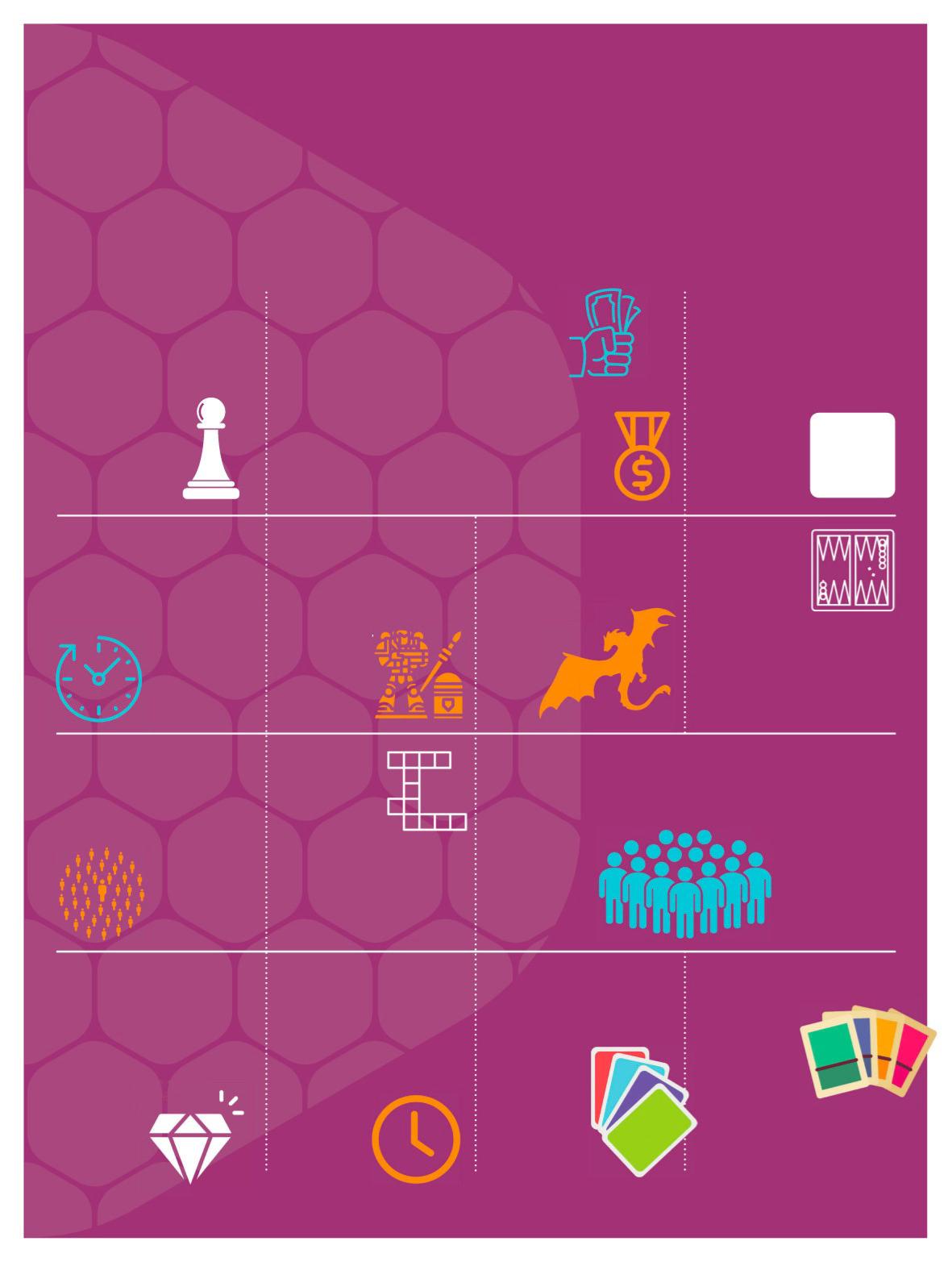
80
hour s marks the longes t marathon playing a competitive boar d game
$1,000,000 is the lar ges t cash price for Magic : The Gathering Tournament player s
£10,193,400 r epr esent s the lar ges t t ot al ever won playing baccarat.
1995
sparked the ver y fir s t int ernational Warhammer 40K t ournament .
1977
was the legendar y s t ar t of the D&D Championship series.
43,157
par ticipant s t ook par t in the lar ges t boar d game t ournament .
530 people t ook par t in the mos t let t er tile games played at the same time, during a Bananagrams cont es t
7,443
player s played in the bigges t TCG t ournament , a Yu- Gi- Oh! cont es t for the ages.
2600 –
2400 BC
is the dat e of the fir s t es timat ed boar d game t ournament featuring Royal Game of Ur
6
hour s is t he aver age gameplay ses sion in a Twilight Imperium t our namen t , f ea t ur ing one o f t he longes t games in t he w or ld.
1146
pair s compe t ed in t he lar ges t c ar d game t our namen t , play ing Mus.
1,790
point s is the highes t scor e of any Scrabble game, but the wor d benzox ycamphor s is s till yet t o be played in any official t ournament
A 1
322 games of backgammon wer e played at the same time in a t ournament , the mos t ever played simult aneously.
7,443 player s also r esult ed in a world r ecor d set for mos t r egis t er ed player s in a TCG t ournament .
£1,699 is t he cos t o f t he mos t ex pensi ve Pokemon Trading Card, made o f gold. I t was banned f r om t our namen t play due t o i t s value!
G
I’ m going to let you in on a secret : you don’t need to buy all the extremely cool games featured in this magazine Sure, they are fun and colour ful and exciting, but you could happily spend the rest of your life getting obsessed by just one beautiful game: G o
Relatively unknow n in the UK , it is w idely popular in East Asia ; know n in China as “Weiqi” , in Japan as “Ig o ” , and Korea as “Baduk” . Whilst Chess has been played competitively in the UK for 170 years, G o has only really featured over the last 50 Unfor tunately, its absence from schools and public life means that most gamers haven’t heard of it - w ith black and white pieces placed on a simple gr id, people in Br itain often ask “Are you playing Reversi?” . What makes it so excellent? There are three aspects to G o that mean I feel it deser ves your love.
The r ules for G o are approx imately three sentences I can probably manage it here; Players play stones of one colour If a stone or connected set of stones is completely sur rounded, they are removed from the board ( black placing at A w ould kill the f our white pieces). A player gets point for any spaces they occupy or have completely sur rounded
That ’ s pretty much it Players can pick up the entire game in literally two minutes and star t playing; w ith a good enough handicap they can even immediately beat a good player
Despite a r ule set that fits on a postcard, G o is one of the most mathematically complicated games ever devised Computer Chess reached matur ity w ith the Deep Blue computer beating Gar r y Kasparov in 1997; but Computer G o didn’t manage to beat a 9-dan
Writ ten by Chris Lowry
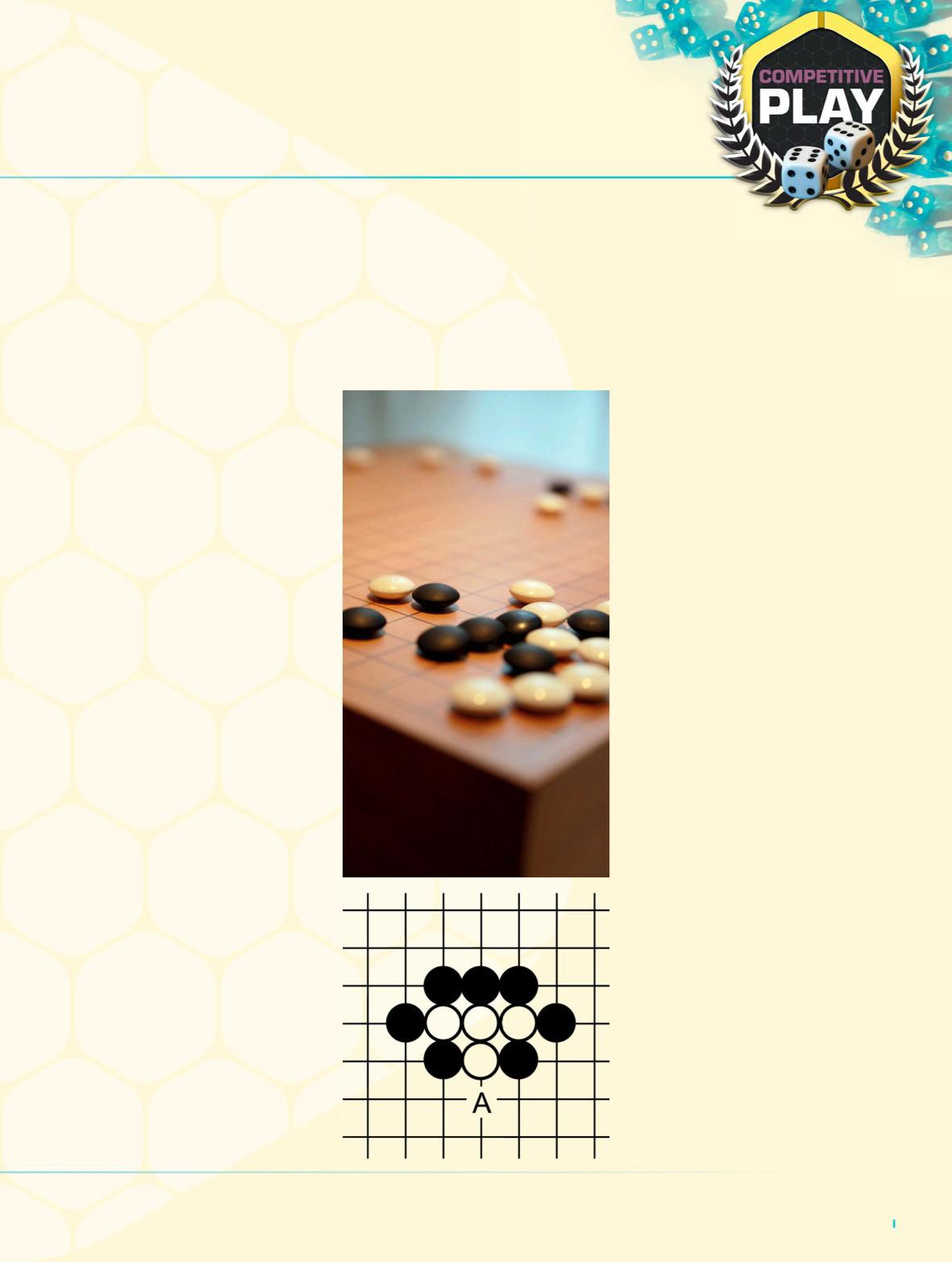
Master until 2016, nearly 20 years later! That doesn’t mean that G o is only fun for exper ts ; it ’ s an unpredictable, agile and fascinating game at ever y level Unlike Chess, it ’ s less reliant on memor ising key set moves and strategies and encourages more reaction and responsive tactics It ’ s so complex that it ’ s impossible to tr uly understand how one stone, placed in one position, on one side of the board, w ill impact on the rest of the game Beginner games are played on 9x9 or 13x13 gr ids, w ith full games at 19x19 - which gives a number of legal board positions in G o that is significantly higher than the number of atoms in the obser vable universe S omehow, instead of that being daunting, it ’ s freeing: you w ill never best G o, you w ill never fully understand it - so don’t tr y to, just enjoy yourself!
Whether at an organised play event, like the open-to-all UK G o Challenge Finals in October, or just w ith your fr iends, G o is a game that you are meant to play repeatedly An old G o adage says “ you should lose your first 100 games as quickly as you can ” ; in other words, you aren’t even really a beginner until you ’ ve lost more times than you can count
O ne of the many mar vellous things about G o is the handicap system ; the weaker player simply gets to place some extra stones before the game begins That might sound ineffective, but in a game where a single stone can decide the result, five extras can be an absolute gamechanger I’ve played my Hong Kong fr iend Pip many times ; his cur rent w in rate is 89%, but w ith just a three stone advantage I can beat him easily
S o, get yourself a G o board, take ten minutes to study the r ules, and star t playing the last game you’ll ever play! *
Writ ten by Becky Campbell-Ladley
You walk into a room
Along the perimeter, there are rows of tables. A few dozen people are gathered around chatting: some in jeans and t-shirts, some in elaborate costumes, some just wearing silly hats
In front of you is a large map on a table, where someone in a brightly coloured top is carefully laying out counters in specific regions. And behind that, there is a stage with more brightly clad folk, some rifling through boxes and pulling out cards, some talking to players and gesticulating wildly.
Above them, a projected screen declares : “Welcome! The game will begin shortly ”
You feel excited. Ner vous. Perhaps a little over whelmed Clutched in your hand is a printout, listing your role for the day and some things you hope to achieve.
You see a couple of your friends, stood with a few strangers Your friends wave you over eagerly, introduce you to the others as the rest of your team for the day. Introductions over, your teammates begin scheming, pointing at the laminated board on your table and explaining things they’ve already figured out. There is a lot to take in, but somehow it makes you even more excited
Just then, one of the bright-shirted people calls for silence over a microphone
Your first megagame is about to begin
Megagames are a form of immersive gaming
They feature both mechanical and roleplaying elements and draw inspiration from gaming genres including board games, roleplay/L ARP and tabletop wargames Players are normally organised into teams, and megagames usually have between 30-80 participants, although the largest games have been run for several hundred
The exact nature of the game is largely driven by its setting, which can be as diverse as aliens arriving on Earth, Renaissance Europe, a pirate ship or a futuristic space fleet. Ahead of the game, you’ll be sent the game materials – a game handbook (or handbooks), and your individual and team briefings. Over the course of the day, you’ll be trying to achieve your team or personal objectives by talking to other players and interacting with mechanics such as a map, trade game or council
The game is supported by a team of facilitators, responsible not only for assisting with mechanics and providing NPC roleplay, but also facilitating “wizard wheezes”: playerdriven schemes that fall outside the game rules
Each megagame is ver y different to the rest For many designers, megagames are labours of love and they will only design a single game, which might be run only once This leads to an incredibly divergent design space.
There are some more prolific designers with multiple games under their belts, and popular

megagames that have been run multiple times by the original designer and even sold as packs so that others can run them
The most well-known megagame is Watch The Skies, a game set on a near-future Earth which is dealing with the arrival of aliens. Most participants play as key government officials for various countries, while some players will be scientists, corporations, the press or even the aliens themselves This game is part of the general genre of modern political-military megagames, and most of the day will be taken up with political manoeuvring to secure advantage and trading pieces on the battle maps
Watch The Skies was launched to international renown thanks to a popular video by Shut Up & Sit Down It has been played on ever y continent except Antarctica and has also spawned spin-offs such as First Contact 2035, which runs regularly in London for around 150 players
Another popular megagame is Den of Wolves, a crisis game inspired by Battlestar Galactica. Players crew the ships of the Sur vivor Fleet, the last dregs of humanity following a brutal war with the “Wolves” . The majority of the day is spent negotiating for the limited resources the ships can produce, deliberating in council on the leadership of the Fleet and fending off Wolf attacks.
Meanwhile, a handful of players have received treacherous Wolf agent briefings, meaning that they are working to sabotage the Fleet’s efforts from the inside
real, fantastical or alternate history. Operational military games draw heavy inspiration from tabletop wargaming, but with a larger focus on hierarchy, strategy and diplomacy Council megagames are light on map mechanics but often feature numerous councils with varying levels of mechanics to manage them
The tone of megagames can also vary greatly: from the deeply serious council game Washington Conference about the Naval conference of 1921, to the light-hearted Trope High, set in an American high school containing witches, time travellers and spies Even within a single genre such as pirates, you’ll find some games focused on seeking out buried treasure and escaping the call of the Siren, while others prioritise Caribbean exploration and dealings with privateers and Navy vessels.
Not in the traditional sense Megagames don’t have final scores or a declared victor, and it’s not uncommon for the game to be ended in
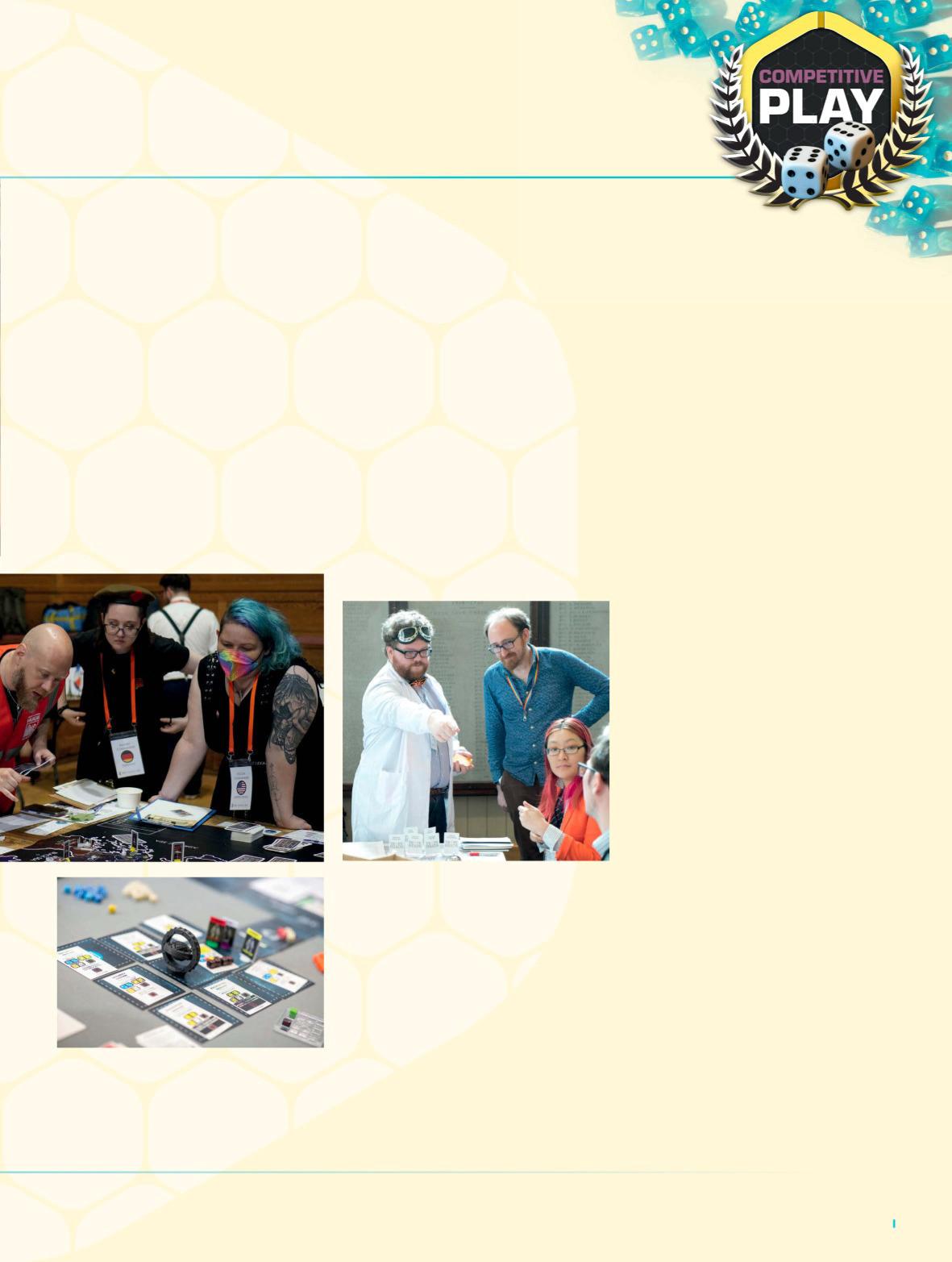
Alongside modern political-military and crisis megagames, there are several other popular genres Historical political-military games are similar to the modern version but set during a
media res, or while the game is still in full flow. Cries of “ one more turn” are often heard!
That doesn’t mean that megagames aren’t competitive, however. Within a megagame, you will be vying with others in many different ways.
For example, players may be competing for control over areas of a city, each of which yields different resources for their team to use. You may be tr ying to gain influence over NPC voters on a council, to help push your own resolutions through. Many megagames will include comparative trackers between teams Depending on the setting, this may be tracking prestige, unrest or religious piety.
At the end of the game, it’s common for players or teams to compare their
performance against the objectives they were given at the start of the day Note that it is possible for multiple teams to complete most or all of their objectives It may also be the case that your objectives have shifted over the day owing to the changing game state.
Don’t worr y about memorising the rules. Especially if your first game is a ver y rulesheavy game or you ’ ve been put into a ver y mechanics-heavy role, you might feel a little intimidated by the rulebook and the amount of things you are expected to remember But there will be other more experienced players and the facilitator team available to help you get up to speed on the day
But do read the handbooks. You’ll pick up the rules better on the day, and you’ll have a better idea of the other options available to you and the decisions you’ll be making.
Bring food, drink, pen and paper. Most megagames run without a formal lunch break, and even if there is one, it’s normally not enough time to go out and grab something Bring enough to keep you stocked up for the day. And having the ability to take notes or write messages to other players can be handy. Turn up on time. The game start time is strict and won’t wait for you to arrive It’s best to arrive 15-30 minutes early, so you have time to meet your team, read any components you ’ re given at game start and listen to the full opening briefing.
Prepare yourself for the intensity. Megagaming is pretty full-on It’s entirely possible that you won’t sit down all day, may forget to eat lunch for a few hours and finish the day feeling exhausted, happy and confused If you need to take some time for yourself during the day, then please do so – and if you miss moving your pieces on the map or a vote in the council, that’s not as important as you making it through the entire day.
The best place to find a megagame taking place near you is to check the Megagame Assembly website which features a calendar of all upcoming games.
Megagames are usually run by community groups covering a geographic area, so it can also be useful to find your local group on Facebook or Discord to find out what they have planned *